#but rewatching it several times for this meta series made me appreciate it as a masterpiece
Explore tagged Tumblr posts
Text
thoughts about only friends
NUMBER ONE THING.
I liked it!
Honestly, looking at the entirety of the series, I think it's a solid 10/10 show and I feel very attached to the characters and their world.
The writing and the OVERALL narrative direction of this series were actually pretty satisfying to me and ultimately I enjoy it as a whole.
However, I do want to talk about the good AND bad
I felt only friends suffered in a couple different ways:
the cutting or sliming of scenes due to audience response or air time problems
bad pacing especially in later episodes
the narrative treatment of some characters (mostly boston but we'll get into that.)
Number 1: Cutting scenes
We know that several scenes were cut out, some due to audience "feedback" after a couple episodes had aired, some due to simple air time cuts.
The biggest reason I (and I think most people) have a problem with this, is that this caused some characters and events to feel like they don't have meaning or motivation. Because we as the audience don't have the full picture that the writers originally intended to give us.
Do I think that this series would have been totally "perfect" or "fixed" if this hadn't happened? No really, it's just one part of the problem.
Number 2: Bad pacing
I already talked a little about this in this post, but let me just restate some things.
I don't really agree with ALL the stuff in that post anymore however the main point still stands. This series would have benefited if the narrative events were more spread out and the characters were given more time on screen to make decisions and choices.
Controversial opinion I think, but I would have actually loved it if it was 14 episodes.
Number 3: How the narrative treats characters
Now, the thing about this. I do UNDERSTAND what the intentions for all the characters were. I see the writers's/directors's intentions and I can appreciate that.
That doesn't mean I'm not going to criticize it though.
How the narrative treated boston in particular makes me just a little pissed off and probably IS the biggest critique I have for this show. Other people have talked about this numerous times but this last episode only proves that the narrative wants boston to be unredeemable, not necessarily a "villain" but as someone who doesn't deserve or need to be given an apology even though he's been treated badly by his friends just as he treated them.
Ok, you can look at this in the meta way of "Well all these characters are supposed to be bad people and it's an example of what NOT to do" I agree with this for the most part, but with this last episode and how botson's role in the story concluded, I don't really think that was the intention.
(A quick side note, I was initially upset at how bostonnick ended but I actually think it's ultimately for the best and something the writers did right. See, I would much rather them not end up together than push the narrative of boston has to change for nick, which is what I feared would happen.)
So. All these things combined made this wonderful series not able to reach its greatest potential. And I think that's why most people are critical about it. It didn't feel like what it could have been.
This series claimed to be "different" and it would change the BL world. And, in my opinion, it did! But it feels like a letdown in a lot of ways because it still fell victim to tropes and narratives that are perpetuated in this industry while also adding in unique problems that come with creating a series of this nature.
But anyway, loved it, 100%. Would rewatch it a million times. Definitely recommend!
#i have more things to say btw#mostly about sandray#and i wanna talk about topmew a bit as well#just keep an eye out for those in the coming days ig lolol#ofts#only friends the series#only friends series#only friends#only friends meta#only friends spoilers#only friends ep 12#topmew#sandray#bostonnick#ray only friends#sand only friends#top only friends#mew only friends#boston only friends#nick only friends#boeing only friends#thai series#thai bl
11 notes
·
View notes
Text
I played kingdom hearts union x early in its release days like 2016 and i tried really hard to stay up with it but im just not built for the mobile gaming meta which is geared for daily/weekly engagement over the course of years. i've had this problem with every mobile game i've ever tried to get into, i've tried like 10+ and genuinely wanted to get into these games but i just can't. Anyways eventually I couldn't keep up with ux's powercreep and pay to win gacha, and more importantly its rate of story development. UX is like 98% filler content 2% series breaking story revelations and that actual story only dropped like once a year so I'd play for a year to keep my medals semi competitive because story is also gated behind medal strength all to get a 10 second cut-scene that left 50 million questions and eventually i just could justifying playing ux as being worth it. so i quit a few years later and havent touched the game since and now im rewatching the cutscenes and yeah when ux is good its good and that good part is just inundated with filler. I'm rather fond of the artstyle its like little paper dolls and the devs manage to put so much emotion and nuance with those simple animations its one of the several impressive parts of ux.
a list of revelations. the disney worlds the player visits are fictional, projections made from the book of prophecy to collect lux. each union member has a chirithy, chirithys are dreameaters and thus daybreak town is in the realm of slumber, chirithys are tied to their union member. one fades away when their union member is lost to darkness, i assume ephemer's turns a darker shade of gray. quests 362-275 the plot really begins.
quest 401 the first dandelion metaphor. in a fashback to the day the player meets ephemer, ava compares ephemer and other union members to dandelions, wishing to entrust the future to them somewhere far far away. oh this is the beginning of unchained x. wait this is showing an alternate timeline in which ephemer didn't go missing. ah that was a dream
wait. you're telling me the japan exclusive kingdom hearts x doesn't have the same plot as ux. ux isn't a remake of x its a sequel and we're in a timeloop or memory or datascape or something??????? NOMURA! NO! Bad game dev! Bad! STOP PUTTING CRITICAL PLOT INFORMATION IN JAPAN EXCLUSIVE MOBILE GAMES THIS IS LIKE THE 4TH TIME!!!!! uuuuuuuuuuuuuu time to figure out what khx was about.
uuuuuggaisdadf;o;jkal/k so it so yeah ux reuses x content under the premises that player character is reliving their memories but then continues the story. it seems like i played through most if not all of the x content. i got pretty far huh like through the 700s quests. I wonder why they changed the gacha from cards to medals? cards feels more appropriate since its already a recurring motif for kh like chain or memories or luxord.
quest 425: the ava battle. i remember being stuck here for like a month because my medals were too weak and so i had to grind and gacha until they were strong enough bleh. ephemer sent the dream of exploring the tower with the player. ephemer is in a unchained state in another realm. dont know what that means. and if he can send dreams ava says he's close to "that realm". huh
quest 525. got stuck on this one too.
quest 540: i vaguely remember the enemies here were green. i do appreciate how khux is the story of things going from ok to bad to worse. the enemies here look like heartless but they can talk and are seeking lux. also second time player character talks. purple chirithy! i remember you. is the implication here that purple chirithy used to be the dark gray chirithy we saw earlier? ah so those heartless were former union members filled with darkness. i vaguely remember this and that dark chirithy is a nightmare. purple/dark chirity's wielder is close wonder what that means.
quest 555: they speak again! confirming that ephemer is their friend. the player character petting chirithy was a nice touch. union leader implies they killed ephemer eventhough earlier ava said ephemer was in another realm. i joined unicornis btw.
The Player: "And then I met Ephemer. We didn't know each other for very long, but he left a lasting impression. Not all of our memories are good ones; in fact, he even broke one of our promises. No matter what happened, I knew we were still friends. But you took him away from me."
The Player: "I feel sad, I feel angry, I feel hurt. Maybe that means I have darkness in my heart; I don't care."
The Player: "But I can't let you get away with what you did to my friend. Even if I have to fight you, even if I don't stand a chance, even if I may disappear... I will because I know in my heart that Ephemer would do the same if he were here."
The Player: "Master Ira, I mean no disrespect, but this is something I must do."
Ava's dandelions, a hope for the future cast to the wind. seeds to begin anew. yeah this part where the player character chooses to stay stuck out to me when I was playing. first, quest 555 is where the player characters shows real independence and agency from the player, they have their own thoughts and feelings about ephemer and the end of the world. second, that their greatest concern was not with the destruction of the world, the war, or the legacy of keyblade wielder but of the unchosen left to fight and die, and that the player character chooses not to be one of the special.

the recent kh games have really gone far with the fictionality of the narrative. very post modern meta texual like sora "dying"? and existing the fictional world for the non fictional one. "world outside" here is again vague. if daybreak down is indeed a dream realm then why would ava specify that the dandelions are going to train in worlds made of dreams. but if this is a dream then the dandelions are going to the universe of the main series? i mean thats where luxu/braig ended up with the box. i definitely need to read a plot summary when all this is over.
0 notes
Text
Chapter 7: There’s Something About Mary (TST 2/2)
A very funny film – with a very apt title for this chapter!! If you haven’t read the first half of the TST meta, check the previous chapter – we’re jumping straight back in.

Jack Sandiford’s home in Reading could not be talking more about water – Arwel has really excelled himself here. Not only do we have a swimming pool and a Hokusai, but look at the ceiling – I have never seen a ceiling reflect water quite like that. I don’t know if it’s a mirror (!) or another visual effect, but it serves to remind us of where we are – the water is not just below us, but all around. It’s not a case of taking the plunge – we are still drowning.
A moment of appreciation for Sacha Dhawan, whose time on Sherlock was far too short – at least he got Doctor Who. Regardless, his first scene is back to parody here. Sherlock’s quip about the polling station is the sort of quip you only see on television, and the fighting that follows is clearly stage fighting. We get Bond-esque drama as they jump into the pool and smash the glass (note the same motif from the Thatcher smashing earlier), but even before that, banging each others’ heads off the surfaces without a scratch is obvious stage fighting and a well known move. It feels more like theatre than TV, and for me it doesn’t work on film. Perhaps I’m being harsh here, but I feel again that we’re moving into a parody of Sherlock Holmes the superhero. We also get several shots during the fight scene where water seems to obscure the lens with its weird refraction of light; I love this, because it’s a jarring reminder that the camera exists, and with that a reminder that this is artificial. It jolts us out of the scene and speaks to its unreality.
Sherlock announces that he has found the black pearl of the Borgias, but of course he hasn’t – it’s the AGRA memory stick. Importantly, the original story ends with the black pearl, so we’re tying back in to the expectation that has been latently set by Craig; here, the show is diverging from canon, and Sherlock doesn’t know what to do about it – his declaration that it’s not possible is literal. This scene gives a perfect parallel to the one in TAB where he attempts to unmask Lady Carmichael only to find Moriarty – he was missing the obvious. Here, we’ve seen already in this episode the serious miscalculation he has made about Moriarty in his brain; he is still treating the Moriarty threat as one of a supervillain. Stealing jewels is something we associate with Moriarty from TRF, but that moment is high camp – it’s the end of the episode between John and Sherlock which is the emotional crux. If we’re focusing on what Jim means in himself, we’re missing the point – and it’s exactly the same here. Sherlock needs to reconceptualise Jim as his fear of losing John, and this is the moment when his brain connects this properly to Mary. Bear in mind that everything that happens after Sherlock is shot in HLV takes place within the EMP, so we know nothing about Mary in reality. The AGRA memory stick doesn’t represent who Mary genuinely is – it represents the great unknown of Mary, the question mark over her head. Never forget, after all, that the original AGRA box from the stories was empty. It’s the same here – our divergence into Mary’s past is untrue. When Sherlock realises that Moriarty is somehow to do with the memory stick, he is realising that his fear of John dying is tied into his confrontation with Mary back in 2014 (!). This moment of realisation drives the rest of the episode to Mary’s death scene, where Sherlock relives his own attempted assassination by Mary (as we’ll see) – this is what he has to figure out. If we need more impetus to realise that what happens in HLV post shooting is wrong, look at Sherlock’s flashback to John and Mary’s reunion in HLV – if we take this show at face value, that simply can’t be right, because Sherlock wasn’t there. The only way to read this is if such a scene took place in Sherlock’s own brain – a kind of fill in the blanks as he tried to excuse Mary, only now realising that she is, in fact, the most serious threat of all.
A dreamscape coincidence takes place behind Ajay in this scene – before we know that he is Ajay, and the A in AGRA, we see the A behind him on the shelf, as though calling it out to us. This world is too interconnected to be real; its whole fabric seems to self-reference.
In case we wanted any more flashing blue light, we see the police sirens flashing in – now as far as I know, police sirens are normally blue and red, but not here. I wonder why. They will be the same, somewhat worryingly, at the end of TFP. Look at how it lights up one half of Sherlock’s face, just like the water did before. Rachel Talalay is really fantastic.
The next thing we get is a flashback to Tbilisi, and the ambassador asking ‘who’s they? Seems we put an awful lot of faith in they’. It’s difficult not to read this as a reflection on tjlc and how most of us have been feeling for years now, whether or not this is intentional! She also says that she’s got something ‘they’ would love, if we ever get out of here: ammo. For ammo, we should pretty much always read ‘amo’, the Latin for I love – this will be very important later, but for now there’s a nice little metaphorical resonance here – if we ever get out of where we’re trapped (Tbilisi, or the dreamscape), the great ‘they’ want amo. Maybe.
We cut out of this flashback into Sherlock standing and thinking to himself. Normally, in the show, that means that what we’ve been seeing is a mind palace construction or a flashback. When the AGRA scene showed, I expected us to cut to Mary explaining it to Sherlock and/or John, because that would explain its flashback nature. But again, it’s Sherlock thinking, which like our previous memories of Mary suggest that none of it is real – it’s a stop gap as he tries to work her out. It could be argued that Sherlock got this info from his glance at the memory stick, but I don’t buy that – the memory stick contains material from before their betrayal, not after.
Ajay’s torture is another way of teasing Amo and the English woman, which will come to fruition later in the episode, so we’ll move through to Sherlock’s meeting with Mary. Mary, at this point, is still just Mary, no mirrors, no nothing, as Sherlock tries to work her out. Notice how he acknowledges that he had been too caught up in Moriarty and the pearl. I also think it’s relevant that the building in which Mary chloroforms (camphors?) Sherlock is a church – this is a subconscious reference to the Sherlock-is-murdered metaphor in TSoT (X). As we’ll later discover in a big way, the one thing that is stopping Sherlock from getting a handle on Mary and the threat she represents is that he can’t acknowledge his love for John as playing a part in this – he can’t understand why love is such an enormous threat. He will get there (at least partially) at the end of TST, but not until then. Just like the Sherlock-is-murdered metaphor in TSoT represents his realisation that he is in love with John, Mary’s attack on him here in a church stops him from getting to the bottom of what is going on with Mary.
The obsession with the memory stick here is important because the memory stick represents the unknown about Mary that Sherlock is trying – and failing – to get to grips with. However, he’s still going about it the wrong way, and we know that from one line of Mary’s: ‘Sherlock the dragon slayer’. We’ve had these references to Sherlock’s ridiculous hero complex before, but this one stands out, because it feels like a throwback – and it is! But, it’s a throwback to:

Mycroft. If we wanted to, we could jump back to Sir Boastalot as well, but the original ‘dragon slayer’ quote happens when Mary is nowhere around. There isn’t a way to make this callback work without either saying it’s a ‘coincidence’ (really?) or postulating some sort of dreamscape. Here, the dreamscape works perfectly, because it’s the hero image that Sherlock is working to break in this episode, and these iterations come first from his brain (Mycroft) and secondly from hypothesis Mary – even as he’s trying to crack her in various versions in his mind, his subconscious is warning him that he’s wrong. We moved from supervillain Mary to Mary-who-needs-protecting; neither of these are particularly relevant.
Sherlock’s subconscious even trying to break through Mary is important as she refers to the ghosts of her past – this is a phrase which keeps cropping up from TAB all the way through series 4, but it’s normally used in reference to Sherlock himself. She’s again voicing a motif from the programme that as Mary she can’t possibly know about, but as Sherlock’s subconscious is trying to push Sherlock back on the right track.
Mary drugs Sherlock, and in case we needed another reminder of what that represents and what is stopping Sherlock from progressing, we get a shot of Redbeard and we hear Eurus singing the riddle. See chapter 13 (X) which explains why this is symbolic of gay trauma and needing to fully come to terms with your queerness. When Sherlock wakes up, the transition sound from Redbeard back into grown up Sherlock is a gigantic wave followed by rain. Although Sherlock and Victor have been playing by the water, that wave is far too big to come from that image. When we move outside, there is a dripping sound, and our entire visual is coloured in the dark blue of the promo pictures and that really characterises the underwater aesthetic of s4. This scene has shown us a series of blockages to Sherlock solving his current conundrum, and the wave washing over him is the sound of him being pushed deeper into his mind, not climbing out. We’re a long way from a pirate sailing the seven seas here.

The next transition is fantastic. We see two reflections of Mycroft listing off another meaning of Agra (an Indian city) whilst seemingly looking at each other. The reflections are distorted to be thinner than normal, again pointing to the dreamscape we’re used to by now, but also telling us that Mycroft’s voice is Sherlock’s brain here, reflecting – this is the equivalent of going into his mind palace to work something out, drawing on memories and existing knowledge. However, remember that in real life the memory stick does not exist. So why is Sherlock so keen on deciphering AGRA? Well, the treasure of Agra features in The Sign of the Four, in which Holmes is trying to regain the treasures for Mary but does not (as mentioned before, the Agra box is empty) – but the actual important development is that Watson and Mary become engaged. Agra here is not about the memory stick, much like ammo isn’t about ammunition; it’s a tool for Sherlock to engage with Mary’s past. However, Mycroft referencing the original Agra here suggests that Sherlock is trying to grapple with Mary’s potentially criminal past, and also that he can’t get past who she was supposed to be, as we’ve already seen from HLV (she wasn’t supposed to be like that!). However, it’s also a sign that he’s missing the most important part of The Sign of the Four, which is all the more notable for its importance because the wedding episode is named for it; John’s relationship with Mary is the real occurrence in that story.
Others have pointed out that Gatiss wielding a pen in this scene means that he is speaking at least partially as Mofftiss, not just as brain!Mycroft – hence we have wonderful lines such as mentioning that all the best secret societies have acronyms (cough tjlc cough) and that he hates loose ends. A little reassurance there.
Other moments in this scene are lovely – Sherlock is continually distorted by a mirror on the wall, reminding us that this is him trying to process the hypotheses he is running about Mary in his brain. This brain, as previously mentioned, is under siege, and it’s important then that Mycroft and Sherlock both acknowledge that Sherlock and sentiment are becoming one and the same; TFP is going to be about the brain and the heart learning to work together, rather than against one another, but Mycroft’s disparagement and the underground dungeon he’s living in show that we’re not there just yet.
I confess that Mary’s travel montage bores me somewhat, although I’m tempted someday to go through all the graffiti and montages with a fine tooth comb to see if anything can be come up with. I am, however, running out of time to write this before term starts for me! Let’s jump onto the idea that not even Sherlock Holmes can anticipate the roll of the dice. The theme of Sherlock being able to predict the future comes up a few times in this episode, and I’ve mentioned before how this is a set up for us to doubt the premise of TLD, that he suddenly has quasi-magic predictive powers. Here, he seems to, and then it is immediately undercut, because he says that he placed a tracker inside the memory stick. All very funny – except it doesn’t make sense. I confess I didn’t notice this, but my mum did straight away – if you have a tracker, you can follow someone, but you can’t arrive somewhere before them. It’s not possible. This is an aspect of Sherlock’s predictive power that doesn’t make sense – and we might be able to just about buy it on his ‘mathematical probability’ shtick, except he’s just told us that that’s a load of rubbish. This leaves us in a situation that is impossible – and isn’t too much of a problem, because it’s just a device, but is a huge setup for the impossibility of the next episode. It also speaks to a dreamscape again, because where else are you exactly where you need to be when you need to be there, with no explanation?
The jibe about happy families is a little laboured, but it sets up the idea that Sherlock is starting to work in terms of relationships now rather than seeing things in terms of chess. Think of the chessboard squares in Mycroft’s office – but his deduction partner has now switched to John, who represents his heart, and so he’s starting to get on the right track. Note as well how we’re meant to assume they are playing chess or some equivalently cerebral game before we discover that they’re playing Happy Families; this is the same as the chess/Operation scene in TEH, in which we see the difficulty that the Holmes boys have in accessing their hearts. Now that Sherlock is using heart!John instead of brain!Mycroft, he’s almost there, but still not quite winning due to his unfamiliarity with the situation. Note also yet another distorting mirror in the background of this scene.
The fact that Mary’s real name is not Mary is used to great effect here – it could have just been throwaway, but instead in this scene they actually conceptualise Mary and Rosamund as different people. I read this scene as ‘Mary’ being the name for Watson’s canon wife, and Rosamund being our current Mary – so heart!John saying that he liked Mary is his inability to break with established canon. Simultaneously, however, he says “I used to” – he’s caught in a bind, because that canon breakage is already happening.
This room is lit warmly, quite the opposite to the dark watery colours that we see inside most of this episode – most of the waters take place in Sherlock’s brain, and are epitomised by Mycroft’s office, whereas this scene is warm, the colours one might expect of hearth and home, as heart!John takes precedence for the first time. However, notice the grating and the pattern of light that spreads itself softly over the characters’ clothing – it’s much less obvious than in Mycroft’s office, but it’s still the same chequered pattern. As we move in to TFP and John and Mycroft are tied together, rather than moving apart, we’re going to see that increasingly they are two sides of the same coin, heart and brain. You’ll notice, though, that Mycroft’s grating pattern is more like a chessboard – it’s binary and simplistic, black squares and empty space for white light. The patterns of light in this scene, particularly as we move into the Ajay confrontation, become more complicated – the light is let through in swirls as well as grates, as though heart!John is allowing for much more complexity than brain!Mycroft – which seems to be right, given how much more difficult Sherlock finds Happy Families than chess.
[more tenuous crack: Ajay’s torture has always reminded him of Sherlock’s torture, but he’s sustained every day by this bit of information. Ammo, ammo. Amo, amo. Love? I can dream.]
The following scene is an intercut phone conversation between Sherlock, still in Marrakech, and Mycroft in his office – moving back and forth between the two highlights the difference in colour scheme as well as in the angle of grating, which is similar but almost inverted. However, it’s Sherlock talking to brain!Mycroft rather than heart!John – it’s not a row between the two parts of the psyche, but showing that Sherlock has firmly moved over to the other. That won’t be the answer – they will need to integrate for the end of s4– but this is the way towards working out Mary. The split screen effect is helpful here for us to understand both sides not as different, but taking up the same space. This is heightened when Sherlock and Mycroft both walk off, their silhouettes merging into one – they are one and the same. It’s also important that it is from this space that Sherlock makes the ‘amo’ deduction – he could have done so from anywhere in London, but he doesn’t – he needs to be in a heart space.
We now discover what heart!John meant by “so many lies […] I don’t just mean you” earlier – his not-tryst with Eurus. Again, this is discussed in greater detail in an earlier chapter (X), but let’s remember the initial mention of it. It was heart!John who spoke those words, not real!John – because we never get real!John in this series, except through Sherlock’s memory – and so his interrogation of Sherlock’s hypothesis of Mary is where he starts to realise that the problem is one of happy families rather than chess, and that it’s a lot more emotionally complicated than the supervillain arc gives credit for. It’s important that we’re told this story in reverse, because Sherlock is slowly picking up the clues for it but only putting it together late. We’ve seen all the signs that John might be unhappy but haven’t elaborated on them – now Sherlock’s mind is noticing that the Mary problem is something to do with John’s emotions. He can’t work out what, so he hypothesises – this meta chapter (X) goes into much greater detail about how his queer trauma (Eurus) is prodding at his hypothesis of John here, forcing Sherlock to masquerade as a woman in the form of trauma!Eurus because trauma!Eurus will not let him truly accept queer desire and the possibility of reciprocity. It is why we get a story which rings so false about John here. However, I’m running the risk of repeating said chapter, so we’ll move ahead.
We move into brain!Mycroft’s interrogation of Lady Smallwood. The setting is once again focusing on reflection – the mirror behind Lady Smallwood reflects Mycroft, and of course there is the larger mirror structure of an interrogation room, where a mirror from the inside allows Sherlock to watch what’s going on – an obvious metaphor. Lady Smallwood’s opening lines, that Mycroft can’t accuse her again, are really important – in HLV, right before he went down, Sherlock thought that Mary was Lady Smallwood. He’s playing through this mistake – why did he make it? What stopped him from seeing the obvious about Mary, just as he is missing the obvious about Norbury? Both, after all, have been ‘hiding in plain sight’.
Amo. Love, Smallwood’s code name, stopped him from realising it was Norbury, and by extension it’s what stopped him from realising Mary’s true self earlier – love was clouding his judgement. There is more, however. The fact that ‘ammo’ and ‘amo’ are so similar is brilliant, because they mean total opposites – ammo is to do with war, and amo is love. When it comes to the problem of being shot, of knowing that John is in danger but not quite understanding how, Sherlock has been focusing on the threat from ‘ammo’ for too long, hypothesising Mary as some kind of super dangerous villain. This isn’t what’s endangering John. What’s endangering John is ‘amo’ – without Sherlock, John is suicidal, and so it is love that is the ultimate danger. The mistake that Ajay made (ammo) is the same mistake that Sherlock has been making in hypothesising about Mary throughout the episode. Another point worth noting is that gay slang – the early 20th century equivalent for ‘is he a friend of Dorothy?’ is ‘does he know his Latin?’* That’s definitely the sort of thing Mark Gatiss would know and throw in.
[*I found this on tumblr! And can’t refind it! Which makes me question its veracity – although it seems a really odd thing to make up. If anyone can source this for me, would love them forever – I have trawled my files and I foolishly didn’t save it!]
We should also note that amo is a verb – amor is the Latin word for love. ‘Amo’ actually means ‘I love’ – we know that Sherlock knows this, because he conjugates the verb earlier in the episode: amo, amas, amat. My understanding is that it is the first verb anyone learns to conjugate in Latin classes, and that therefore Mofftiss hoped their audience might have some familiarity (rather than picking a much less taught language). ‘I love’ is not the same as ‘love’ – it is an action, and that’s something that Sherlock hasn’t quite cottoned on to. He keeps saying ‘love’ but refuses to grasp that he has to be involved in this verb – as we’ll see.
Mary’s death scene is where all of this – finally! – comes to fruition. Note the blue lighting over the London Aquarium, even the London Eye, to match the underwater aesthetic, before we move into the aquarium. Admittedly, both do that anyway, but it’s a nice look – they didn’t just pick the middle of the day for it.
The message that Sherlock texts Mary, “The stage is set. The curtain rises.” has been seen before – it’s what he says in TAB before running an entire Victorian fever dream of a simulation (X). It’s one of the many repeats of lines from earlier in the Mind Palace, but it suggests that after his almost complete revelation about love, the final simulation is at last ready to run. The comparison to TAB is important, because TAB is a rerunning of Moriarty’s death with different players so that he can understand it. We’ve got the same thing happening here – he’s rereunning his own assassination attempt so that he can finally understand what is going on. This is why TAB is so important – we thought it stood by itself, but it’s actually the key to unlock most of s4! More repeats happen as Sherlock meets Norbury – ‘the final act’ is a repeat, as is ‘I never could resist a touch of the dramatic’, which is mentioned in TAB as well as in ACD canon. Sherlock thinks he’s cracked it, but he’s still quoting previous iterations of himself, which is a sure sign that he’s not being true to Sherlock, only to Holmes, and that something is going to go wrong.
[A side note: can anybody identify/has anybody identified Norbury’s brooch? It looks incredibly significant, a face on it, but I have no idea who – the only person who pops into my head is the queen, and that throws up a lot of ramifications!]
Others have explained why Norbury is a mirror for Mary – if we hadn’t already spotted the Lady Smallwood connection, there’s the fact that they are both receptionists, that they use the exact same gun and of course that they both attempt to kill Sherlock to protect themselves. When we read this scene, we should be reading it in the same way it has become completely mainstream to read Ricoletti as Moriarty; Norbury is Mary. She thought she could outrun the inevitable, but somebody has information on her. What happened with AGRA isn’t actually relevant here, because that was all hypothesis – Magnussen has something, and that’s all that matters. Norbury’s wish to get out of criminal mess in favour of domesticity matches Mary’s, seemingly – and in case we didn’t get this parallel, Norbury draws it herself, asking Mary if they don’t just want the same thing.
Sherlock’s deduction about Norbury here, however, can’t straightforwardly apply to Mary – remember, he knows nothing about Mary’s prior life. This, again, is where TAB comes in – this moment is beautifully metatextual. TAB has set up the train of thought about people who were forgotten by history, and put in women as a mirror for queer people – but in this sense, Mary’s canon divergence is important, because the Mary of the original stories was never allowed to be interesting. Sherlock’s biting comments about Norbury’s ‘little life’ are vicious and completely out of character – think of the interest with which he treats Jeff Hope in ASiP, even a slight sympathy, for another ‘proper genius’ who’s been ignored. Sherlock’s bitterness here is personal. He’s talking about the exclusion of the real Mary from the stories that we saw partially rectified in TAB, whereas in the stories she had a ‘little life’ – but also, using Mary is allowing his subconscious to work away at the fact that the same thing happened to him. His queerness forced him to live a similarly ‘little life’, pining for a lost love much like Norbury, and also buying a cottage down south in the stories (although in Sussex). Canon divergence is working for both Mary and Sherlock here, and he’s trying to understand it through Norbury – the one giveaway is the pain brilliantly infecting Cumberbatch’s voice here. Even if we can’t superficially understand why, we know that this is personal.
Everyone has dug into Mary’s death non stop for the last few years, and I’m not sure I can add too much that is new, but my 2c on how Mary’s death happens is thus. Sherlock has finally come to the point where he can play out Mary shooting him and the impact this has on John, and so Norbury takes the place of Mary in this rerun. Sherlock is, ostensibly, playing himself, but at the very last second he substitutes Mary. Many tjlcers have pointed out that Mary’s leap in front of the bullet contravenes everything Molly Hooper says about gunshots and plays into a movie hero stereotype rather than anything realistic, and I think we’re definitely being pulled into something artificial here. Why does Mary jump in front of Sherlock? Well, let’s think about how trauma!Eurus allows Sherlock to interrogate his feelings for John (and vice versa), both as E and Faith, through a heterosexual lens by being gender swapped. This is a key sign that Sherlock isn’t able to process a queer vision of himself yet. If Norbury had shot Sherlock, which by rights she should have done in this scene, we would have seen John having to come to terms with Sherlock’s death and dealing with it suicidally – which is exactly the threat that the shooting in HLV poses. Sherlock can’t emotionally process this yet, so at the very last moment he throws Mary in front of the bullet – because technically, in this shooting, John loses Mary as well. He at least loses the Mary he thought he knew. And so, at the last minute, Sherlock reverts to the superhero Sherlock Holmes story mindset which is devoutly heterosexual and devoutly heroic, and pulls his punch. He refuses to acknowledge the I love part of ‘amo’, only the love. And whilst imagining that John is suicidal, he hypothesises that it is from losing Mary. By the end of TLD, Sherlock’s going to figure out that he was very wrong. But this is why Norbury doesn’t just shoot Mary – that in itself would be enough drama, and it could have created a conflict scene which was really worthy of Amanda Abbington’s dramatic capabilities – the bullet needs to almost hit Sherlock before his mind diverts it back into this incredibly flawed vision of what a Sherlock Holmes story should look like.
An important note, therefore, is that John in this moment is one of the only times we see hypothesis!John rather than heart!John – because Sherlock is trying to understand the danger John is in. It is truly heartbreaking to hear Martin Freeman’s cries here, and the more so to imagine that this is Sherlock’s dying understanding of what John is going through.
Others have pointed out the fantastic projector visual that we get next, as though implying that the whole Aquarium scene is a projection from Sherlock’s mind – it’s important to hint here to the audience that Mary is of course not dead, although because of the reception of series 4 I’m not sure that was entirely grasped! Mary’s coffin is then engulfed in blue flames, in case we weren’t encumbered enough in blue, but there’s also a sense of failure in this. Every time we get that level of blue, waves or fire, engulfing like it so often does in this episode, we’re sinking deeper into the subconscious rather than rising out of it. It’s a hint that something has gone terribly wrong, which is only increased at the end of the episode with the notorious final image of Sherlock drowning. We’re not on our way up here, and we aren’t going to be until the final third of TFP – until then, we have a constant aesthetic of descent into the mind.
The exception, of course, is Ella’s office, which ties into the heaven/ascent theme – it seems as though descent is descent into drowning in thought, but it’s not actually death, whereas death is the abandonment of the EMP project all together, letting it all go to rise up to the sky. I’ve discussed the ascent metaphor in a previous chapter (X) so there’s not a great need to go into Sherlock’s therapy session here. Instead, let’s note a final few things – although Sherlock is tempted to let it all go, thinking there’s nothing he can do to save John from his loss of Mary (Ella therapy scene) he can’t stop his heart from reflecting – John walking around a room with a reflection of dark blue curtains on an immensely reflective table.
A table that also seems to have a cup of tea on it, which represents queer desire. This is the reason he can’t let it go, although his subconscious is still talking to him in symbols. Another important aesthetic is Mycroft looking at the 13th post-it note and then glancing at a time piece – discussed here (X), this is really significant and so obvious as a code that my casual family spotted it (although knowing how to crack the code was beyond most of us, an excellent piece of work by @jenna221b). Mycroft’s fridge is also unnecessarily shiny and reflective, so now we’ve seen that neither the brain or the heart is giving up just yet, and as to be discussed in a later chapter, brain!Mycroft’s final recourse to Sherrinford symbolises moving into the deepest part of Sherlock’s psyche to solve this problem – and the most guarded.
We move back to Baker Street, where we’ve lost heart!John, because Sherlock has denied him. Substitute John is still there, though – the red balloon exists, deflated, weighed down by some books. Books normally represent ACD canon in this show, so it’s not difficult to see the balloon – John in Sherlock’s mind – weighed down by canon expectation of him.
The ‘say the words Norbury to me’ line is taken almost directly from The Adventure of the Yellow Face (not as bad as it sounds!). This story is actually anti-racism, though you’d never tell from the title – it’s about a woman who isn’t allowed to see her mixed race child, and it concludes by reuniting them. The Norbury line comes at the end – Sherlock has seen the mysterious yellow face and overdeduced by a million to think that he’s solving a murder case, when all the disguise is is a woman trying to see her child. This is the same mistake Sherlock has made in his characterisation of his assassination attempt in the Norbury scene – he hasn’t been able to see past his role as consulting detective into the more important world of human relationships, which would have saved us an entire series of dreams for starters. It’s a really important moment in the Holmes canon, as it’s one of the only moments where we see behind the mask – much like The Three Garridebs – and it’s vital here in linking our real Sherlock back to the stories, as though to say that he is hidden in there somewhere.
Mary showing up on a Miss Me? DVD raises the question of how the hell it got there – dream logic, fine. All a bit Forest of the Dead, but it is Steven Moffat. This ties together really nicely at the end and gives us hope that Sherlock isn’t at a complete dead end – Jim Moriarty, who was always back, representing the threat to John Watson, has now taken a much more concrete form in the form of Mary. Mary is the reason John is in danger. Sherlock knew this already, but going up nearly to heaven in the form of Ella, he thought there was nothing he could do – here Sherlock’s subconscious is once again in this episode prodding him through Mary as it will through Eurus, pointing out that he can change things. Mary’s DVD is intercut with Sherlock’s visit to John’s house – is it a coincidence that there are inverted hearts on the railings? (Invert being a euphemism for queer that this fandom is long used to.) Sherlock’s subconscious is crying out to him!! The anyone but you stuff is much more relevant to TLD, so we’ll leave it for then. Mary’s video continues in audio overlaid over Sherlock – others have pointed out that she repeats lines, but the inflection is different – it’s like a dream memory, not a recording, where using just one recording would really have been a lot easier for the editing team. Again, the show is playing with inconsistency, unsettling us.
And finally, the much discussed ending to this show – death waits for all of us, but can it be avoided – as London turns into the water which drowns out Benedict Cumberbatch’s face. We’re only going deeper.
That’s it this time! I’ll see you for our next chapter.
#emp theory#thewatsonbeekeepers#chapter seven: there's something about mary#tjlc#bbc sherlock#meta#mine#my meta#tjlc is real#johnlock#bbc johnlock#i actually love tst#unpopular opinion i know#but rewatching it several times for this meta series made me appreciate it as a masterpiece
15 notes
·
View notes
Text
Episode 3x14: A Reflection of How Max Stepped Into Love After A Season of Suffering
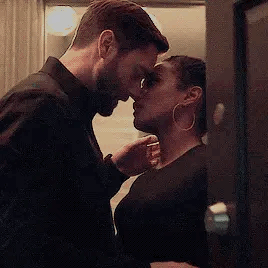
Gif credit @supagirl
Hey guys! I can’t believe the season finale has come and gone! I think my mind is just taking time to comprehend everything that has happened! Sharpwin is officially canon! As I’m typing this out, it feels strange writing a meta on the other side of things. Since season one, I’ve been writing metas about how these two belong together and making predictions about the trajectory of their relationship. Now, to be on the other side of things where I know longer have to do that because these two are finally together is kinda crazy. I feel so elated!
Now y’all, I’m not going to lie to you, I had a totally different meta planned out and that meta is still in my drafts. I will probably release it because it was a general review of the episode but I thought it was more important that I put this meta out first. When I was watching the finale live, I didn’t love it. I just didn’t. I loved that Max and Helen finally got together at the end of the episode but I had a major issue with how it unfolded. The issue my friends was this scene right here:
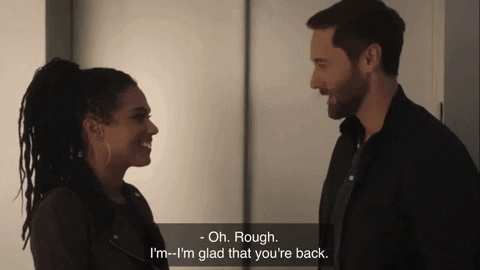
Baby!!! When I tell you this scene TRIGGERED me, it did! Now mind you, I wasn’t upset with Max’s storyline of searching and struggling to take off his wedding ring. It is human nature for Max to still have an emotional attachment to his ring. He’s not still grieving but essentially that ring is the only thing he has left of Georgia and represents a life he once had. Him taking it off was always going to be a monumental moment for Sharpwin and for himself. The issue that I had was Max casually telling Helen that he freaked out about losing his ring!!! To me, after the voicemail he left her, after Helen flew standby and was in a six hour flight to see him, it was an incredibly CALLOUS thing for Max to say. I know Max wasn’t thinking in this moment. I know his intentions were clearly not to hurt her but words matter and him being careless with his was a complete disregard of Helen’s feelings. She was deeply hurt and upset when he said this and rightfully so! I mean just look at her expression here:
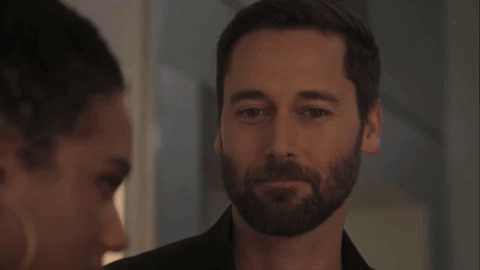
Helen’s entire being read like
“I can’t believe you”
And girl same, because neither could I!! He knew he fucked up and he obviously made up for it in the end but y’all when I was watching it live, everything that came after that elevator scene was was tainted for me. I had a hard time believing that Helen would let what he said slide so easily and in the moment, I couldn’t appreciate the beauty of them finally coming together! 😩 In my personal opinion, there were so many other ways that scene could have played out without Max having to literally tell Helen to her face that he was worried about his wedding ring! I know they were trying to build up to the “big moment” where he finally takes his ring off and runs back to Helen’s apartment but man, that moment did not sit right with me in my spirit! It still doesn’t and I don’t think my opinion will ever change on this.
With that said, I’ve now done several rewatches of the finale where I specifically watched the scenes after that awful moment by the elevator. As I’ve had time to reflect, my perspective has changed. I no longer view the moments after the elevator scene as tainted but as something deeply profound and beautiful. Hell, even as I reflect on that scene by the elevator, I still don’t like it, but in a way I understand it in how it relates to Max’s overall journey when it comes to Helen. To me, Max Goodwin is a man who fell deeply in love with Helen in the midst of the most complex situations and a season of him suffering. It’s been deep rooted, complicated and messy from the start and over the past three years we’ve seen Max navigate through the complexities of his feelings for Helen and the circumstances he’s found himself in on our screens. I think when you look at season three finale and specifically the journey of Max finally making a choice to be with Helen, you have to put into context Max’s history and how it influenced what that looked like. So y’all that is exactly what I want to do in this meta so let’s dive in.
One thing I think we need to acknowledge is that, even though as an audience we have loved seeing Max and Helen’s journey unfold, the road has been so TOUGH for them. As Helen said in 3x13, it’s been a fight! Especially for Max. The suffering he has endured over the past three years has been unfathomable and much of his relationship with Helen and his feelings for her have been developed under these traumatic and tragic circumstances.
At the very beginning of the series, when Max and Helen first meet they clash but it doesn’t last for long. It’s his first day at New Amsterdam and as the new Medical Director, he wants her to stay at the hospital and treat patients instead of doing press tours. Helen on the other hand wants to continue doing press and for the most part ignores his demands for her to return to the hospital. When she finally does return, she does so because she learns that Max has cancer. This bonds them at the onset as Helen is the only person in his life that knows about his diagnosis. As an audience, when we first see them interact, we instantly saw the sparks fly between them. Their chemistry and natural witty banter made us immediately take a look at their relationship and what potential they could have in the future. Though we were shocked by his cancer diagnosis, I think the fun and lightheartedness of Sharpwin’s first interactions really masked how traumatic this must have been for Max. On the first day of his dream job, that he sacrificed his marriage for, he learns that he has cancer while having a baby on the way. Those are the awful circumstances that first bring Max and Helen together.

As Helen becomes Max’s doctor and he swears her to secrecy about his diagnosis, their friendship and bond grows deeper. His passion and drive to help his patients, reignites Sharpe’s love for medicine again and inspires her to put her patients first. They become vulnerable with each other more than anyone else in their lives. He confides in her about his broken marriage and she tells him that she wants a baby. When he almost dies, she becomes his deputy medical director so that he can focus on his care. All of these moments are significant to them because somewhere along the way they develop feelings for each other. They didn’t plan for it and it’s something neither of them are consciously aware of but unknowingly, they both start to fill a place in each other’s lives that was clearly more than a doctor and patient relationship or a friendship. This “place” wasn’t called out until episode 1x16 were the clairvoyant called out their feelings for each other. When episode 1x17 comes around, after a night of revelations and a scramble to get the power back on in the hospital, Helen decides to step back as his doctor. If she wasn’t aware of her feelings before, in this moment, she’s fully aware of them now. This is an effort to safeguard her heart and set boundaries because the lines of who they are to each other were already so blurred. When she “triages” their relationship Max’s reacts badly and honestly they’re both devastated and are on the verge of tears:
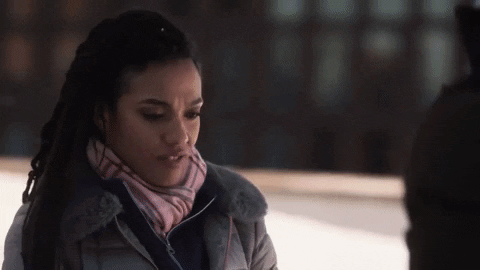
As viewers, we loved this moment but when you peel back the layers of what’s actually going on in this scene, it’s gut-wrenching. The subtext is so clear here yet their situation is so complex and layered. We know for a fact that Max wasn’t trying to lose her in ANY CAPACITY. We also know that in the way he TRULY wanted her he couldn’t have her and Helen knew that too. Not when he was married, had a baby on the way, and fighting cancer at the same time. Y’all that’s hard and profoundly painful when you think about it and it makes this scene all the more tragic.
When Helen steps back as his doctor, at first Max seems to be handling it well but as his cancer starts to get worse, he completely breaks. Like I said earlier, over the course of his cancer treatment, Helen filled a place in Max’s life that was so much more than just his doctor or his friend. So when he’s dying and no longer has the person he feels deeply for play an active role in his treatment, he lashes out. He’s dealing with a range of emotions he can’t handle or properly process. Things only get worse from there and at the end of season one Georgia and Luna’s life are on the line and Bloom and Helen scramble to save them. When it seems like everyone was able to come out of that traumatic event unscathed, they get into a devastating ambulance crash that changes everything.
Season 2 brings another level of pain and suffering for Max when he loses his wife after the crash and is thrust into single fatherhood. Not only is he grieving but he’s also dealing with guilt of falling in love with Helen while he was married. The complexities of his feelings is something he struggles with throughout this season and it affects his relationship with Helen. At some points he pushes her away and at others he desperately needs her. Once again, Helen and Max’s relationship is caught up in the most complex of circumstances that is riddled with agony and trauma.
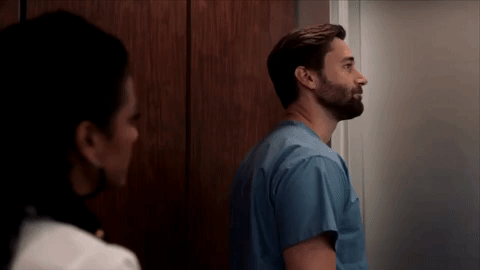

By time we head into season 3, Max doesn’t even have time to breathe or think about his relationship with Helen because they’re both thrust to the frontlines of the pandemic.
I bring all of this up again to emphasize that there has never been a time where Max and Helen’s relationship hasn’t been wrapped up in trauma or some sort of suffering. It has always been one thing or another with them. It’s been A LOT and Max has tried to navigate being in love with Helen through his suffering and under these crazy ass circumstances. So after rewatching the finale, the questions that run through my mind are:
How do you step into love when all you’ve known for the past three years has been suffering?
How do you love openly and freely when for so long you’ve emotionally suppressed your feelings for someone because it was “wrong?”
How do you let go, heal, and move on with your life?
To me, answering these questions is what the season finale for Max was all about. When you’ve suffered so much and endured so much it’s not easy to step into a new chapter in your life that’s hopeful and filled with love and possibilities. For Max, I don’t think in his wildest dreams that he ever imagined that he and Helen would be in a place where they could actually be together. Considering everything they’ve gone through, quite frankly it’s a fucking miracle! So when he actually makes it to the other side and not only SURVIVES but has a chance for happiness, I don’t think he knows what he’s doing. Pursuing/having feelings for Helen from a place that isn’t wrapped up in trauma and tragedy, where there are seemingly no obstacles in his way, is totally and completely new territory for Max. I think he’s clueless in how to do that in the right way and as he navigates through that, naturally there are hiccups.
That’s evident with what he said by the elevator and also in this moment here:
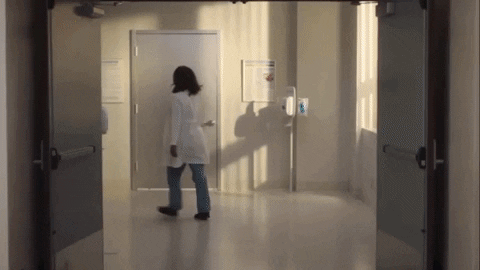
Max doesn’t have a clue but he wants to make sure that he doesn’t fuck it up because he DESPERATELY wants this! I also think there’s something to be said about how we as human beings can self-sabotage ourselves when we finally have an opportunity to get what we want. Fear, guilt, worthiness usually comes into play with that and I think for Max there was definitely a fear with moving on with his life, guilt of surviving it all and having a chance to be with the woman he’s loved for so long, and a question of if he’s worthy of actually having happiness.
Their walk in my mind perfectly embodies him self sabotaging while also trying to navigate his feelings of desperately wanting to be with her. At the beginning of their walk, you see that at one point he clearly wants to hold Helen’s hand but he doesn’t (I would use a gif here y’all but I literally only have room for 10 😩). I’m focusing my attention on Max here because essentially this whole moment between them is a part of Max’s “mini story” in the episode. The ball has always been in his court and truly what we are witnessing is his journey to step into love because Helen is ready and has been waiting on him.
The most compelling moment in their walk scene for me was this one:

I find it strange for Max to walk so far ahead when he was the one who asked her if he could walk with her. My first thought while watching it live was “what is he doing” and I think Helen’s expression reads the same way. After analyzing this for a bit, I genuinely think that’s the point of this scene. Like I said earlier, Max doesn’t know what he’s doing. To be with Helen like this is, where its romantic, peaceful and drama free is probably blowing his mind and he doesn't know how to navigate this. He doesn’t know how to receive this second chance at happiness.
The internal war of Max stepping into love or allowing fear, guilt, and unworthiness to hold him back becomes all the more evident when they get to Helen’s door:
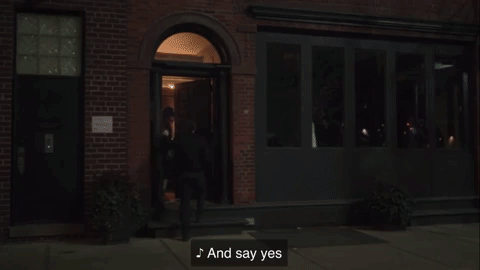
He knows he wants to come in. Helen know he wants to come in too. This man literally says goodnight twice and when Helen responds with “you said that,” it perfects this scene. She wants him to come in as well but she’s not going to ask him to. In this moment, she sees his internal struggle and she knows that he has to make the choice himself on whether or not he wants to move on with his life with her.
When he walks away, for a moment that was Max choosing to hold onto the pain and trauma of his past. That was him choosing to hold onto the guilt that was keeping him from healing and moving on. With the suffering he’s been through, it makes sense. In many ways he’s been conditioned to fight, to suffer and to endure. It’s what he’s used to. But praise the lord, he thinks of the moments he just shared with Helen.
The joy he has with just being in her presence.
The opportunity he has to freely be with her and have a life with her after loving her for so long.
He is not condemned to a life of suffering. It was only for a season. He’s in love with Helen and wants to be with her. Like hell is he going to let this opportunity at a second chance of love and happiness slip away from him. So guys, he slips off that ring, runs back to Helen’s apartment and makes a choice to step into love. Step into this new, uncharted, chapter of his life with Helen Sharpe.
Anyway guys! I hope y’all enjoyed this! I might be releasing one more meta but we will see how it goes.
As always feel free to reach out to me on Tumblr and on Twitter @oyindaodewale. Love you guys!
156 notes
·
View notes
Text
“The 02 characters didn’t get any character development”
Yes, they did.
“But -- “
Yes, they did.
Having had the gift of having rewatched 02 recently, I have to say that it still really, really confuses me how the hell people get this impression. It’s not even “I’m trying to see the best out of this” but that I genuinely do not get it, because as far as I’m able to see it’s pretty much literally right there!! This isn’t even tinfoil hat tier!
But in case you have any doubts, sit down because Shiha’s gonna sit here and write a meta about the 02 kids, and how they are perfectly reasonable characters that developed properly fine over the course of the series.
(All below translations of 02 dialogue are by PositronCannon.)
So the first thing to understand about 02 is that it is fundamentally made with a very different writing approach from Adventure in the first place, and therefore it is not meant to be compared in a one-to-one fashion.
This is a point I’ve said many times over and over, and I think it’s to the point where it shouldn’t even really need official clarification, but I’m just going to go ahead and bring up the words from Director Kakudou himself:
For instance, we had the prior series stick out in terms of its points about “what it means to be oneself”, and for 02 we made it so that you would pay attention to “the relationship between yourself and other people”.
Right, so: 02, by design, does not use Adventure’s character development methodology of “self-awareness”. It is built from the ground up by having its characters and character development predicated on relationships instead of singular characters. This might seem a bit odd on its face, but no man is an island, and, in fact, changing the way you interact with other people and with the world in general does speak a lot about one’s personal growth in its own way. And this also means that if you try to analyze 02 by holding it to Adventure-based standards of “character focus episodes” or the like, you’re already on a losing battle.
This means that character growth in 02 is not presented in a way where it’s up-front and center, but rather something you have to glean over the natural course of the series. We’re working off relationships, so you have to actually pay attention to the natural interactions between the characters or what they say even during “off-hours” -- the focus-episode format used by Adventure doesn’t apply here anymore. And it’s something apparent enough from how “evolution” is a metaphor for “personal growth” in this franchise -- in Adventure it was via the Crests, which meant self-awareness, but 02′s key evolutionary trump card is Jogress, which relies on the strength of relationships.
One thing I have to say in terms of my experience as a 02 fan is that I’ve found I actually appreciated it significantly more as an adult than I did as a kid, and that, in general, a lot of the things to appreciate about 02 are things that you really viscerally feel and understand when you’ve gotten that degree of life experience under your belt. Unfortunately, this is kind of a double-edged sword, too, because it ends up becoming the kind of series that often risks going over the heads of the very audience of children it was supposed to be targeting. It’s got a lot of very nuanced depictions of mental health and the childhood experience that are maddeningly subtle, to the point of possibly going over one’s head or even coming off as illogical without sufficient life experience, or simply just not being as visceral (the entire theme of “parents stroking their own ego with their kids’ achievements” hits the hardest when you’re college age).
So what this means is that 02 doesn’t exactly hand its themes or character development to you on a plate. But it is there, once you actually start looking for it.
Let’s start off by talking about our main core cast of characters. Adventure and 02 prided themselves on the fact that they tried very hard to not be adherent to anime tropes, but rather to portray well-rounded, nuanced characters that felt more like actual kids you might meet at school. So how does the 02 cast fare in not being pigeonholed anime tropes?
Daisuke: Even though official freely admits he has “the most anime-like personality”, it’s hard to say he actually falls that much into the generic shounen archetype. For one, he’s actually shockingly humble and polite in certain situations (he’s consistently polite with his elders, and is very quick to admit his own limitations). Actually, he comes off as a surprisingly friendly and deferential person -- it’s just that he happens to have somewhat of an abrasive exterior, and even then it’s implied heavily in the first half that this stems from a lack of validation and purpose. (He actually “deflates” really easily, so you can’t even say he’s all that arrogant past the surface.) Certainly he’s simple-minded, and kind of an idiot, but his abrasive exterior is actually pretty deceptive.
Miyako: Miyako floats an interesting duality of simultaneously being aggressively feminine and being aggressively un-feminine -- not necessarily in the sense she tries not to be feminine (on the contrary, she absolutely embraces it), but more that she’s also an aggressive, “inelegant” mess in ways atypical for a lead heroine in a shounen show, who are usually either cute or “badass action girls” and not...a mess. Despite that, she is also consistently portrayed as capable of heavy emotional depth and being very genuinely kind and concerned about others, which are not in any way diminished by the fact she happens to be an aggressive mess with a severe case of foot-in-mouth syndrome. It’s an interesting mix of character traits that you don’t see often.
Iori: “Designated young characters” usually fall into the “cute” archetype a la Adventure!Takeru or Tomoki, so it’s interesting that the youngest one is actually the most mature one, and impeccably polite at that (having been raised by a family that emphasizes formal manners and propriety). Even more interestingly, nobody actually treats him like he’s that much younger, and he’s given the weight of respect in a sense that has nothing to do with his age (think about how there are indeed quite a few kids who simply just get along better with older kids). Yet the series doesn’t shy away from his youth, and his overly black-and-white view of morality is portrayed as immaturity in its own way, along with the occasional “slips” in his facade or manners indicating that it’s still something he has to consciously focus on.
Ken: Ken’s development goes without saying (it’s one of the most consistently praised aspects of 02), but it’s also interesting to note the unusual way the series plays his redemption arc. Instead of making him a typical “jerkass anti-hero who learns to get a bit better”, the series completely blindsides you by revealing that Ken is, in fact, a naturally soft-hearted and kind boy, and then plays up the mystery of the severe kinds of trauma that would lead him down that path. And ultimately, even though the cause is revealed to have supernatural influence, the series also makes it clear that it doesn’t matter -- that, whether it was his conscious “fault” or not, he still is responsible for what he did. And on top of that, it also scorns the usual “redemption by sacrifice” mentality by pointing out that it’s a cop-out -- it doesn’t actually solve the problems that were caused, and, in fact, a much better way to make up for things is to fix them going forward.
Takeru: Takeru had the “designated young character” role in Adventure, and it turns out that once one of those gets a few years older, they’re naturally not going to be nearly as pure and innocent! The “sweet child” from Adventure has now grown into having slightly pettier emotions, even to the point of grudge, and things he won’t let go of. Oh, and also, trauma from three years prior is still going to have impact on an eleven-year-old kid. Who would have thought.
Hikari: Adventure’s most infamously inscrutable character also seems to have gained some individualized, not-quite-innocent traits of her own (observe how she deals with Daisuke’s advances), and, moreover, it turns out that her deferential humility and refusal to open up about her problems is...not a good thing! when it starts to actually bite her in the rear in front of her friends. Yeah, it turns out that being the “quiet cute girl” actually has its own mental health drawbacks. Oops.
We’re doing pretty well, actually! At the very least, they certainly feel like they already have the Adventure/02 brand of character nuance, where their personalities are inherently varied and nuanced enough that you may not quite find characters like them elsewhere. On top of that, we definitely get to see what makes these characters “tick” -- we get a lot of depth into their thought processes and what their likes and dislikes or strengths and weaknesses are, and that’s something 02 still completely beats out a lot of other kids’ shows or even certain other Digimon entries with.
But here we’re talking about character development. So what do we know about them at the very beginning of the series?
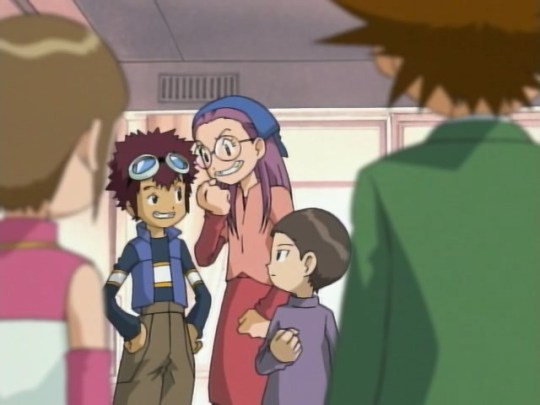
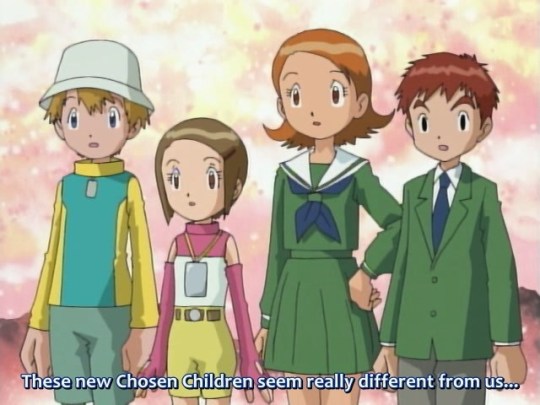
Having watched 02 in Japanese a few times and being very used to the core cast’s latter-half characterizations, rewatching the early episodes always strikes me really hard in the face with genuine shock at how shallow the kids -- especially Daisuke and Miyako -- start the series off as. It’s understandable in terms of the context of the series -- unlike the Adventure kids, who were thrown into a “survival, need to get home” situation off the bat and thus already understood the need to be wary, these kids started off having comparatively easy access to home at any time, and didn’t have a constant sense of danger and survival looming over their heads. It naturally took a lot of time for the gravity of the situation they were in to start really hitting them, and so even the relatively straight-laced Iori didn’t exactly take it all that seriously at the beginning.
Yet while it took them a significantly more delayed time to understand what they were dealing with and take it as seriously as they needed to...they started cultivating something else in the meantime.
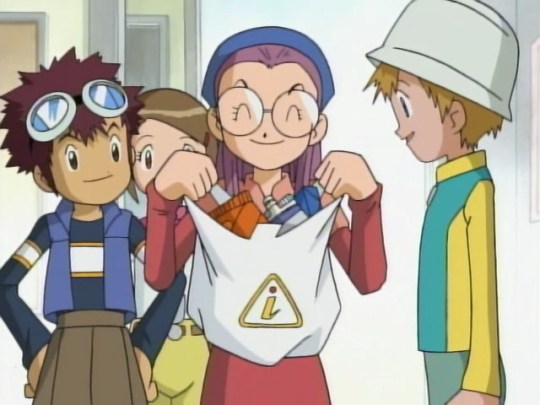
02′s first half is especially full of “random banter conversations” that seemingly involve nothing in particular, but, in fact, that’s actually part of the point. One thing I have always been quick to point out in regards to 02 is that it is rather unique among Digimon series in how it goes out of its way to portray its core cast as having become friends even in pure daily-life social friend terms, even if it had absolutely nothing to do with Digimon incidents -- these are kids who genuinely enjoy each other’s company even in the most mundane of situations. This was something that wasn’t the case for the original Adventure kids -- having been a group of kids thrown together by necessity, even though they most certainly kept in touch and trusted each other as fellow Chosen Children deeply, they started floating back into their own different social clusters after the events of 1999. Relationships are multifaceted, after all; you can still have a deep relationship and bond without necessarily being friends on a social level.
But already, off the bat, Miyako brings food for her new best friends, and it’s implied that she’s the main ringleader behind holding the picnic -- a picnic that started off having no intended relation to the Digital World territory war -- in episode 6. And, to be quite honest, can you really blame these kids? Even the Adventure kids wistfully entertained the idea of a long-term fun adventure through the Digital World in Adventure episode 54, wanting to enjoy its beauty and fun in a situation where they weren’t constantly running for their lives. Now that this luxury is actually available, why not take advantage of it -- and bond further with the others in the process? And for the rest of the year, these kids actively end up spending mundane conversations together and bonding to the point that, by the time we get to the end of 02, these kids have just genuinely bonded so much that they really come off as a cohesive, inseparable unit that would actively choose to spend time with each other if given the opportunity. In fact, even going through all of the TV Digimon series that exist as of this writing, I would say Appmon is the only one that really competes with 02 in portraying its core cast in this manner.
Again, remember: this is a series where characterization is dependent on how the kids treat others and interact with them, so you do actually have to pay close attention to these interactions and see how they change over the course of the series.
So once the episodes start coming in play, we actually learn a lot more about what happens when the characters start breaking away from their shallowness. For instance, episode 8, one of the first key episodes to understanding Daisuke’s character:
Daisuke: He'll be a great opponent. We didn't face off in the last tournament. Takeru: If you had made it to the finals, you would have, right? Daisuke: Don't remind me... Hikari: Can you win? Daisuke: It's not about winning or losing. Right now, all of the boys who play soccer in this country want to be like him. Just thinking about playing against him makes me excited!
For all Daisuke initially seems to be arrogant, he’s actually not that incapable of humility. Far from it, actually; he does have a genuine love for soccer and the spirit of the game, and, when completely and obviously unmatched, fully admits he has no chance and is set on enjoying the most he can out of it anyway. I feel like Daisuke’s surface-abrasive attitude really does throw off the fact that he’s a lot more genuinely humble than he’s given credit for. In the end, he’s satisfied enough with the accomplishment of pulling off one sliding tackle against Ken, and is able to enjoy that -- a foreshadowing of how the latter half relies so much on the fact that he’s capable of enjoying simple pleasures and being straightforward about them.

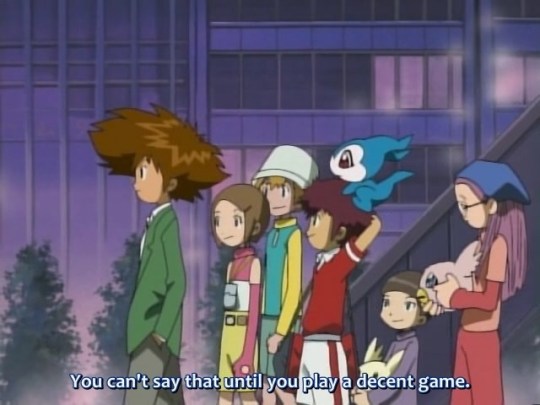
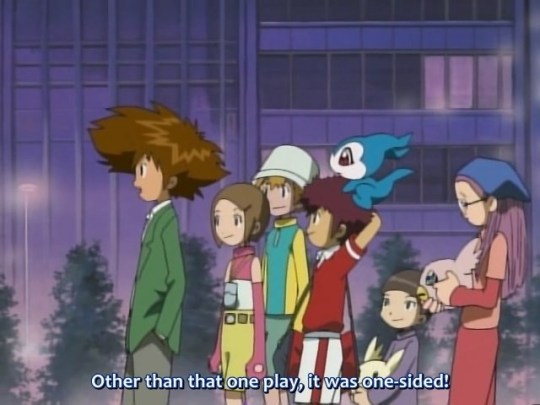
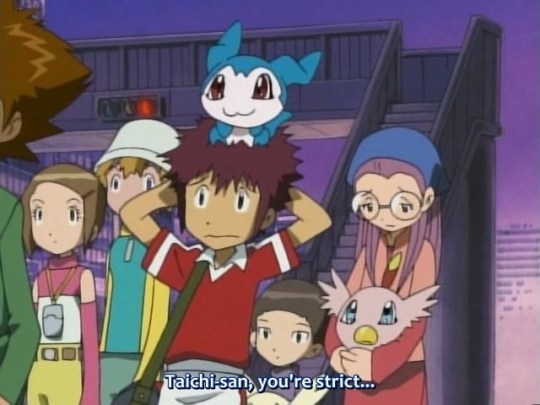
I find that this scene is really underappreciated, too (mainly because it gets lost in all of the other major things in this episode) -- while Daisuke jokes about his accomplishment, it only takes a single comment from his respected senior Taichi to shut him down.
There’s a huge reason I constantly emphasize that Daisuke respects his elders -- this part tends to get lost in translation a lot (especially the American English dub, which just smashed this aspect out of him wholesale, among other things) due to it being a bit reliant on Asian senior deference and cultural propriety, but Daisuke is respectful not only out of societal obligation but also because he genuinely respects his elders! The way he looks up to Taichi and chases after his approval is genuine, and even his interactions with the other Adventure kids have a major hint of him having genuine respect and deference to them. Daisuke is just a deferential person in general -- note that while his crush on Hikari tends to manifest when he’s at his most shallow, he’s actually the one putting Hikari on a pedestal (considering it his own responsibility to impress her), so he’s not actually as assertive as he tries to come off as. The first half of 02 arguably has him deflating more often than he actually stands his ground...and this is a trait of him that starts to actually change quite a bit over the course of the series.
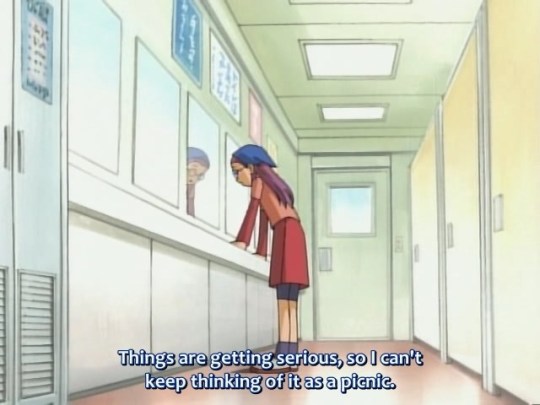
Miyako comes to terms with the fact that maybe she’d been taking this whole Digital World adventure thing too lightly in episode 10, indicating that she actually does have a good sense of priorities when they become increasingly clear! This is actually very important, because it fleshes her out as someone who’s emotionally sensitive -- too emotionally sensitive, to the point that “emotional sensitivity” is just as much of a driving point behind her later breakdown in episode 18, this time from taking her duties too seriously. Miyako is a very id-driven person, and so a lot of the early series is her struggling to find a proper balance on how to adjust her emotions in an increasingly escalating situation. Her heart is in the right place, she’s just not someone with an inherent sense of preparedness to deal with this kind of problem.
We get into the secondary Digimental arc, and there’s a noticeable consistent thread that all of them involve admission of personal faults. This is something that tends to throw people off at times -- wait, having bad traits about yourself is what awards you? -- but the point is that this isn’t like Adventure’s Crests, where things came from proof of exercising the virtue, but rather admitting that there are ways you need to improve, and showing a will to improve in that manner. In the end, people are not perfect human beings, and sometimes even understanding that you’re deficient is half the battle -- after all, the second half is all about a certain character named Ichijouji Ken coming to terms with some very, very serious personal problems.
In episode 11, Daisuke completely admits that he doesn’t feel he understands the concept of friendship the way Taichi and Yamato et al. see it, also latently admitting that he doesn’t see himself as worthy of the Digimental of Friendship. Beyond betraying a lot deeper issues within Daisuke that he seems to have actually had a background lacking in friends and sources of validation, he actually acts very self-effacing when admitting his issues to Taichi and Yamato, ultimately culminating in him calling himself pathetic. Or, in other words, he does want to be a better friend and to understand the concept better, and is harsh on himself for not doing better (which, of course, ultimately leads to how he eventually does gain better relations with the rest of the group and reaches out to Ken).
In episode 14, Miyako admits that she’s shallow and judgmental and tends to jump to conclusions based on first impressions. Recall that she’s comparing herself to Mimi in said relevant scene -- Mimi, whom she admires, and actually spends part of the episode trying to understand and empathize with the mentality of. This is not a statement of Miyako being proud of herself. Rather, this is Miyako being very straightforward about the fact that she needs to try harder to see through the essence of things and to see through to the emotional core of. Again, something she actually does start developing over the course of the series.
In episode 16, Iori gets his first major lesson on the limitations of being too stuck on principles in his attempt to be honest. Recall that Iori’s later character arc is very dependent on him realizing that his own view of the world is too black-and-white. It’s great if you could never tell a lie to anyone, ever, but in the end, that’s going to reach limitations of practicality -- after all, as Jou points out, what Iori did ended up not actually hurting Jou in comparison to the incredible amount of hurt it would have caused everyone by being too stubborn, and thus Iori would have failed to keep his responsibility to help the others because of one narrow-minded principle.
Hikari even gets in a bit during the infamous episode 13, where we learn that her “passive” attitude is biting her in the rear. In Adventure, Hikari’s passiveness and reticence had mostly been used as satellite development for Taichi (his insecurities as an older brother and his obligations to her), so this is actually the first time we get to see a proper perspective from Hikari’s side, and it turns out that his overprotectiveness has actually caused her to get dependent. But even though Taichi is the one the episode actually focuses on, the larger focus is more specifically on the fact that Hikari is too passive -- that she sees being taken by the Dark Ocean as an inevitable thing that’s just going to happen unless someone else steps in on her behalf. Takeru, of course, is having none of it.
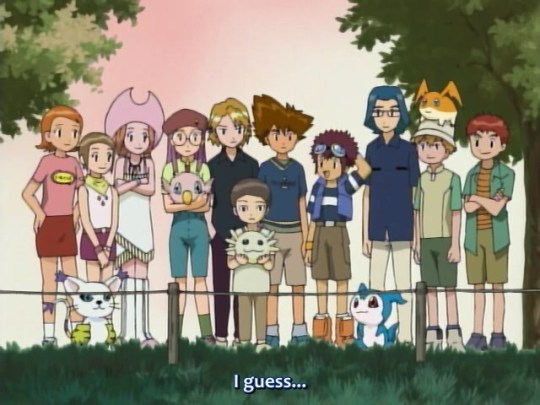
Once that’s out of the way, we go back to taking a look at the subtleties of everyone’s interactions. While everyone generally tends to focus on the second half of episode 17, it’s also pretty interesting to see how the 02 kids react to hearing about their seniors’ adventure in the first half -- remember that this is the first time the 02 kids are actually given any real depth about the degree of 1999′s events that’s not just random points of hearsay, and the way the new kids react to it indicates that they’re thoroughly floored. It’s later established that they didn’t even get the full story (it may not even be possible, given that the Adventure kids’ experiences may well have gone even further beyond what we got to see in 54 episodes), and yet the new kids are overwhelmed. 02 itself does not shy away from the fact that the younger kids really have no qualms about deferring to their seniors if need be, and treating them with utmost respect.
Another minor note, which I pointed out in my Daisuke meta earlier, is that the beginning of this episode is pretty much the last time Daisuke ever shows outright hostility towards Takeru for his relationship with Hikari -- it’s something you have to glean by squinting, but the implication is that the insecure and clingy Daisuke actually got to learn this episode that the two of them had a pre-established shared experience that he himself may not understand, and that it wasn’t just Takeru randomly swooping in and snatching away the closest thing he had to a friend for no good reason.
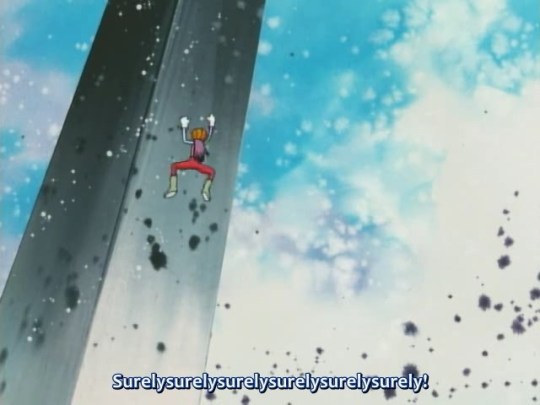
Once the Kaiser infiltration arc begins, episode 18 ends up being one of Miyako’s funniest episodes, but it’s a bit distressing that a lot of people in the fanbase often never let Miyako live this incident down, when in actuality this was explicitly not a good mental health day for her. (This is basically the equivalent of pinning Mimi as a conceited, self-centered jerk based on the fact she was one for a fashion in Adventure episode 25.) The beginning and ending of this episode establish that this is basically a result of Miyako...trying her hardest. She’s scared as hell, but she also learned in episode 10 that this is something she needs to take seriously, and the stress puts her into a mental breakdown. This is why she ends up having a heart-to-heart with Hawkmon at the end; her heart is in the right place, but she needs to find a way to channel her emotional sensitivity in a way that doesn’t make her into a complete mess.
And note that her own voice actress, Natsuki Rio, even pointed out that Hawkmon’s actions had enough of an influence on Miyako’s character that she had to play her differently thereafter.
At first I always played her with Maximum Excitement, and I kept thinking “someone, please, stop her,” but the more straight-laced Hawkmon did his best to pull her in and hold her by the reins (laughs). Thanks to him, Miyako became a lot more of a put-together person…thank goodness Hawkmon is her partner!
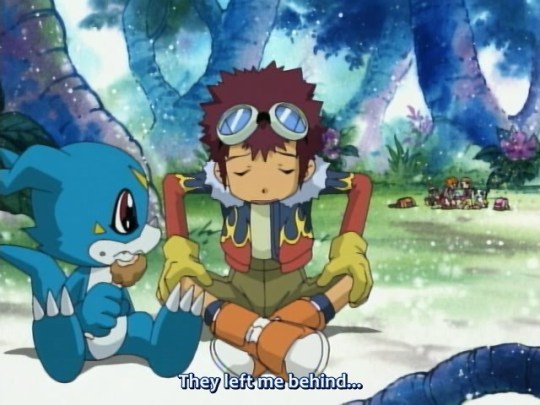
Episode 19 has two interesting things of note that I want to point out -- first of all, starting from the very beginning of the episode, everyone ditches Daisuke because they’re independently going in to infiltrate the Kaiser’s base. Note the complete lack of a plan here whatsoever -- everyone’s just going in on their own -- and the fact that everyone expects Daisuke to come up with what he wants to do on his own. For all it’s worth, even though Daisuke may have a designated protagonist aura to him, within the story itself...nobody actually sees him as a leader at this point in the series (and, to be fair, he’s never really tried to claim the position, either).
It’s similar to how Taichi was never recognized as a particular leader of the Adventure group until Adventure episode 28, but in regards to the full team dynamic, it’s actually inverse -- the Adventure kids were capable of making tactical plans together as early as episode 20, but fell apart emotionally in short order as soon as Taichi was gone, whereas here, the kids are fond enough of each other to hang out socially and support each other emotionally, but they take a while to get any real cohesiveness as a fighting group.
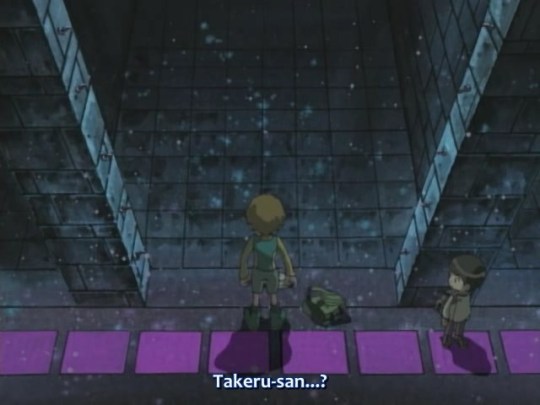
The other is that Iori personally witnesses Takeru’s sudden whiplash into his grudge against the darkness and the Kaiser, and it scares the hell out of him.
Takeru eventually laying a punch on the Kaiser is a pretty awesome moment (and, really, Ken kind of deserved it, so it’s hard to not cheer for him), but it’s also important to note that within the context of the series, this is not a good mental place for Takeru to be in. Iori, the person who should by all means sympathize with hatred of evil things at this point of the series, is still extremely unnerved by Takeru’s actions here, because he’d always seen Takeru as a mature person who’d always kept his composure, only to show a drastically different side of him that he hadn’t even shown a hint of before. That kind of “two-facedness” and emotional repression -- and this way of venting trauma in general -- cannot be good for Takeru at this point in time, and it’s also an important moment for Iori when he later admits during the two’s Jogress arc that he’s having a bit of a hard time understanding him.
And so episode 20 comes, and Chimeramon pretty much takes out the entire party, leading to this conversation.
Takeru: Let's escape. Daisuke: Escape? Takeru: We can't fight anymore. Our mission has failed. We'll retreat and wait for another chance. Hikari: You're right. We have no other choice. Iori: Understood. Daisuke: No. Miyako: Daisuke? Daisuke: We can't just say "another chance" like that. If we leave now, they'll keep attacking anything in sight. We don't know if we'll be able to get into the fortress again. So this is our only chance! Hikari: That's crazy... Iori: Exactly! Miyako: They're all back to their Baby forms... Chibimon: Daisuke... Daisuke: But...didn't you all see it? Destroying those towns...and all we could do was watch quietly. I don't want to see that ever again. I won't let them do whatever they want! So I'm going, even alone. I won't give up now. After getting this far, all I can do is go forward!
Why is this moment important? This is the first time Daisuke has actually stood a firm ground against anyone else in the party -- and not only that, with the entire party standing against him.
Recall that I mentioned earlier that, in spite of Daisuke’s abrasive attitude suggesting otherwise, he actually has a tendency to “deflate” pretty quickly when people tease or criticize him. He spends the first half of the series having a lot more bark than he actually has bite. Earlier in the series, if the entire party were to go against him, he’d be more likely to begrudgingly go along (while complaining) -- in fact, he actually did just that at the beginning of episode 7! But now that push has come to shove, Daisuke’s own sense of morals and bleeding heart have won out. (While his decision here is definitely a bit reckless, he does have a point; if they’d retreated, they might genuinely lose any future chances.) Even with the entire party telling him to pull back, he refuses to accept what they want him to do, and pushes forward.
This is where Daisuke first starts to really make strides towards what becomes his eventual major role in the group as “the one who pulls people forward”. It’s a moment after which the rest of the group themselves also start to treat him with more respect now that he’s proven he’s not just a doormat, and that when it comes to there being a real problem with real priorities, he does have the resolve and initiative to keep going.
Also, a very important point is that he immediately says he’ll go alone if he has to. He doesn’t begrudge the others for wanting to fall back, and has no condescension towards them; he just can’t stand the fact that he himself is being asked to sit it out.
So, you know. Episode 21 happens. Ichijouji Ken goes through some real trauma as Wormmon dies in his arms. And all Daisuke has to say is...
Daisuke: You should go home. There are people who are worried and waiting for you! Go home!
Remember when I pointed out that 02 takes a very unique perspective on Ken’s redemption arc, pointing out the futility of being too trapped in the idea of symbolic penance and focusing more on actively taking steps in the future to make up for and fix things? Here’s our first major sign of this, and Daisuke’s eventual approach to Ken -- Daisuke does not choose to scorn or lambast Ken for what he’s done, even though there are a lot of things Ken deserves to be harped on for, but rather instructs him to take the first active step towards fixing his mistakes, in this case fixing things with his family.
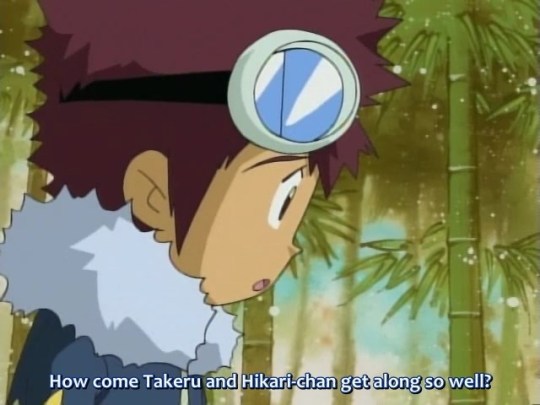
Episode 22 is Daisuke’s own “fanbase will never let him live this down” moment, but there’s still some interesting things to note here. Firstly, Daisuke’s “relapse” happening exactly when it seems like his duty to the Digital World is done and there’s nothing to do besides community service doesn’t seem coincidental, especially when this exact episode actually dedicates a full scene to Takeru, Hikari, and their partners going “...now what?” Secondly, as I touched on earlier, note that Daisuke’s never really seemed to have any resentment against Hikari for not responding to his affections -- in fact, he still considers it his own (and V-mon’s, by extension) duty to be the one to impress her. It’s a surprisingly refreshing take on the “shounen hero with a crush on a girl” trope, because in the end...Daisuke isn’t actually all that possessive of her, he just really wants validation from her, and respects her a lot.
More importantly, though -- note the way Daisuke handles this topic. He’s not actually mad at or resentful of Takeru anymore. In fact, he’s mulling on the topic and wondering what he could do to be on that level. Yup, even when Daisuke’s being shallow and jealous, he’s still learned to handle this issue ever so slightly more maturely than he would have at the beginning of the series.
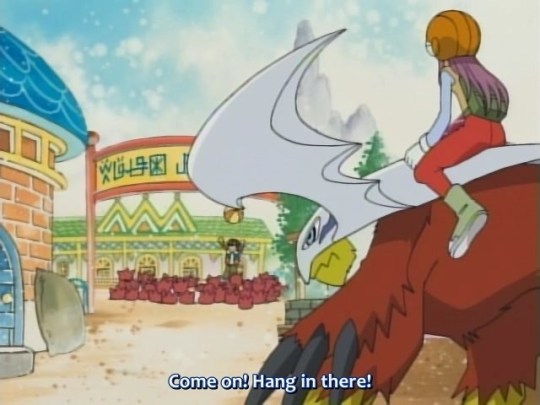
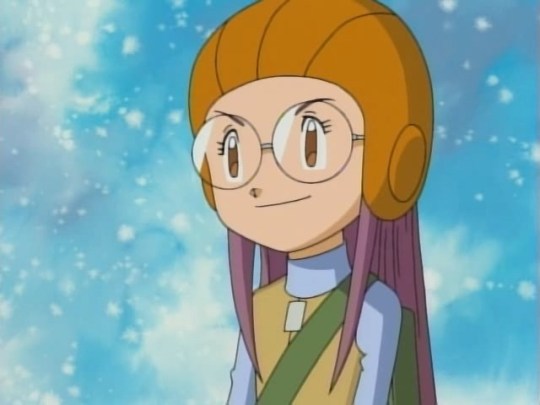
This is also important because only one episode later, once Daisuke becomes disappointed again at Takeru and Hikari walking off on their own, Miyako intervenes -- not only so that Takeru and Hikari can have their space, but also so that Daisuke can have some genuine fun and something to do. This is a very blink-and-you’ll-miss-it moment in episode 24, but it makes it very clear that Miyako was looking out for Daisuke’s welfare, too, and I think it’s very important in light of the events of the prior episode. Miyako, who had always been fumbling on what to do with her emotions, is starting to properly channel them into managing the dynamic between the team and checking in on how everyone’s doing, and that starts to guide her actions and relationships for the rest of the series.
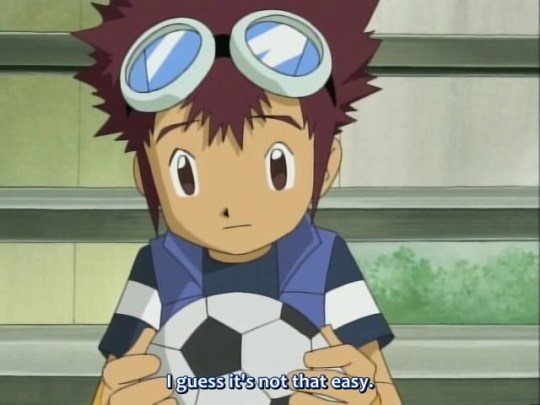
The next episode (25) is where we kick off not only the Jogress arc, but also the arc where we start going into everyone’s attitude towards Ichijouji Ken. This is important not only because Ken happens to be the effective central figure of 02′s story, but also because -- well, remember, 02 is fundamentally founded on the concept of relationships, so it’s only natural that the other kids’ relationship with the “team newcomer” will be a key aspect of the second half, and in relation to their own characters.
Remember how I said that Daisuke’s first-half character involved him being extremely deferential and often deflating whenever he was criticized or someone stood against him? At the time of episode 25, once again, pretty much the entire team is standing against him -- he’s the only one who’s this level of open-minded about getting Ken into the group, and everyone else is showing differing levels of opposition. But while Daisuke doesn’t begrudge the others for thinking this way, he also doesn’t back down, either, and reaches out to Ken on his own because he still really believes in what he’s doing. Now that he’s settled into what it means to be a Chosen Child, he’s started to gain a proper idea of what he wants to do, and what he feels needs to be done.
So, let’s recap everyone’s stances on Ichijouji Ken at the time of this episode!
Daisuke: Forward-thinking and optimistic; willing to believe that Ken should be given the chance to make up for his mistakes and that they should put everything behind him, even to the extent of believing that there’s probably a good reason for the more suspicious aspects about him (prior to the events of episode 25, it was unclear whether Ken was being a bit too callous about killing Digimon). Also the most actively aggressive in reaching out to Ken and trying to get him to join them.
Miyako: Forward-thinking; she openly states at the beginning of the episode that she thinks Ken’s learned his lesson, she’s just worried about whether he’s going to keep doing questionable things in the future (killing Digimon). Once it’s on the table that he’s not just doing this callously, she immediately is on board with him (to the point of even being the first in the group to use given name basis with him), but her stance on what to do with him is more on the edge of “give him space and wait for him to come on his own terms” (she ends the episode saying she’ll be waiting for him to come).
Takeru: States in the episode that he does believe that Ken’s changed, but doesn’t really know what he’s thinking (i.e. too inscrutable to really be sure about). The later episode 35 implies that Takeru was inclined to be a bit more sympathetic than you’d think otherwise, because he understands the trauma of losing a Digimon partner.
Hikari: Wants to wait a little longer and see how things play out. (Remember that Hikari has a known, consistent thread of taking a very passive approach towards things.)
Iori: Absolutely against it on sheer principle.
It should be noted that none of these stances are wrong. Iori sometimes gets a lot of flak for being the one with the most infamously cold stance towards Ken, but when you really think about it, Daisuke and Miyako are very lucky that their hunch about Ken was right and that he actually did happen to be a very kind boy who had a little too much trauma and some supernatural influence. The fact that Ken is a very emotionally withdrawn person for the rest of the series meant that the two of them ended up breaking through to him the most, but there’s nothing wrong with Takeru, Hikari, and Iori’s skepticism; Ken did some pretty shockingly horrible things in front of their eyes for the first half, and it’s entirely within their rights to determine how forgiving they want to be with him.
In any case, we get to episode 26 (the first Jogress), and most of that episode goes without saying, but I do want to emphasize Daisuke’s lines right before it happens.
Daisuke: If you die now, you won't be able to accomplish anything...I don't want that! Ken: I don't want that...There are still many things I must do.
Daisuke urges Ken not to go for the “suicidal penance” route not only because it sucks, but also because, as symbolic as it may be, it’s also counterproductive to the whole point of doing penance to begin with. If Ken really wants to make up for his mistakes, he’s only going to be able to do that if he’s actually alive to do it! There’s only so much you can do by drowning in self-pity by going “because I did this, because I did that” instead of actually taking responsibility for your actions.
02 itself is deliberately ambiguous on how much Ken’s transformation into the Kaiser was Ken’s own conscious will and how much of it was Dark Seed-induced supernatural influence, but one thing it’s consistent about is that it doesn’t really matter. Regardless of what the cause was, Ken did what he did, and it’s his responsibility to make up for it, and the only way to actually do that is to keep moving forward. The fact that Daisuke is so able to viscerally and directly address what Ken needs the most right now is what fuels their first Jogress, and why Daisuke becomes Ken’s closest friend through the rest of the series.
People have pointed out that 02 has a lot of moments of physical hits, but, notably, other than Takeru punching the Kaiser in episode 19 (which he really deserved, honestly), all of these hits are done with the express intent of bringing the other person out of a very, very deep mental abyss (Yamato punching Taichi in episode 10, Daisuke slapping Ken in 26, Miyako slapping Ken in 30, and Miyako and Hikari’s mutual slaps in 31), because they were in a state where words would no longer reach them otherwise. These are all circumstances of the kind where the person on the receiving end understands that they really needed a drastic wake-up call because of how deeply they’d fallen (and these aren’t some average mental abyss problems these kids are getting put through, either). It’s actually hard to imagine any of the 02 group getting in the kind of genuinely angry and vicious fistfights Taichi and Yamato would in Adventure, because of how close they are (the closest being Daisuke and Takeru grappling in episode 11, but it never got near that level) -- in fact, these kinds of things are done with the implication that they’re doing it because they trust the other person to not hold it against them (and in fact, the fact Yamato does this with Taichi in this way is intended to be read as a sign of how much better they’ve come to understand each other).
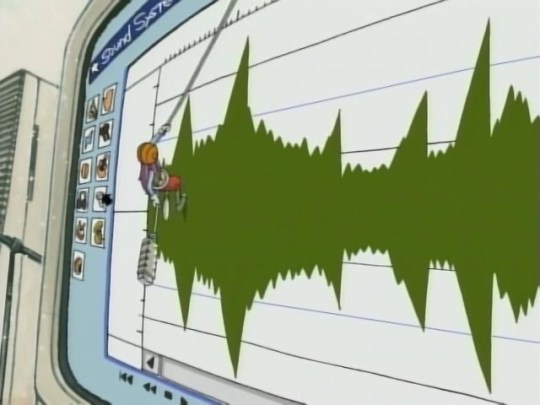
So, moving on with the series! The Giga House incident in episodes 28-29 is the first time the group works together in an organized effort, which is notable not only because it’s their first time coordinating with Ken, but also because it’s their first time properly coordinating at all. Remember when I mentioned that, back in episode 19, as much as the kids were pretty fond of each other and were great friends, they still hadn’t figured out how to actually fight as a team? Here we are, with them actually having started to figure that process out.
We then get to episode 30, where there’s actually quite a lot of interesting things to unpack.
Miyako: What's wrong with you? Daisuke: E-Eh? Mi-Miyako-san? Miyako: It feels weird when you add the "-san". Daisuke: Shut up! Man, you're all the same!
Miyako and Daisuke’s relationship is often misconstrued considering that they’re the two most chaotic in the group (their temperaments are very similar at times, which causes them a lot of friction), but I also think this blink-and-you’ll-miss it moment is pretty much their actual relationship in a nutshell. They fight a lot, and they’re ostensibly vitriolic, but they’re actually two of the most like-minded in the group -- they banter because they’re comfortable with each other. Recall that I mentioned that Daisuke is normally respectful with his elders, yet he’s the only person in the group who won’t use the -san honorific on Miyako (even though she’s the oldest)...but the one time he gets flustered and uses it on her, she tells him that it’s weird and he needs to cut that out. Or, in other words, “it’s not like you to be weirdly respectful of me like that, we shouldn’t have that kind of distance between us, stop it.”
(It’s also pretty notable that Miyako has never seriously used -kun or any other honorific on Daisuke, even right after meeting him -- the only other person she dropped honorifics on was Iori, whom she’d known prior to the start of the series, but she seems to have deemed Daisuke enough of a fellow disaster child that he merited dropping it.)
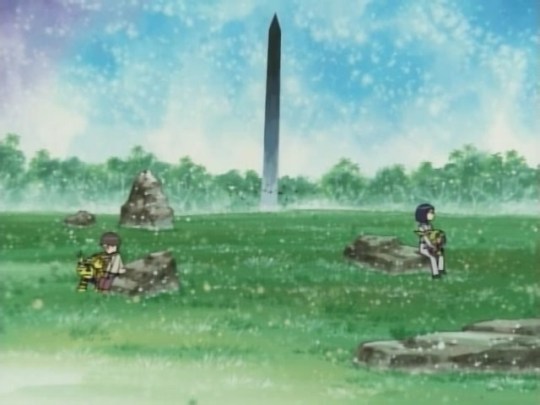
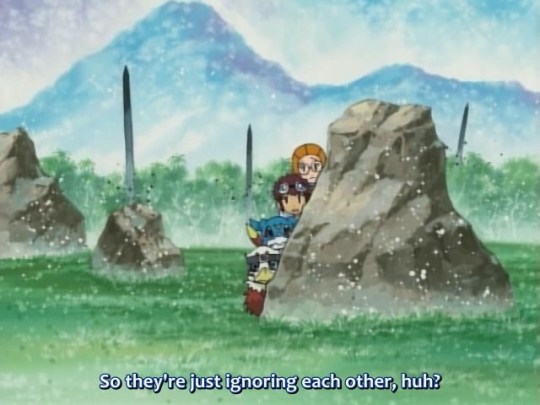
This is especially because, right after that, she recruits Daisuke into her plan to get Ken and Iori to get along -- in the end, when things really get serious, the two are incredibly like-minded (look at how in-sync they are when they scheme together).
30 is actually a surprisingly Miyako-centric episode, despite not ostensibly being one. For one, it says a lot that right now, her biggest priority is to get Ken and Iori to get along -- something that has absolutely nothing to do with herself. In episode 14, Miyako freely admitted that she had a tendency to jump to conclusions about people, and that she was shallow about aesthetics, but this is a very different Miyako from the one who harassed Daisuke for Ken’s autograph in episode 8, or immediately became distrusting of Digitamamon in episode 14. Instead, she’s simply just genuinely invested in seeing people she considers friends get along, and in a selfless manner -- one that has nothing to do with herself. She just really, really cares, a lot.
After all of the first-half hubbub of Miyako really having no idea of what to do with her emotions, the second half has her start channeling that energy into what’s always been one of her biggest strengths: checking on, connecting with, and caring about her friends. Daisuke may be an aggressive forward-thinker who can push everyone in the right direction, but unlike his predecessor Taichi, he doesn’t actually have particular charisma or leadership skills that can necessarily hold everyone together. In the absence of that ability, Miyako fills in for him, checking on the moods and feelings on everyone in the team and making sure everyone’s doing well. And that’s why she loses her temper and slaps Ken late in the episode -- because, really, she’s reached her limit on her “give him space” philosophy when he’s abusing it to be standoffish in a crisis situation, and, on top of that, she really, really did have a huge emotional investment in him.
Moving onto more Miyako in episode 31, her Jogress episode with Hikari, we get to see a little bit of the old emotionally compromised Miyako again, but -- much like the second Digimentals arc -- it involves the two of them acknowledging that both of them are not going about things the best way, and that there are things they can learn from the other.
Hikari: Miyako-san, you're a handful sometimes. Miyako: I knew that's what you thought of me... Hikari: But...I've always envied that. Miyako: Huh? Hikari: Because I can't be honest and say I'm scared or scream like you.
Miyako’s tendency to lose control emotionally results in her being insensitive much of the time, which she calls herself out on multiple times during the episode, and she can’t always be as “kind” as Hikari is -- but, on the flip side, her antics are something that can be a “light” (pun not intended) towards those who are falling in a bad mental state or into the darkness, and Hikari even acknowledges this when one of her trains of thought makes her break out into laughter. Miyako ultimately manages to get through to Hikari this way at the end of the episode, which results in a Jogress and mutual growth for both of them -- Miyako puts more thought into how to approach others (it’s pointed out at the end that she’s still thinking about understanding Ken and Hikari better), and Hikari gains more resolve and determination to fight against things instead of passively accepting her fate (she tells Takeru very directly at the end "I’m fine now. I’ll never go there again.”).
Iori and Takeru's Jogress is a little more complicated to the point where it spans multiple episodes, but a lot of it ends up having to do with the fact that the events of the BlackWarGreymon arc start really putting Iori's black-and-white principles into conflict -- it's wrong to kill something that's been proven to be alive, but it's also wrong to be evil. Putting a huge nail in that is that there's a stake in him forming a relationship with Takeru, but he doesn't really understand Takeru either -- the "two-facedness" he witnessed back in episode 19 scares even him, and he's so intimidated by Takeru that, in episode 35, he goes to approach Yamato about Takeru's past instead of asking the person directly. Takeru, hearing about this, complains that he could have just asked directly, but admits he understands why Iori did so.
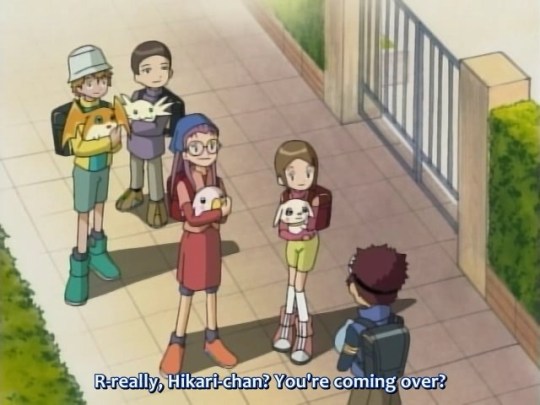
By the way, I should point out that episode 35 is the last time within the TV series that Daisuke is portrayed as having a particular interest in Hikari, and it’s just in terms of being slightly more excited that Hikari is joining his meeting. At this point, there are actual important things happening in the Digital World, and he needs to take care of Ken, too, and so...in the end, once again, Daisuke proves that he’s actually capable of putting aside those kinds of more shallow things when he really needs to.
On top of that, this is when the kids start actively working with Ken in the real world (and, if post-02 materials are any indication, continue to hang out with him even for social outings). The choice to have Ken live in Tamachi instead of Odaiba facilitated his isolation from the group during the Kaiser arc, and during around the third quarter they were all grouping up in the Digital World anyway, but the fourth quarter actually has the kids make an attempt to include Ken in their real-world outings despite the distance. Tamachi is not temporally far from Odaiba (approximately half an hour by train), but it’s a bit of a nuisance to get to, requiring crossing a bridge to/from the Tokyo mainland and paying extra for the Yurikamome. But at this point, he’s an important enough friend to them -- and them important enough friends to him -- that they’ll make it work.
At the end of episode 35, Iori finally decides -- to the point of recklessness, something that would have been previously very uncharacteristic of him -- to try and appeal directly to BlackWarGreymon to get him to stop destroying the Holy Stones so that they won’t have to fight. It’s emblematic of Iori’s heart being genuinely torn, because he’s having such a difficult time rationalizing all of these conflicting feelings. This comes to a head in episode 36, when Iori loses his temper at the rest of the group for “playing around”, but Armadimon snaps him back to reality to remind him that they’re tired and hungry, and this can’t be neglected. Iori himself ultimately becomes the one to proactively suggest that they take time to sit down and eat, indicating that -- little by little -- he’s starting to shift his thinking a bit, after being so incredibly stubborn for much of the series.
This is what leads to Iori and Takeru’s Jogress at the end of the episode, now that Iori is flexible enough in thinking to understand the emotional id behind Takeru’s mentality. And likewise, Takeru’s started to loosen up by 36, too --
Takeru: Sure, darkness is frightening, and we would feel at ease if we could get rid of it completely, but I'm sure that's impossible. Ken: Impossible? Takeru: Where there's light, there's always darkness. Hikari: The brighter the light, the darker the shadow, right? Takeru: Yes. That's why I think it's important not to lose sight of the light inside you, no matter how dark it is.
The thing about Takeru is that while he deceptively seemed more open and playful than Hikari for most of the series, he was actually bottling up a lot of emotions in a way not entirely different from the way she did. (Note how, despite how tied at the hip the two constantly are, they almost never actually talk about their thoughts on each other; it feels like a relationship where they implicitly trust each other but are practically reliant on that implicit trust to maintain that close of a friendship at all.) And he’s been keeping those emotions bottled up until they exploded in less-than-healthy ways, initially distancing himself from Iori. But being a lot more open about his thoughts on the matter allowed them to connect better, and eventually Takeru came to embrace a somewhat more reasonable stance on the matter after observing Iori.
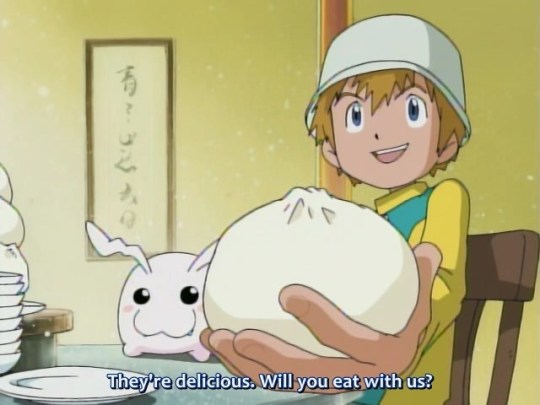
It also doesn’t seem like coincidence that this is the episode that ends with Takeru’s first major act of goodwill towards Ken.
This leads into episode 38, the Christmas episode. Fun things to note!
The episode opens with Daisuke and the other younger kids giving a “Christmas present” to their seniors in the form of letting them reunite with their partners. Remember how I said that the 02 kids always admired their seniors and looked up to them? Even this late in the series, the series does not shy away from the fact you’re supposed to see the 02 kids as their deferential juniors.
The Christmas party is, of course, notably, the first major moment of reconciliation between Iori and Ken, with Iori having gone through major harsh lessons about morality in the last few episodes, and Ken opening up more to the rest of the group. Said party is also yet another notable example of how much of a priority it is for the 02 kids to be “social life friends” and not just friends working as a Digimon incident team -- after all, having genuinely emotionally present friends is what Ken needs most in his life right now, considering that the party is treated as the first time he’s been truly happy in a long while.
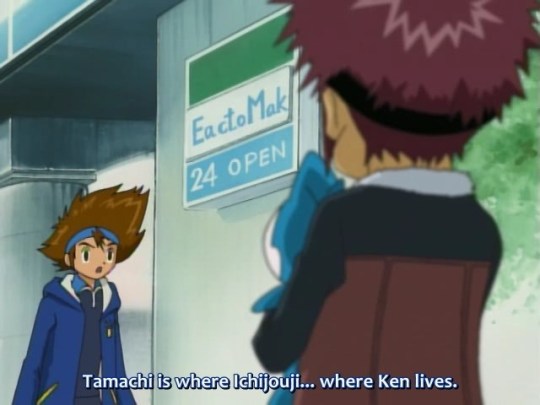
This is followed by episode 39, which is notable as the time when Daisuke finally commits to switching to given-name basis for Ken, and actually opens the episode standing against Taichi -- because he's so worried about Ken that he needs to go join him. This is something that's lost a bit in translation, but although Daisuke stands down against Taichi, he's not rude nor does he overstep his boundaries with his respected senior (he even opens his statement in polite-form Japanese) -- he's just saying, firmly and politely, "I'm sorry, but I can't go, I have to go help my friend." It’s a notable moment because while Daisuke has been becoming increasingly assertive and aware of what he really wants to do, this is the first time we’re actually seeing him refuse to defer to the very senior he’d spent so much of the series idolizing and looking up to.
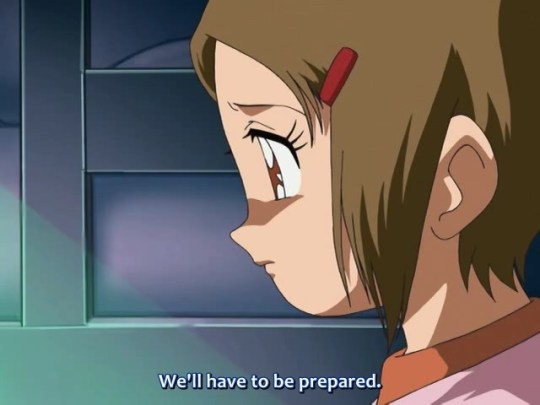
We get to episodes 43-45 (the Demon mini-arc), which is also the culmination of the 02 kids having to face the limits of pacifism. This tends to throw off people who are coming in from Adventure, since the Adventure kids ended up killing Digimon with a lot more ease in the original series, but it’s also important to make note of the fact that the episode itself deliberately portrays a gap in mentality between the Adventure and the 02 kids -- with Hikari torn between the two. It also creates an interesting subversion of expectations when Hikari, the one you’d expect to be more on the pacifist side, is the one who’s already accepted that it may be inevitable, whereas Miyako, the more aggressive and belligerent one, is the one staunchly against it.
The reason for this “paradox” comes out of a single line from Hikari in episode 44:
Hikari: You’re the one who saved him, Miyako-san.
The Adventure kids never liked killing. They were never enthusiastic about it -- it was just that they were almost immediately put in a situation where the entire fate of the multiverse was at stake thanks to some unambiguously evil Digimon who wanted nothing but wanton destruction. Even then, it was pretty clear that they never enjoyed it -- Takeru professed a desire to avoid fighting in Adventure episode 12, and the pacifist Mimi went through a breakdown in Adventure episodes 45-50 trying to avoid casualties. But one of the most important lessons Mimi learned at the time was that pacifism has its limits -- there’s no point if it ends up in more deaths than it saves, because at that point you’re adhering to moralistic principles more than you’re actually saving lives.
The fact that the Adventure kids and the 02 kids have a “different mentality” isn’t just happenstance, but outright embraced. Daisuke, Miyako, and Iori never had to actually deal with a conscious Digimon that was unambiguously evil for most of the series, and Archnemon revealing that her motives were pretty much nothing but wanton destruction in episode 29 was the first major warning signal to Iori that his pacifism might have limits. And during this Demon mini-arc, it’s not like these Digimon are threatening multiverse destruction or anything -- it really does seem like a constant “glimmer of hope” that maybe, just maybe, they can save people non-lethally. Alas, they can’t.
Daisuke, being someone who’s inherently practical-minded, starts entertaining the idea that push may come to shove as early as episode 25, and finally makes his first statement about practical limits in episode 43. But the more emotionally caught-up Miyako and Iori end up taking another episode to swallow it, and they don’t take it well. Most of the attention in 44 is given to Miyako, and it reconfirms that, despite her aggressive exterior, she’s emotionally sensitive and empathetic -- and while killing LadyDevimon is framed as truly the only thing that could have been done in that situation, Miyako is not faulted for being emotionally compromised, nor is Iori likewise when he faces a similar situation with Takeru and is forced to confront the people whose lives were at stake.
Episode 45, when Ken opens the gate to the Dark Ocean, doesn’t really have much to add on top of what’s already there, but this is basically “the point of no return” when everyone confirms their own emotional investment in Ken and understanding that he’s not just reformed, he’s genuinely struggling under the pain of what’s been happening -- and this is before they find out about the truth behind the Dark Seeds, and that Ken’s transformation into the Kaiser may have been supernaturally influenced, too.
It’s also interesting to see the different ways each kid reacts to Ken as they support him:
Hikari, the most outwardly compassionate, goes to support him the second she notices him in physical pain; Takeru notices that it might work, realizes Ken needs the support, and joins.
Iori and Miyako reflect on how Ken’s putting all of his efforts in, and lambast themselves before joining. Interestingly, given the circumstances behind what’s happened up until now, Iori and Miyako criticizing themselves take a different meaning -- Iori, who’d been scornful of Ken until recently, seems to be regretting that he distrusted him when Ken had been trying so hard, while Miyako, who had been open to him since episode 25, seems to be upset that she’s sitting there and not doing enough when he’s in all of this pain.
And Daisuke, of course, the most “forward-thinking” of them all, gives Ken a speech about what he’s done so far and reminds him that he’s already done more than enough for “atonement” -- which is, of course, what directly reaches Ken the most.
And when we get to episode 46, and the kids, now knowing about the Dark Seeds, hold a roundtable (and emotional support group) to discuss what to do about the Dark Seeds, Daisuke’s the one with the most spirit and energy about it, but...
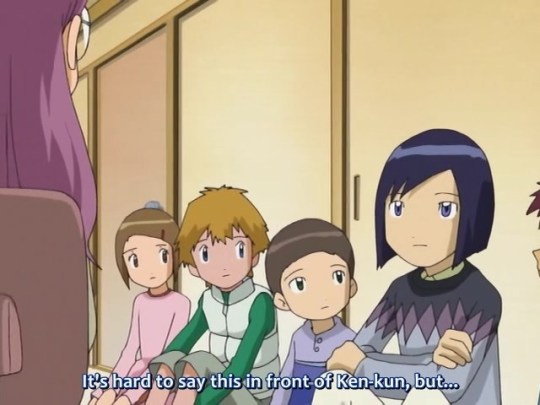
...the one actually leading the roundtable? Miyako.
Miyako: Sorry, that's all I can think of. Ken: Please don't worry about me. Miyako: (nods)
It’s subtle, but the scene in question does actually make a deliberate move in indicating that Miyako’s continuing to channel her emotional sensitivity and desire to go out of her way to help Ken -- of course, they all know how traumatic this is for him, but she’s the one who’s actively calling attention to how he must feel about it first and foremost.
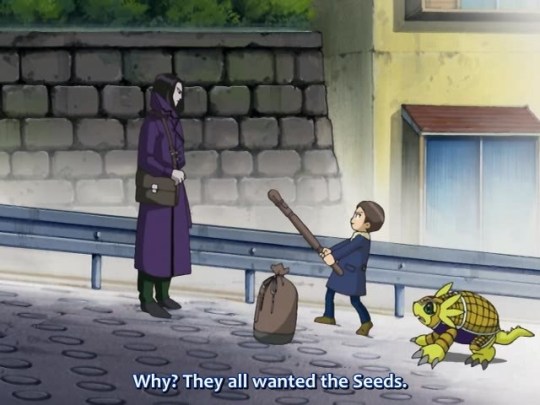
Episodes 47 and after end up becoming yet another major wake-up call for Iori (seriously, I do not understand why people claim he had no character arc when this wasn’t even remotely subtle) when he learns that Oikawa, whom he’d pinned as “evil”, has a deep relationship with the father he’d grown up idolizing so much, and it completely flips his world around -- even though he had started to get a bit more open-minded, he’s still trying to rationalize what should have been, in his mind, two diametrically opposite things. It fuels his confusion and desperate desire to understand more, not just about Oikawa, but about everything he’d thought about morality and why people turn to evil.
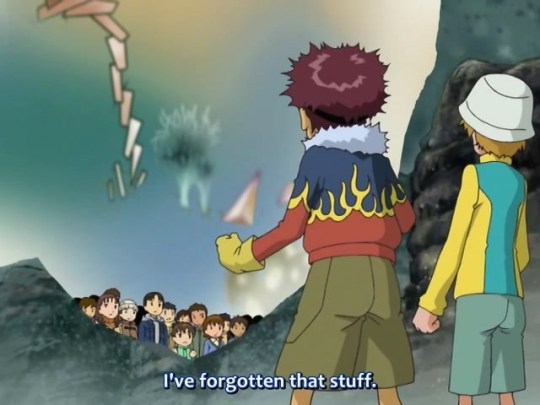
So we get to the final arc of the series, and it involves a confrontation with BelialVamdemon -- but said finale is heavily dependent on talking to the Dark Seed children and inspiring hope back into them. This results in a conversation where everyone talks about their career dreams, and Daisuke admits that he wants to be...a ramen chef, which completely blindsides even his friends.
What’s with this arc?, you might think. And moreover, why is Daisuke ending the series still kind of an idiot? Even Miyako still seems to be a bit of a mess and chaotic. Weren’t they supposed to be growing into dignified heroes, like Taichi and his friends were last series?
Well, here’s the thing -- the fact that the 02 kids end the series comparatively “undignified” is actually very inherent to the core theme of 02 itself. There were more than enough episodes that established that said kids are heroic in their own way -- caring about others, fighting on others’ behalf, and learning important lessons about what’s important to fight about. That doesn’t mean they don’t get the right to continue being disaster children while they’re at it.
Why?
Let’s look at a few official statements behind the creation and intent behind 02 as a series. From producer Seki Hiromi, from the Digimon Animation Chronicle:
That came from an idea I had while reading a newspaper article. I read a story about a nine-year-old boy going to Columbia University, and I thought, “This boy is going to college because he’s considered a genius, and everyone around him will be in their twenties, and he won’t get to have any friends his age. What kind of life would this boy end up having?”
Or some very interesting statements from head writer Yoshimura Genki from the 02 Blu-ray box:
When I was writing Ken Ichijouji, the main idea for him I used as a basis was the conflict between “the self that has to be a well-behaved child when adults are watching” and “being able to be oneself”, and the pain that came from it as a result. So for instance, in the same way as the Pinnocchio fairytale, or the short story A.I. that was adapted into a movie, or many other works, there are probably universal worries that all children feel as they grow, but also, there were ongoing unimaginable, atrocious incidents happening with children at the time, and perhaps it was those social conditions that gave me a hint on what to do. I think I had some thoughts that I wanted to convey to the children who were living through that time. I was given the opportunity to put those kinds of feelings, as much as I liked, into episode 23, and I am truly grateful to all of the staff, including the director. ... Also, this is about Daisuke’s character, but I believe I paid particular attention to making him “a child who could be himself”. He has no special talents, and although he’s clumsy and scatterbrained, I wanted him to be someone whose strength was in his straightforwardness, and wrote him that way.
Lying underneath the entirety of 02 itself is a theme about “children who are not allowed to be children”. Or, in other words, the pressure placed on children to be “talented” and “dignified” and “well-behaved”, often imposed on them by well-meaning parents who are unfortunately taking the opportunity to stroke their own ego, robbing them of the happiness and mental freedoms they should have as kids.
Ichijouji Osamu and Ken, who were placed under the pressure to be “genius children” and cracked under the pressure to please their parents. Oikawa Yukio, who was cut off from the Digital World in childhood by a well-meaning Hida Chikara, worried about his son getting into “foolish” talk. The Dark Seed children, who also fell victim to similar pressures that Ken did, and lost hope for life unless they could force themselves into that mold.
Takeru: If you want the Digimon to exist, if you believe in that, they will. Just like our feelings...Just like every child having the power to make their dreams come true. Keiko: That's just childish. Daisuke: You all have dreams for the future, don't you? Noriko: Dreams for the future? Takashi: I've forgotten that stuff. Daisuke: No way! You must have one! Takeru: It's nothing to be ashamed of. Takashi: Then, what's your dream? Daisuke: Mine? Mine's a ramen shop. I love ramen! I'll become the world's best ramen maker! Ken: I had no idea... Noriko: Well...actually, I wanted to be a kindergarten teacher. Hikari: Me too. Daisuke: What about you guys? Takashi: A baseball player! Keiko: I really want to be a pastry chef. Hiroshi: When I said I wanted to be a manga artist, everyone laughed, so I gave up... Takashi: We all had aspirations, and at some point we thought that wasn't allowed...But we were wrong, right? Daisuke: Let people say whatever they want! Noriko: You're right, we should be free to dream. Miyako: Not just dreaming. If you work hard, your dreams will surely come true!
Notice something about all of these careers mentioned? They’re all the kind of “overly childish” “wild dream” “undignified” “too simple” kinds of dreams that an average parent might be uncomfortably quick to shoot down because that’s “not good enough”. These are the kids who willingly accepted the Dark Seeds; they, much like Ken, probably grew up under parents who prioritized school performance and other “societally dignified” things that ended up eating away at their happiness.
02 has a lot of different themes, but the one that lies in its undercurrent from start to finish is “so why does a child have to be this way? As long as they still understand what’s important, do they have to be dignified people? Why can’t they just be free to have dreams and be themselves?” And Daisuke and his friends are there specifically to stand up against this mentality, and to remind Ken and the other victims of it that it doesn’t have to be this way -- that it’s okay to be your true self, and be a child, and not succumb to all of those arbitrary, shallow standards people put on you. Even if that means you’re still a bit of a chaotic disaster at the tender age of eleven.
Digimon, in the Adventure and 02 universe, have always been treated like a part of the self (they were literally conceived as a physical manifestation of the soul), but in 02 they gain an extra meaning of representing “the inner, deepest part of yourself that represents your wildest ‘childish’ dreams”. The symbolism of Ken spending the first half of the series trying to reject Wormmon for being “weak” -- in other words, rejecting his own kind-hearted self for not being the kind of “strong” entity he was pressured and groomed into being -- is not lost, nor that of the Dark Seed children gaining partners when they reconnect with their dreams and wishes, nor Oikawa finally, finally meeting his partner when he comes into contact with the past he’d really lost (and especially not the fact that his attempt to reclaim shallow reminders of said childhood involved trying to make his own Digimon).
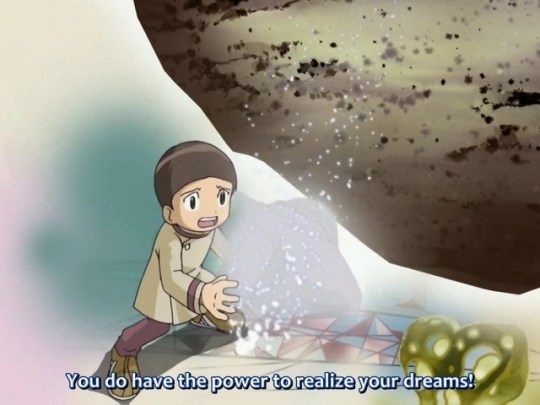
And notably, the series’s finale (prior to the epilogue) ends not on Daisuke but on Iori, escorting Oikawa to the Digital World despite how completely impossible it would have been for early-series Iori to even entertain the idea, finally coming to truly understand what happened with him and being most personally impacted by his death.
But in any case, where are we with the characters? We’re here to talk about how they’ve grown and developed over the course of the series. Let’s recap:
Daisuke: Started off the series as an abrasive kid with more bark than actual bite, constantly deferring to others and easily deflating, relying on shallow sources of validation like wanting attention from Hikari; gradually gained an ability to identify what was important and put his foot down for it, embraced his forward-thinkingness to reach out to a heavily troubled child as a friend, and ended up surrounded by a friend group that loves and respects him.
Miyako: Started off the series as a shallow, flighty girl with poor control over her emotions and difficulty in appreciating the gravity of things; came to channel her emotional range into empathy for others and compassion, bringing other people together and taking care of them.
Iori: Started off the series as a straight-laced but too principled child who stuck to “rules of what’s right” not only in morality but also in way of acting; started to appreciate the emotional nuances and heart behind why people do what they do and how it’s possible to be more flexible in “doing good”.
Ken: Well, his character arc is pretty obvious, but -- again, while his arc of learning to forgive himself is well-known, less often pointed out is that it centers very heavily on not only having penance but also not being too hung up on the past, and the futility of drowning in self-pity and regret instead of choosing to take responsibility and act more productively going forward.
Takeru: Started off the series as a seemingly mature but deceptively inscrutable character whose duality made him hard to approach; eventually opened up with the help of others and showed a capacity for being more flexible with his personal grudges.
Hikari: Started off the series emotionally repressive and passive to the point of self-destruction; eventually embraced connections with her other friends and became more active in taking a stand for herself.
Hey, not bad!
And, again, this is not a series you should be reading in terms of “self-awareness” in the same way Adventure was, but in the sense of their “relationships” and how they interact with others. By being less abrasive and more assertive, Daisuke gained the respect of his other friends. By putting her emotional capacity into caring about others, Miyako became someone who holds the group together. By learning to think a little more flexibly and be less stubborn, Iori arrived at a position where he could more easily sympathize with others in the group. Takeru and Hikari both moved from their previously relatively inscrutable positions to ones who could more effectively interact with and open up to others. And Ken, of course, became someone who managed to integrate himself into a group of true “friends” despite everything he had done against them in the first half.
This, in the end, is how you get what’s one of the tightest friend groups in Digimon history. In the end, the relationships themselves are almost like characters of their own that got development -- I say very often that you could take two of the characters and have an excellent scope of how they’d interact and play off each other by the end of the series. And although they end the series as possibly one of the most shameless, undignified disaster groups out there...they’re certainly still heroic, and in any case, given the lessons they learned throughout their own series, they probably wouldn’t have it any other way.
251 notes
·
View notes
Photo
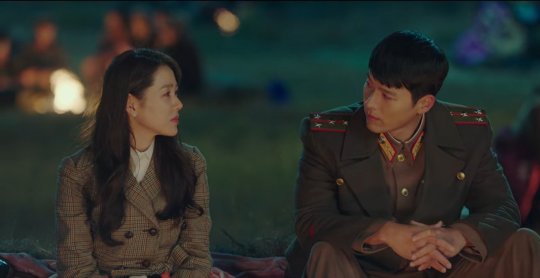
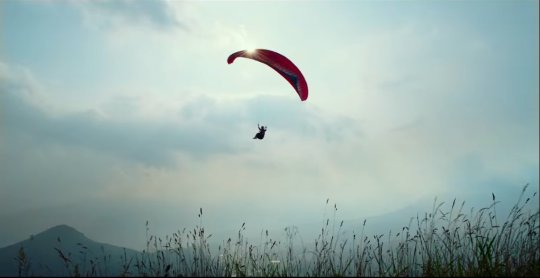
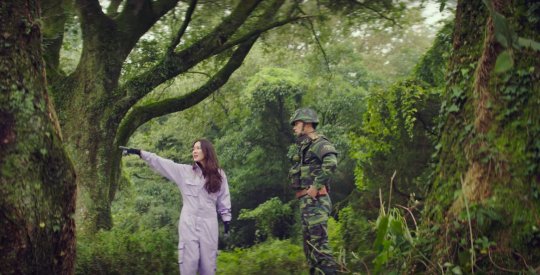
My favourite thing this year has been the Korean drama Crash Landing on You (2019-20).
It has something of a ridiculous title (I’ve ended up calling it Crash Landing or sometimes just Crash). But, to be fair, North and South was already taken.
“I can go to Africa and even Antarctica but not here. It’s a shame that you live here.” “It’s a shame that you live there.” -- episode three
To my great amusement, every month or so, Netflix has sent me an email that’s said: “Don’t forget to finish Crash Landing on You” or “Remember this? Watch it again: Crash Landing on You” or “Rewatch your favourite moments - Watch it again: Crash Landing on You…”
And I’m like: NETFLIX! Seriously, WHAT do you THINK I’M DOING?
I have now watched Crash Landing on You five times.
There are several reasons for this:
I successfully dragged other family members down this particular rabbit hole, and in a pandemic season, when things have been unpredictable (or cancelled), rewatching Crash Landing has been an appealing and comfortably-familiar distraction, as well as the source of many, many long, analytical fandom-y conversations, which has been fun.
I needed to watch it more than once to straighten out all the pieces of the story in my head. With 16 episodes, each over an hour long, it’s one of the longest stories I’ve ever watched. I’ve seen other TV series with more episodes, but nearly all have been much more episodic, rather than telling one continuous story.
I kept noticing details that I’d previously missed because I’d been focused on the subtitles or that I hadn’t properly understood some cultural nuance. And some things are ambiguous in translation -- in a good way, a fodder-for-discussion way.
I have ALWAYS rewatched (or reread) my favourite stories. And Crash Landing fits right in with those. Someone in my family described it as: “Like Lord of the Rings on steroids!” However, I think it actually has far more in common -- visually and thematically, and also in terms of my willingness to discuss the characters as if they were real people -- with my favourite historical dramas.
In terms of story, Crash Landing is easy enough to summarise: A South Korean businesswoman is paragliding when a freak storm blows her across the border; she’s discovered by a North Korean captain, who hides her and helps her get home.
But I’m going to need more words to explain why I fell in love with it.
It is fascinating and, first time round, tense and unpredictable. It’s funny and very meta -- very aware of the tropes it’s playing with and of parallels and contrasts within the story. It’s visually and aesthetically pleasing, and the soundtrack grew on me.
There are a number of coincidences and a few ridiculous fight scenes, but the emotions are intensely real and so are the consequences. It has camaraderie and found-family and thoughtfully-complicated family relationships. There are characters I love, and characters who surprised me, and so much time given to character development! It’s romantic. There’s a fake engagement (a favourite trope of mine) and while I’m not a fan of love triangles, I liked how this quadrangle-tangle is handled. And the obstacles to the romance are satisfyingly realistic; characters have sensible reasons for the choices they make.
I love how the story uses flashbacks, particularly the post-credit scenes.
The final episode isn’t perfect, but given that a perfectly happy ending would, realistically, require the reunification of north and south, I thought it came very close.
Let me elaborate.
Cut for sheer verbosity, rather than spoilers. (I’m not allowing myself to list spoiler-ish examples or dive into analysing my favourite scenes, because then I wouldn’t just be here all night, I’d be here all week).
⬦ Fascinating, tense, unpredictable: I knew almost nothing about life in North Korea, so that was fascinating and made the story harder to predict, as I couldn’t anticipate what options the characters had or what obstacles might arise. And that isn’t the only reason I found it tense -- at different times, different characters are greatly at risk if discovered; there are occasions when characters are in danger of physical violence or are injured; and they have a couple of dilemmas to which there are just not easy solutions (See also: Obstacles for romance).
While I’m on the subject of the setting, although I cannot judge how accurate this portrayal of the north was, it’s portrayal of people as people was incredibly convincing. It’s a society where people have differences in personality and in circumstances. There are orphans begging in the market, people who can afford to stay in fancy hotels -- and a lot of people somewhere in between. In the military village, people have varying attitudes, tastes in clothes, privileges, standards of living, etc. Their lifestyle differs from that in Pyongyang, and also in other parts of the country. Amongst the military, some men are compassionate, some are corrupt and some are not obviously one or the other.
Moreover, it’s clear that corruption and villainy isn’t just in the north. In the south, as in the north, we see a range of humanity -- selfishness, good friends, complicated families, happy marriages, criminal behaviour, and so on.
I’ve read an article or two suggesting that the least realistic aspect is Ri Jeong Hyeok being such a sympathetic and honourable officer. I think it’s interesting that he clearly isn’t a typical captain -- he wanted a different career, he’s spent time studying overseas (in a democratic country), and, perhaps most importantly, his father’s position gives him protection from pressures many others face. He has the privilege of being able to afford to act with integrity, and of encouraging such behaviour in the men he leads.
⬦ Humour and meta: I’ve included these two together, because so much of the story’s self-awareness and intertextuality is humorous. I am very amused by so many things -- the village women’s interactions, Se-ri’s wit and banter, Jeong Hyeok’s facial expressions, the duckling's reactions, the way Ju Meok keeps comparing things to South Korean dramas:
Ju Meok: “I haven’t seen any drama characters that don’t fall in love in that situation. That’s how they all fall in love.”
(Because my knowledge of Korean drama is limited, there are a few cameos and references which I suspect would be amusing if one was in the know. The exception is the taxi driver singing, who was funny even without recognising the actor.)
I love the commentary that comes from all the moments when other characters witness the unfolding romance. Others’ reactions are often memorably hilarious -- some of my favouritest scenes fall into this category. (The customs officer! Jeong Hyeok’s dad!) They introduce humour and self-awareness into these moments, allowing the story to acknowledge “Yeah, we know these two are being ridiculous/sappy/emotional”. These moments reveal people’s attitudes towards displays of affection, particularly in the north, and their different attitudes towards Se-ri and Jeong Hyeok’s relationship.
And as their relationship changes, Se-ri and Jeong Hyeok’s awareness of being watched and commented upon changes, too.
Which leads me to…
⬦ Contrasts and parallels: So many scenes which echo/parallel earlier scenes. Most obviously, this allows the story to compare and contrast the north and south, but it also shows changes in time, differences between characters, and differences in relationships too. Sometimes all at once!
It means some plot developments weren’t totally unexpected -- it was Oh, of COURSE, we’re going to now see that character in this situation! or OBVIOUSLY we now have to see what this is like in the south!
But I thought it was really effective storytelling and I so much enjoyed spotting and analysing these moments.
⬦ Yoon Se-ri and Ri Jeong Hyeok: These two are the heart of the story and there are so many things I love about them. Like how, even though Se-ri is dependent upon Jeong Hyeok to hide and help her -- even though they’re initially hesitant about a romantic relationship -- they quickly become very protective of each other. Often to the point of willingly risking their own safety. Often to the point of exasperating the other. It’s great.
That’s not the only thing they discover they have in common. They share some interests. They’re both highly intelligent, driven, successful leaders (he’s a captain, she’s a CEO) who are very private, lonely people carrying around grief about their family and their past. Neither of them likes to reveal their emotions -- he tries to conceal his by suppressing his facial expressions and avoiding answering questions, while Se-ri hides behind play-acting.
I like watching Se-ri trying to get to know Jeong Hyeok. She isn’t deterred by his silences (unlike someone else) and she keeps the conversation going even when he doesn’t respond. She watches him closely, and says or does things to provoke a reaction. Poke, poke, poke.
And the time they spend together is really revealing. They share meals, they share a house. They see how the other responds under pressure, but also in various social and domestic situations. They see each other in a range of moods: calm, happy, grumpy, scared, tired, upset, unwell. Crash Landing takes advantage of spending sixteen episodes with these characters. Going through so many different experiences together, they learn a lot about each other -- about each other’s values, tastes and temperament -- and this means the audience gets a deeper, more nuanced understanding of who they are, too.
Se-ri and Jeong Hyeok are also well-matched in how they show they appreciate each other -- she delights in giving presents, and he is quick to notice things Se-ri might need or like.
And it’s very satisfying when they open up, or when they cry in front of each other, because you know that they don’t do this lightly or easily.
⬦ Obstacles for romance, love triangle quadrangle-tangle: I appreciate that the obstacles in this story are not contrived or fueled by needless misunderstandings. Se-ri and Jeong Hyeok have really solid, sensible reasons to be hesitant to first recognise, then admit to, and then act upon, a romantic attraction. Even once they realise that getting Se-ri home is going to take longer than they’d hoped and she’s pretending to be Jeong Hyeok’s fiancée, romance between them is still a road that leads nowhere. She isn’t safe staying in the north and he would endanger his family if he defected to the south, and they both accept that. And they’re reticent about sharing vulnerable feelings, and Jeong Hyeok is actually engaged to someone else.
But once they really open up to each other, the narrative conflict revolves around their circumstances, rather than doubts or misunderstandings they have about each other. Because the situations they face are dangerous and difficult, with no obvious or straightforward path to a happy ending, there’s quite enough tension to drive the story forward. They still have a couple of misunderstandings, but I like how they handle those, and I like that they don’t have more of them.
As for the love triangle, it doesn’t have the angst of someone torn between, or even attracted to, two people. Jeong Hyeok’s engagement has been arranged. Having feelings for someone else doesn’t change the foundation of that engagement, nor the pressure to please his family. He doesn’t love or know his fiancée -- not well enough to risk revealing Se-ri’s true identity to her. He’s honest with Se-ri and he makes an effort with Dan.
(I have a theory that, if he had been in love before, he might be quicker to recognise how some of his behaviour towards Se-ri fosters intimacy and sends her messages he doesn’t intend, but this is all new for him.)
He tries not to mislead or hurt Dan, but she’s hurt nonetheless, and I like that Crash Landing doesn’t gloss over that. It explores why she’s hurt, why she’s so reluctant to let him go and why their relationship never really worked. (Neither of them are good at communicating with each other, and I think she takes some of the things he does for her for granted, rather than recognising them as overtures and as opportunities to get to know him better.)
Dan is not just a romantic rival, nor a narrative complication, but a person whose concerns and desire are taken seriously, and who is given space to grow.
Which leads me to...
⬦ Surprising characters, thoughtfully-complicated family relationships: As mentioned, Crash Landing takes advantage of the amount of character development 16 episodes allows, and not just for its lead couple. I was surprised by how much my opinion of certain characters changed, as I came to understand them better.
The character I was most surprised by was Gu Seung-jun.
Each time I’ve watched this, I’ve liked Dan more. I have a lot of sympathy for her now. I also like her mother, even though she’s embarrassingly over the top, because she cares fiercely about her daughter and about advocating for her.
Se-ri’s dysfunctional family are more nuanced than I expected, too. In particular, I love the attention the story gives to Se-ri’s relationship with her step-mother. I was expecting Se-ri’s father to play a larger role, perhaps because he’s nominally the one with the power and influence, and at first Se-ri’s mother seems so passive. But it was really interesting to understand where she’s coming from, why her relationship with Se-ri is broken and sad. The steps the two of them take towards rebuilding their relationship are believable.
(On a related thought, I appreciate a lot of the choices this makes in addressing these women’s mental health struggles. One or two moments arguably could have been handled better, but on the whole it’s realistically optimistic, with enough detail so that we understand the seriousness -- the impact it’s had on these women’s lives.)
⬦ Camaraderie, found family and the ducklings: Se-ri doesn’t spend as much time with the village women as she does with Jeong Hyeok and his soldiers, and when she does, she’s play-acting, in order to keep her identity a secret. But I like how they nevertheless support her, and how meeting her sparks change their dynamic with each other. They grow closer and become much better at supporting each other. It’s really heartwarming.
We gave many of the characters codenames, so we could discuss them when we were still learning their names. (I was surprised by how long it took me to learn some of the characters’ names. Because so many were unfamiliar to me, they were harder to remember; I wasn’t always sure, from just reading the subtitles, how all of them were pronounced, and sometimes it was hard to separate the sound of the names from surrounding sentences, especially when, due to honorifics and titles and so on, subtitles don’t always match exactly what is being said.) Jeong Hyeok’s men are “the ducklings”, inspired by something I saw on Tumblr: Gwang Beom is “Handsome Duckling”, Ju Meok is “Drama Duckling” and Chi Su is just the sergeant.) I love how they function as a found-family, especially in contrast to Se-ri’s real family. They’re funny, loyal and caring, and in spite of their different personalities, work well together as a team. I enjoyed seeing the different relationships they have with each other, with Jeong Hyeok and Se-ri, and how some of those relationships change. And they’re so protective they are of Eun Dong!
Man Bok has an interesting arc -- I could have mentioned him under Surprising characters. I really like how he fits into this story, how he’s connected to the mystery Jeong Hyeok is investigating, how he becomes involved with the rest of the characters and has these moments when he plays a significant role. Or gets to be funny. I like the contrast and parallels too -- he’s in a different place in his life to the ducklings, and he gets opportunities to revisit past choices he regrets.
And I’m trying not to write essays about all the characters, and it’s ahhh, I have too many thoughts and feelings about them all!
⬦ Satisfyingly realistic: I like how -- one or two ridiculous fight scenes and an unrealistic paragliding scene aside -- things which happen have believable consequences. Particularly emotionally. We see men cry! A lot! And it always feels like a genuine expression of emotion, not gratuitous or overwrought. (Well, okay, there’s a very minor character who’s a bit over the top but he’s very minor.)
When one of the characters is gravely ill, she looks it, I found it oddly satisfying that she doesn’t have to be pretty all the time.
And I wasn’t sure if this belonged here or under “Visual details” but I love the attention given to Se-ri’s clothes. She cares a lot about fashion and in the north her clothing choices indicate that she cares a lot about her appearance, while making do with a limited wardrobe and still dressing for warmth. (I’m happy to handwave that she seems to have more clothes than would realistically fit in those shopping bags.) I appreciated the practical streak, and, as winter wore on here, became envious of one of her outfits.
I don’t personally like the style of Se-ri chooses for work, but it’s different it is from what she wore in the north and from what she wears at home -- her power-dressing is like a uniform or a statement of persona she projects in her working life, and not necessarily a reflection of her personal tastes.
⬦ Visual details: I love so many of the visuals. Gorgeous scenery, interesting settings and clever framing for significant scenes. The sky, a place without borders, often becomes a focus and there’s a thematically-relevant flight motif -- paragliders, birds and kites.
I did not start noticing the product placement until a rewatch, when I stopped to think about how often they went to Subway. The first time, it just seemed like a commentary on south-versus-north, and then I was just baffled-yet-amused by it all. (That sort of thing does not make me want to eat fried chicken...)
⬦ Soundtrack: The first time round, I liked the instrumental score and the presence of piano music actually in the story. As I kept rewatching, the rest of the soundtrack slowly but steadily grew on me, and I found myself liking the songs more and more.
Now I not only recognise them by name, I can recall most of them well enough to hum them and know which scenes they’re associated with. Which is a lot harder when the lyrics are in a language I don’t speak and so I can’t use them as a prompt for memory.
⬦ Flashbacks: Instead of “previously-on” segments, Crash Landing employs lots of flashbacks whenever it wants to remind the audience of something.
Sometimes, instead of just repeating part of an earlier scene, it takes the opportunity to show the same moment from different angles or from a different character’s perspective, or to juxtapose it with a different scene or to introduce new information. This was really effective. And when flashbacks were a simple repeat, I was usually happy to revisit important moments in the story (and sometimes, having a different person translating the subtitles meant there was a slightly different perspective on the dialogue).
Then there are the post-credit flashbacks, quite a few of which take places years earlier. I love how they’re puzzle pieces about the characters’ pasts and the connections between them.
⬦ The end: The first time round, after watching the penultimate episode I was so engrossed in the story and so invested in the characters that I had trouble sleeping and I went around the next day with this tight, anxious feeling, unable to get the story out of my head.
The final episode is an emotional rollercoaster. SO. MANY. FEELINGS. There’s one particular scene which packs a powerful punch -- it’s exceptionally emotional and beautifully filmed. I love it, but I’m glad we get the aftermath too.
It isn’t a perfect ending, but as I said, I don’t think there was a perfect ending was possible, not one that was both realistic and satisfying. But this comes very close. In the very final scenes, not everything is resolved or explained, and I like how that ambiguity is open to interpretation -- I like that there are some gaps for the viewer to fill in for oneself, however one prefers to imagine the characters’ lives going forward.
I know I could easily write another four thousand words about this story -- there are aspects I haven’t really discussed but this seems like a good place to stop. For now. I really like this story. I expect I’ll watch it all again soon.
53 notes
·
View notes
Text
She-Ra’s like, really good, people
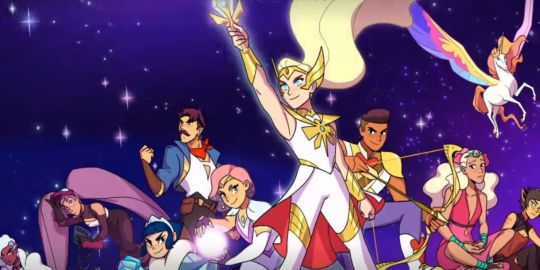
It’s been over a week since She-Ra season 5 came out and I binged it and this is not going to be coherent but I just want to rant about it a bit before writing some more structured metas. I deffo wanna write about Catradora and how I think SPoP is the true spiritual successor to the Avatar.
But first, let me just scream about how good this show is. I already started rewatching it, pretty much straight after finishing it, and I don’t rewatch tv shows often. The exception is Avatar (seen it like 15 times) and sitcoms. But She-Ra is so layered that I felt like I needed to watch it again just to appreciate the dynamics even more.
I already enjoyed the first season but it kept getting better and better. I’m not in love with the art style and it’s definitely for a younger demographic overall than my other favourite animated shows, but like any good kids’ show it balances tone well. It doesn’t talk down to its target demographic but also includes more traditionally mature themes in a digestible and entertaining way. Not all the jokes landed for me but as the series went on I learned to appreciate the tone and the type of humour She-Ra goes for.
It’s funny to me because this is definitely the type of show I would have rejected as a kid, with all the princesses I would have deemed it “too girly” and therefore not for me because screw gender roles. There’s a degree of internalized sexism to that, for sure, a rejection of the feminine because it’s always been seen as less somehow. But there’s also a truth that, at least in my childhood of the late 90s and early 00s, children’s media targeted at girls often had a poor quality to it, at least when compared to “boys’ stuff”.
She-Ra is not only a clever, heartfelt, complex story, it also transcends that binary of having to be either for girls or boys. I know most of modern animation rejects that as well, but She-Ra embraces so many traditionally feminine qualities while also going beyond gender roles and even the gender binary. This show is so queer, man, and I love it. It’s especially impressive when you consider the source material that was literally just the girly version of He-Man. I have no beef with 80s She-Ra, haven’t seen much of it, but this is such an upgrade.
That being said, I would have loved to watch She-Ra as a kid. I’m so incredibly envious of kids, aged around 10, who get to watch this show as they’re growing up. But I am so, so, so happy for them and for the future of animation that shows like She-Ra can be made now, that they’re being made. I’m going to go into spoilers soon, but just before that: She-Ra’s a perfectly enjoyable show in many aspects. I think the worldbuilding’s pretty cool, the story feels coherent and planned out, it’s lighthearted and so genuine. That’s the word that I ultimately choose to describe the series: genuine.
I feel like so much of TV aims to be dark and gritty nowadays, animation included, and though that’s slowly turning to dark comedy or a balance between fun and serious, it’s still the norm. At some point in the last decade, creators became terrified of being judged as cheesy. Even something like the MCU bathes in bathos to avoid being cheesy. But She-Ra proves that creators shouldn’t be afraid of being genuine, of basing characters and storylines on the simple power of love. Like, it’s such a cliché trope but I think that’s mostly because it has become stale.
Noelle Stevenson has talked about the importance of love in her story and I’m so grateful for that. Through, She-Ra, she’s truly proven how powerful love can be in a story and how it doesn’t have to be cheesy. It’s just so unabashedly genuine. The power of love and friendship literally saves the day several times but it’s always so genuine and more importantly it always makes sense that it doesn’t get boring. If the foundation wasn’t there, then I’d say “well this is just super cheesy”. But the show makes a point of building relationships and making them the focal point of the story.
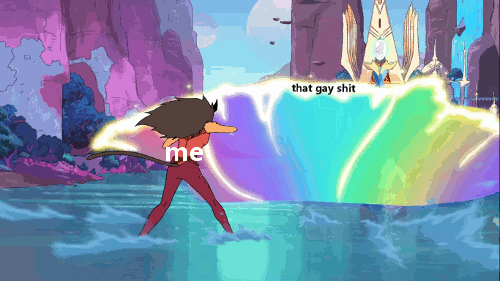
Alright, so, spoilers because I need to talk about character arcs and THAT KISS and just everything. I really need to write more in depth about Adora and Catra and their relationship but for now I feel like it’s so important to appreciate how they’re developed. Everything from their shared childhood to their trauma with Shadow Weaver and the finding their way back to each other, it’s just *chef’s kiss*. It’s so well-written and believable. Ngl, I do have some minor issues with Catra’s redemption arc. Let’s just say that on a scale from Kylo Ren to Zuko, she’s definitely closer to Zuko. I also appreciate Shadow Weaver’s death scene and how it allows them to move on. I didn’t see that one as Death as Redemption and it shouldn’t be. Again and again the show made it clear that she was abuse towards both girls and nothing will negate that.
From what I can tell, the fandom really latched onto Catra, even when it wasn’t clear whether she’d get a redemption arc. I think that’s important, because unlike some characters in animation, Catra’s actions were almost always framed appropriately. There was always an understanding as to where she’s coming from, how she’s acting from a place of hurt, and yet her actions weren’t justified. They weren’t suddenly all okay just because she’s hurt, too. I especially loved in the season 3 finale when Adora was allowed to finally say no, to say that Catra’s actions were not her fault. That season as a whole was beautiful, like, episode three when Adora’s struggling so much and Catra has the opportunity for a better life but she still fails to choose her own happiness because she’s too bitter over SW and Adora? It’s poetic cinema. I love that angst, so well done.
It would be so easy to misfire in Catra’s storyline and either a) write off all the awful things she does because she’s just “misunderstood” or b) irredeemably stuck in her abusive environment with no hope of escape. They balanced quite well there and managed to handle such a complex character with delicacy. I’m quite happy with how Catra was portrayed because on the one hand, she’s painfully relatable to me and I assume to many others. The audience can see their own mistakes reflected in her character because we’ve all been too stubborn, done things out of spite, refused to acknowledge that we were wrong because we were hurting so much. At the same time, I always felt like the show gave me enough space to judge Catra’s actions and acknowledge that she was in the wrong. I honestly think I would have been a better adjusted teenager is if saw this show just before my angsty years, lol.
I’m going to write more about Adora at some other point but I love how vulnerable she’s allowed to be. Protagonists never used to be my favourite characters because they all seemed the same, with two major categories: the stereotypical male hero who can do no wrong or the angsty boi who can be shitty and the text still frames him as awesome. It’s only recently with series like The Legend of Korra and She-Ra that I go “damn, protagonists can be like that, huh.” Adora is a dumb jock who tries so hard and she deserves all the hugs in the world.
Also, Catradora? Breathtaking, amazing, groundbreaking. No doubt She-Ra needed shows like Adventure Time, LoK, Steven Universe and the likes to pave the way but still, it went there. I saw people be anxious about whether they were gonna be queerbaited, but I always, idk, knew? Trusted? That She-Ra would follow through. I didn’t wait six years for Bubbline to happen for Catradora to not get their big damn kiss. The series has been so effortlessly queer from the get-go that it just made sense that they were always heading there. I did see a gif of the kiss before watching s5 and ngl, that spoiler kind of bummed me out in a way that I wanted to be surprised. But even before I saw that I wasn’t worried. And the context of their journey in season 5? That cannot be spoiled by a simple gif. You have to experience that to fully appreciate it and that is the marker of good storytelling.
I understand that, though this should be the norm by now, Noelle Stevenson still had to be smart about how she approached the execs and she wasn’t sure this could happen. I cannot tell you how happy I am about what she said regarding how Catradora was so integral to the story that the execs couldn’t not allow it. That’s so brilliant, and it feels so natural in the story. Queer love saves the day and it’s not ambiguous, it cannot be censored because you lose a part of the story without it. You did it, Noelle, you funky little lesbian, what an icon. I can’t wait to see more stuff from her.
In other news, I appreciated other characters as well, like how all the princesses got to be different and awesome in their own unique way. Season 5 was great for so many characters, Mermista got so much to work with and Spinnerella and Netossa got so much more characterization than in previous seasons. Glimmer continued to be the third most important character in the story and I’m happy about all the relationships that also got to be canon. Good characters and dynamics all around, no wonder since the show is built on that.
Such a satisfying conclusion and one that makes you feel like this is just part one of a much bigger story. Such genuine, heartfelt moments, well-developed characters, complex themes explored in a respectful and digestible way, and such an unapologetically fun show. Melissa Fumero as a side character? Yes please. Catra’s new haircut? Heck yeah! She-Ra’s new design? Oh my.

I’m not even like, super into She-Ra, and I usually don’t write so much about things I only watch casually. But this show is so good and important that I had to rant. And I will write more about it eventually, but for now I needed to get all of this out. I’d give it a better structure but if I really get into I might never end up posting it so for now here, have this ramble of love. She-Ra, of all shows, deserves that.
#she-ra#spop#she-ra and the princesses of power#catradora#spop spoilers#my thoughts#that's pretty much it for now
144 notes
·
View notes
Text
Flashworld (Ralph Dibny x Reader)
Rating: G
Summary: During a storm, a freak accident sends you into a very familiar world - one you happen to watch every week on TV - and come face to face with a member of Team Flash.
A/N: As soon as I read this request, it made me think of the beginning of Netflix’s Dramaworld (and if you haven’t seen it, I highly suggest checking that out).
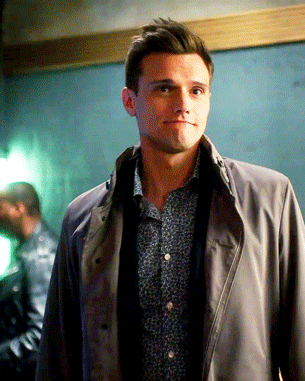
“Oh my God, Ralph’s first super suit!” you exclaim to yourself, with a laugh. “It really was terrible in season four.”
Holding your phone in your hand, you are so into this episode of The Flash. It’s one you’ve seen before, obviously, but with your intense rewatch of the series, nothing would distract you from the small screen.
Not even when you should be cleaning up on your late shift at work. And truth be told, you kind of don’t want to leave the building yet. That storm outside is pretty nasty...
Everyone had gone home already, the doors are locked, and as you clean up everyone’s mess from earlier, you still have your phone in one hand. The Flash blares on.
“Ralph had such great character development,” you continue to talk to yourself. “He’s such a sweetie on the inside. Ugh, look at that smile!”
Thunder rumbles outside and nearly breaks your concentration from the show. Nearly.
“It’s so heartbreaking when DeVoe takes over his body. I’m in no hurry for that episode.”
Miraculously, something breaks through to your concentration and commentary on the episode when you hear the tell-tale sounds of riffraff outside the building. You groan and head towards the window to crack it open.
“Hey, you kids!” you shout down at them from above. “Get a move on! There’s no loitering here!”
“Yeah, whatever!” they holler back rebelliously, and maybe seem like they’re about to leave after all. Ugh, youths.
“I can wait here all night! Or do you want me to call the-?”
You aren’t even able to finish your sentence because it’s in this very second that the impossible decides to strike.
Literally.
While one hand holds your phone, and the other still grips the metal handle of the window, lightning strikes you. At first, you feel a jolt, then this odd and frightening sense like you’re spinning. Is this what death feels like?
Everything is dark and wet. Did you fall out of the window? If so, then why aren’t you in severe pain? You are inundated with a series of questions, but first, you decide to hurry back inside your building.
Except it looks nothing like your building.
Climbing the stairs, you reach the second floor - your floor - and find the door down the hall and on the left. But what you find at the door is not the business you work for. Absolutely not. What you do find is something that makes you scream.
Ralph Dibny
Private Investigator
“What the actual hell? What is going on here?” In a continuing series of outbursts from you trying to decipher who’s playing this joke on you, the door you’re so concerned about starts to open.
“What’s all the commotion about…?”
You hear the familiar voice before you lay eyes on the extremely familiar face, finding yourself blinking and gaping at the very real and attractive face of Ralph freaking Dibny.
What the actual f-
Shoes still wet from being outside, you slip on the slick floor, arms flailing and all. But ever the hero, Ralph catches you in the nick of time. Were those his stretchy arms? Is it really him? Is this seriously happening?
“Whoa now, up you go,” he says, getting you to stand back on your feet again.
“I- Is this a dream?”
“Don’t worry, I have that effect on the ladies,” Ralph tells you with a wink as if it’s a secret.
“...Thanks. For that,” you gesture, referring to him catching you. “I’m sorry, but where exactly am I? Just so I’m sure.”
“You’re at my office? Did you need a private investigator?”
“Not at this moment,” you reply, still trying to wrap your head around this… this is a dream, right? “And I’m in…?”
“One hell of a pair of jeans?” Ralph offers. Oh my God, is Ralph Dibny flirting with me??
You can’t help the giggle that leaves you at the sheer insanity. This is unreal. “I meant the city. This is… Central City, correct?”
“That’s right. Have you been hit in the head, by chance?”
“Not as far as I know,” you murmur. “And, you know, just for laughs, what year is it?”
“Two thousand eighteen, baby!” Ralph confirms for you. “Although I still find myself writing two thousand seventeen, don’t you?”
"Haha, yeah, totally.”
This is such a trip.
So, if you really are in season four of The Flash as you’re suspecting, then things will play out like in the show, right? What about the in-between bits of the episodes, what happens then? Your head feels like it’s going to explode. You need to figure out when exactly you fell into the show.
“Say, Ralph- can I call you Ralph?” you ask.
“You can call me anything you want and any time you want,” he replies smoothly.
Okay, keep it together. Keep it together.
“Noted,” you play-punch his arm and you mentally scold yourself. He may seem familiar to you because he’s on your favourite show, but you’ve never met him before now! “Um, anyway, right, so, how’s Barry Allen doing? I know you’re friends with him. I’ve been trying my best to keep up with the news…”
Ralph looks a bit taken aback at the mention of his friend and Team Flash leader. “He’s a real champ, doing the best anyone could in his situation. You know, he’s completely innocent.”
Ah, okay, it’s around Barry’s trial.
“I believe that he is too,” you tell him. “Actually, Ralph, I was wondering-”
“-Yes, you can have my number.”
You laugh again. He really is incorrigible. Ralph appears proud that he keeps getting you to laugh so easily.
“Slow your roll, Casanova. I want to help.” You look around the corridor for prying ears. “I know things.”
Ralph narrows his eyes at you. “What exactly do you know?”
“I kind of know what happens in the future,” you say, bracing yourself.
“You mean you’re psychic? Are you a meta?” he whispers.
“Uh, yes?” Oh great. You’re lying to an actual investigator. Funnily enough, though, Ralph seems to buy it. “And I know your secret.”
“My secret?” he asks warily.
“Your very elongated secret. But don’t worry, you can trust me. I’m a big fan.”
That came out far too fangirly than you’d expected. There’s a bit of a pause in the conversation as Ralph surveys you. You expect he’s trying to get a read on you.
“How would you like to work with me?” he asks straight out of the gate.
“Wow, what? Really? Just like that?”
“Sure. I could use a psychic meta on my cases, and I know some other folks that might appreciate your powers. Especially right about now.”
He means Team Flash, he means Team Flash!
“Yes, okay, I would love to work with you, Ralph,” you reply with a grin.
“Great. Why don’t you meet me back here at ten tomorrow morning? We can get started.”
“Wonderful. Awesome. Sounds good. See you then.” With one last glance at the PI, you turn around on your heels and make your way back from which you entered. As you begin to leave the building, even more questions start to fill your head.
Will things change the timeline of the show now that you’re here inside it? Are you able to change things - like Barry going to jail or DeVoe taking over Ralph’s body?
Does this mean you’re a character in the show now?
Are you… being watched by millions of people at home at this very moment?
You give a little wave to nowhere in particular, and start to think about where you might stay the night in Central freaking City.
~
Requested by @kurtbastianlover: Hi can you write a one shot where reader would appear in flash universe and she would know what happens to Ralph and how in the end they defeat de voe because in her reality she watched the flash on TV and Ralph would be attracted to her because she would get his jokes and also have an eye for detail and help him as P.I.
#reader insert#requested#kurtbastianlover#ralph dibny x reader#ralph dibny & reader#ralph dibny imagine#the flash imagine#the flash fanfiction
117 notes
·
View notes
Note
Now that Gegege no Kitaro 2018 is over, and I remember it's one of your favorite Gegege no Kitaro iteration, what's your overall and concluding thoughts about it? What are your favorite episodes of all 97 (or each season) episodes? The positive and negative? Characterization of Sawashiro Kitaro and the other Kitaro family (including Mana)? I would love to know your opinion of the sixth remake!
This is going to be a long answer. And full of spoilers, for those of you looking at this who haven’t watched the 2018 version of Kitaro. Here goes!
What are your favorite episodes of all 97?
I watched all 97 episodes 3 times over the course of its run. I started out watching on my own, then eventually my friend wanted to watch with me. But the crappy Crunchyroll subs got in the way of his enjoyment, so I polished them for him, and then we started watching together.
So for each episode, I’ve…
1.) Watched for my own enjoyment when the raw came out
2.) Fixed the subs
3.) Watched and enjoyed again with my best friend.
Before my friend and I started watching together, I also did a rewatch of the series up to the middle of the Backbeard arc, so, 3.3 times? And it only made me like each episode more, and notice more tiny fun details about it. Sawashiro actually smiles a lot, u guys
Anyways, here are my stand-out favorites. Titles may be self-translated or shortened, as I’m looking at the Japanese wikipedia entry for the episodes, and my opinions are mostly disorganized gushing:
1: The Day the Youkai Awoke. Kitaro, Eyeball Dad, and Mana are all very cutely introduced, as well as their dynamics with each other. Great action, ends with the apparent death of the hero. (I was new to Kitaro.) Got me to watch the next week, that’s for sure! Also, world full of weird freaky monsters, already suited to my tastes.
3: Tantanbo’s Youkai Castle. The episode that earned Sawashiro Kitaro his “Gorilla” nickname from the fandom. Also Mana asked to be friends and made Kitaro bashful and the whole latter half is so sweet. FRIENDSHIP
6: Sunekosuri. This is the first Kitaro episode that made me cry, like I really wasn’t expecting that kind of emotional impact. Another thing that kept me watching was that, even though Kitaro has its formulas (as does everything), I still didn’t know what to expect.
7: Ghost Train. Ah, my first experience with the Ghost Train story. Y'know this is the only one where the human passenger pair are both already dead? I’ve seen many other renditions of this story, but this one’s the darkest.
11-12: The 808 Tanuki arc. The whole Kitaro Family shows off their skills in a big cool battle, and Mana overcomes an intense struggle to save the day (with some credit to Murder Momen Rollo Cloth). As my friend often says, Mana is too good for this world.
13: Wanyuudo. Got some insight to Kitaro and Ratman’s odd, long-lasting friendship. When I first watched this, I didn’t really understand why they were still friends. But over the next 2 years, I would.
The meta reason? Ratman was Shigeru Mizuki’s favorite out of all his characters.
14: Makura-gaeshi. The second episode that made me cry. (not hard for a show to do that, but still) Also shot my already-present respect for Eyeball Dad through the roof.
I’m pretty sure this is the episode that changed GeGeGe no Kitaro from “one of the shows I watch once a week” to “I must find and learn about the rest of this franchise.” I’d looked up characters and little facts here and there on wikis, and occasionally browsed the Kitaro tag on Pixiv before this point, but this was the tipping point.
The door to the unseen world was open, and I jumped through.
18: Kawauso’s Lie. haha, Mana’s a city girl who’s scared of bugs
22: Gyuuki. Body horror, despair, and a really good Catgirl episode.
27-37: The Backbeard arc, or 6th Kitaro’s version of the “Great Youkai War” story. For a refreshing twist, the designated “Witch” isn’t evil in this retelling. In fact, Agnes quickly became one of my most favorite and relatable characters.
She definitely had a rocky start with the Japanese youkai, and watching her develop friendships with Mana and Kitaro was great to see, and even better on the rewatch. My friend likes Agnes a lot, too. Just assume I cried at the Mana/Agnes friendship stuff, I’m sure it happened on the rewatch, too.
Also Kitaro finally invites Mana into GeGeGe Forest! She fucking earned it!!
38: Kasha. I had already seen Reverse Mochi Murder 3 different times by this point, but it’s best whenever freaky ghost-eyeballs are involved.
Also Mana punched Kasha in the face. Well, Kitaro’s face.
39: bang. I lost it.
40: This is the darkest version of Sara-kozo! And I like it. His song was best put to use in the 4th Kitaro series, and even had a callback in one of my most favorite episodes of that series. The song, of course, is terribly catchy.
42: The Great Youkai Trial. Having seen the other versions of this story, I’m glad the writers made the 6th series version stand on its own, weaving it into the overarching Nanashi plot.
43: Odoro-Odoro. This isn’t the first Odoro-Odoro retelling where Kitaro’s efforts are thankless and reviled, but it is the one that shows it the most intensely.
47-49: Nanashi arc conclusion. Each Kitaro anime has its harsh and intense moments (even the relatively gentle 5th series), but 6th is the one that goes hard most consistently. Not just into darkness, but
50-51: complete and utter sweetness KITTENGIRL dgjklfhjlkHFDGKMBHKjl
54: Dorotabo. Sometimes, there is no “right” choice that can make everyone happy. Being a mediator can be hard, frustrating, and sometimes impossible. But despite all the stress, frustration, and repeating the same tragic scenarios, Kitaro keeps on trying.
Also, Kitaro totally carried that frog up to the roof of his house for company at the end of the episode.
56: Vampire Elite. The most sympathetic retelling of Johnny’s story. And a great Kitaro/Ratman friendship episode.
57: La Seine. He doesn’t have a top hat this time. A great retelling of Hand, and a Kitaro/Mana friendship episode. Two vampire episodes in a row, and it didn’t feel repetitive at all.
58: Kamaboko. 6th Kitaro’s crossdressing episode, with Sawashiro Kitaro at his most vindictive. Fun for all sorts of reasons. :3c
59: Ushiro-gami. Also known as the youkai cactus episode, somewhat of a series staple. This one had great horror vibes, and Mana overcoming her fear and risking her life to help Kitaro save the day. Never gets old! Mana’s the best.
62: Kitaro and Ratman fighting like children. Kitaro’s shocked face when Ratman steals his pork. Kitaro’s admiration for Ratman’s persistence to keep on living, and appreciation for yanking him back to reality during the end of Nanashi.
The Kitaro/Ratman friendship dynamic is eternal.
64: Suiko, the Water Tiger. If you find an old jar in a dirty hole somewhere? Don’t open it, don’t drink it, don’t let anyone force you to drink it. And if the jar starts talking, shove some dirt in it.
That town full of assholes totally deserved what they got, though.
66: The Grim Reaper and the Hidden Village. Well, in this context, “hidden village” is more like “Shangri-La,” which is what I changed it to in the fixed subs. The only other version of this I’ve seen is the one from the 2nd Kitaro anime. It’s a well-known trauma episode in the fandom.
In the 2nd anime, Kitaro got the trauma. In the 6th one, Mana did, and Kitaro already knew it was coming.
68: Hell Exile. Yet another one where I wasn’t sure if it’d end cynical or hopeful. One of the fresher takes on the Hell Exile story, too.
69: Ibukimaru. Nicely advances the Four Treasonous Generals arc, and has some interaction between Rei and Mana. Oh yeah, this arc introduced Rei Isurugi, an intense chuuni with Megaman demon powers. It’s neat to watch how Rei and Sawashiro Kitaro bounce off each other as individual characters.
70: Mysterious Footprints. Calls back to another one of 2nd Kitaro’s infamous trauma episodes, incidentally one of my favorites. This was great, but the 2nd anime had more intense face-melting.
72: Iyami. Mana Is Gay. That is all.
73: Yamata-no-Orochi. A great take on Kitaro’s Orochi story, now with more monkey’s paw shenanigans!
74-75: Conclusion of the Four Generals arc. Mana convinces Kitaro not to resign himself to shouldering the heaviest burden alone, as he so often does. Agnes and Adel make an appearance(yay!), and they team up with Mana and Catgirl to help save the day. Rei finally chills out, and gets a new mentor.
77: Neko-sennin. Nurarihyon startles the holy hell out of Kitaro, and further establishes how he’s going to operate this time around, connecting to his previous actions in episode 76.
Also, cats. Kitty Kitaro. Cats are my second-favorite animal, so I appreciate the many Kitaro stories involving cats.
78: Mouryou. This one gets retold in several of the other Kitaro series, with decent variation. This one has its own 6th Kitaro touch, with that fucked-up photographer, and an ending I was positive would be dark.
80: Onmoraki. I’d also consider this story a Kitaro staple, though Onmoraki was way tougher this time. Must have had something to do with Nobuyuki Hiyama. :B This is always the episode where Kitaro puts on his old painter costume, and proves he can’t think up fake names worth a damn. Gets me every time.
81: Hideri-gami the mangaka. I love comics, I translate comics, GeGeGe no Kitaro originated as a comic. This episode’s just a love letter to the medium. And seeing Kitaro genuinely enjoying Hiderin’s Totally Original Comic Do Not Steal was adorable.
83: Houkou. Some kind of disaster usually happens in this story. In the 4th anime version, Kitaro was burned to ashes. This one hit harder. Nobody won. No one was happy. We’re reminded of Dorotabo, and how Kitaro never “gets over” tragic situations like these, no matter how often they repeat. I think it’d be worse if he was desensitized, and gave up trying to make anything better.
84: Mr. Chin. The Japanese dialogue is full of puns involving the word chin and yeah I lost it. Sunday morning changes with the times, and they still get this guy in.
I died at “three rainbows” ghjghjk
89: Te-no-me’s Curse. Te-no-me is a youkai who either shows up in the youkai trial story, or has an episode for himself. Also, we finally get to see that Kitaro can just pop his hands on and off. Well, maybe not as casually as in the comics…
90: Sazae-oni. Normally you’re not “supposed” to do “it was all a dream” endings, but this is the first time they’ve done that with Sazae-oni, and the dream reveal means we just saw inside Sawashiro Kitaro’s mind. The fancy sushi restaurant exterior, the plain sweets shop, the body pillow how does he know about those?! Does he know why they look like that?!!
Kitaro seemed disappointed that he didn’t get to sing on stage. And Rei was in his dream-audience! An adorable episode.
93: The Phantom Train. Catgirl got Homuhomu’d. But KitaNeko is finally canon. This whole episode left the fandom reeling, as usual for 6th Kitaro. Best retelling of the Phantom Train story yet.
94: Hot Springs Trip. Mana carried Kitaro over 90 episodes ago, and Kitaro doing the same for Mana repays that favor, in a way.
Kitaro also admits he has Terminal Kitaro Face.
95-97: The end. I did not think they would poof Kitaro. That’s the deadest I’ve ever seen him, in any version. And the most broken, worse than a giant hate-baby crushing his dad. Kitaro giving Ratman his chashu pork made my heart explode, Mana’s sacrifice made the heart-pieces explode, and Mana reuniting with Kitaro 10 years later made my heart whole again.
Nurarihyon offing himself made sense, especially with this being his most dignified characterization in any version. Glad they let Shu-no-bon live, even if he was an actual hardass this time. Shu-no-bon’s usually a teddy bear in comparison to dual-wielding gatling guns
I’m sure the prime minister didn’t keep her position for much longer.
Episode 97’s subs left out most of Mana’s text to Catgirl at the end, so here it is:
“Cat-Sis! Here’s the pic Nebutori took for us on our recent trip! Also, I found a sweets shop near my workplace. Let’s ask Kitaro to go there with us!”
A very sweet ending, indeed.
The positive and negative?
I wish we’d gotten to see more of Agnes and Rei outside of their own arcs, and the conclusions of other arcs, though they clearly had their own lives to live and paths to take.
We didn’t get Akamata or Shisa or a bunch of other youkai I was hoping to see in the episodes. We didn’t get stories for Jami or Kamanari, both of who showed up as bit characters at the very end. But I can accept this, too, as writers and staff working within limits, and telling the story they wanted to tell as best as they could.
I’m glad they focused more on new stuff than old, though. Maybe they didn’t want to risk a repeat of 5th Kitaro’s non-ending, but they were ready to end the 6th anime with the Nanashi arc. Even with a 2nd year, though, the writers didn’t lose their focused storytelling, and ended the series in a way that left my heart full.
Characterization of Sawashiro Kitaro and the other Kitaro family (including Mana)?
Sawashiro Kitaro continues to be that weird youkai kid, that boy who lives in the woods. He’s chill and has a bunch of comic book youkai powers, a unique sort of superhero, while also not being a cop, thank goodness. Every Kitaro is a bit of a pessimist (except 3rd anime’s Toda Kitaro, I guess), but Sawashiro is especially so. This made his gradual development even more fun to watch. The fact that he never could give up on that dream, not completely, made me appreciate that development even more.
Sawashiro cried the least out of all the Kitaros—twice, and it was only onscreen once. He kept everything in so much, it’s no wonder he imploded and went to Ultra Hell when the prime minister pot-shot him.
And, Sawashiro Kitaro is so pure and cares so much it hurts.
Eyeball Dad. Since Isamu Tanonaka passed away in 2010, the legendary Masako Nozawa (the original voice of Kitaro) took on voicing the role. Like Kitaro, Eye Dad’s characterization changes a bit with each anime, though not as much. Nozawa’s performance made Eye Dad feel more laid-back this time, I think, and more patient. In older series, he had more “Showa dad” tendencies. And we got to see him outside of eyeball or mummy form! 6th series spoiled us!
Ratman. He’s usually the same between every adaptation, save for the voice. Sometimes he’s nicer, sometimes he’s more of a bastard. But he’s always Kitaro’s friend. He may nasty, greedy, and cynical, but he’s usually right about how the world works, and his priorities are hard to disagree with entirely. He knows how to survive, even when treated like dirt for centuries. Ratman’s got a particular brand of wisdom, if you look past the ringworm.
Catgirl. In other versions, she looks like she’s in elementary or middle school, and 6th anime is the most mature she’s ever looked. This is also Catgirl at her most tsundere, but with zero “mean girl” tendencies. All it takes is Mana shooting pure admiration at Catgirl for them to become friends, and that’s cute. I always like Catgirl, and the 6th anime is no exception.
The Kitaro Family. Sandy’s mostly unchanged, except now she doesn’t own the Youkai Apartments, and can use modern technology to make a shitload of money. Old Crybaby is 100% the same, down to his old person banter with Sandy.
Rollo Cloth’s minor interest in finding a girlfriend got turned up to 11. He’d get a lecture from every previous Rollo.
Wally Wall has less vocabulary, no wife and kids, and they thankfully didn’t show his mouth this time. Still a good dude.
Mana Inuyama. The 3rd anime had Yumeko, but even if she wasn’t damseled as often as you’d expect from a typical 80s cartoon, it still happened a lot. In the 6th anime, Mana clearly has more agency from the get-go, and refuses to leave herself out of Kitaro’s business. She’s serious about being his friend, and never stops being serious about it, even when things worse than she could ever imagine happened.
All she has are good memories with Kitaro.
Like my friend said, she’s too good for this world.
What’s your overall and concluding thoughts about the 6th Kitaro anime?
What an emotional roller coaster. The writers pulled no punches with this, and very much managed to make “their own Kitaro” while still firmly being “Kitaro.” With the dark and cynical twists it sometimes took, I often didn’t know if there’s be a happy ending to an episode, or a bitter one. It’s a Sunday morning cartoon at its core, but very good at making the audience forget that.
6th Kitaro was my introduction to Kitaro as a whole, and I was hopelessly obsessed by episode 14. Well, because of episode 14, probably. I downloaded all the other Kitaro anime series, got into the comics (official ones by Mizuki, official ones not by Mizuki, and a shit-ton of doujin), and now my brain is just “kitarokitarokitaro” all the time.
I don’t think it’s going to stop anytime soon.
22 notes
·
View notes
Text
FFVII:REMAKE - A Review
So I beat the game two weeks ago and started writing down my thoughts while they were fresh in my mind, but I didn’t post anything then because my one IRL friend who is also playing it hadn’t finished it yet and I didn’t want to risk posting anything spoiler-y. But the extra time has allowed me to play through the game again on Hard difficulty, which has allowed me to reconsider and elaborate on some of my thoughts. And frankly at this point I just need to dump my Very Big Opinions somewhere, so... here ya go.
I discuss visuals, gameplay, character and story below. I’ve tried to keep spoilers minimal up front, though obviously if you want to go into the game totally cold, don’t read this. All major spoilers are clearly tagged. All of it is below a cut to spare your dash.
Also, there are pretty pictures, because why not?
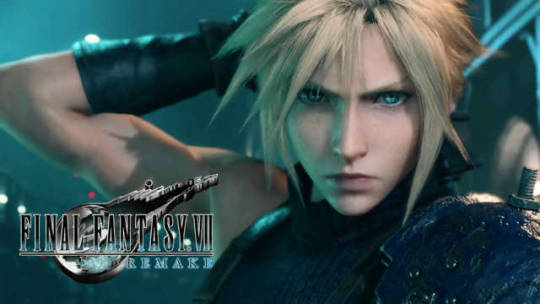
First, my background with this franchise: I played through the original FFVII multiple times; I’ve watched and rewatched Advent Children and Last Order, played Crisis Core, gave up on Dirge of Cerberus despite my deep love for Vincent Valentine (sorry, VV, but your game was just a mess), and lamented that Before Crisis wasn’t available in my country. I even played (and own!) Ehrgeiz, the obscure fighting game that featured the main cast. (Still bitter that they didn’t keep Miki Shinichirou as the voice of Sephiroth. He’s one of my faves.)

^ Ehrgeiz, a mediocre fighting game that forever endeared itself to me by including Turks!Vincent Valentine as a playable character. 💖
In short, I’ve been waiting for this game for DECADES.
So. Here we go. My thoughts on Final Fantasy VII: REMAKE.
The good:
The character models are very pretty. With individual pores, threads and scuffs visible, they’re so detailed that it’s almost impossible to reconcile them with the mouthless sprites from the original game – even more so than Advent Children (and dear goodness, that was over a decade ago now, wasn’t it?). Still, they’ve kept the costume details and absurd proportions largely intact (Barret’s fists are literally larger than Tifa’s entire head, yet somehow it works visually), so it’s not too much of a departure from the familiar.

They’ve kept the aesthetic. I was afraid the game would try to update the iconic world of Midgar, but by and large, it’s full of visually-arresting designs that preserve the gritty-industrial look and feel of the original.
Japanese version is included. BLESS YOU, Square Enix, for including the Japanese voices and character animations. Not only is it impossible for me to hear Cloud in anything other than Sakurai Takahiro’s voice, but the Japanese script is a bit nicer to the characters. I’m not really keen on the English dub… but more on that below.
They fixed the spelling of Aerith’s name. This may seem like a minor point, but considering it’s been 20 years and I’m still bitter that Devil May Cry still hasn’t corrected “Nelo Angelo,” it’s a small victory.
Improved combat. Admittedly, I wasn’t sold on the new combat system at first, but after playing through the game twice, I’ve come to really like it. It has a few rough edges and can get chaotic in some battles, but it does a decent job of blending the feel of an action game with turn-based strategy. The fact that you can switch to a more traditional turn-based system if you prefer is also nice. (I haven’t tried Classic mode yet, though.)
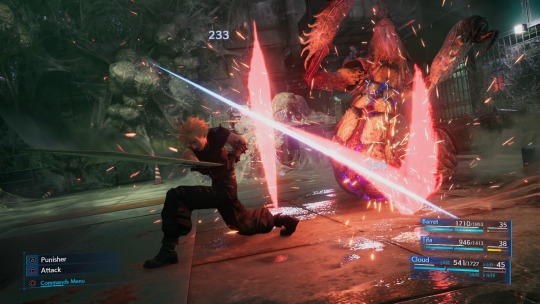
Weapon customization. The Skill Points system allows you to upgrade your loadout instead of acquiring new gear. The tutorial was somewhat lacking (I didn’t quite figure out the multiple-core-unlock thing right away), but I appreciated the ability to add materia slots or stat buffs rather than just cycling through a dozen swords that Cloud apparently keeps in his back pocket.
Background dialogue management. On the whole, the conversations as you run through town enhance the story without slogging down the gameplay; you don’t have to stop and talk to every single resident, because snatches of their conversation reach you (and your on-screen chatlog) as you pass. You can stop and listen for more detail if you want, or you can just keep moving. The extra worldbuilding is really nice.
The music. The orchestrated versions of the original themes are excellent (and some of those music cues gave me goosebumps… Did I spend way too many hours immersed in the original game? Probably). I can take or leave some of the collectible jukebox tunes, but the background music in general is good. (But did I earn that Disc Jockey trophy? Yes, yes I did.)
Supporting character development. Jessie, Biggs and Wedge actually have characters! And personalities! Clichéd ones, admittedly, but it’s an improvement over the original game killing them all off within the first few minutes. The game also does justice to the Turks, and actually surprised me with how much depth of character it gave Reno and Rude in particular (perhaps setting them up for a mini redemption arc so players forgive them for dropping a plate on tens of thousands of slum residents?). Their moments of concern for each other and (brief) crises of conscience made them more than the stock villains they were in the original game, more in line with their temporarily good-aligned characters in Advent Children. Tseng, likewise, was on point. However, I do have to qualify all this with one irate question: Where the heck is Elena?! Seems like the female characters are always getting left out… /sigh/

Improved plot devices. REMAKE cleans up some of the more questionable and outdated content from the original. As you likely already know from the demo, the new game somewhat exonerates the protagonists by having Shinra blow up their own mako reactor to turn public opinion against AVALANCHE (possibly because someone finally realized that it’s hard to sympathize with characters who are willing to melt down an entire reactor and kill a bunch of innocent civilians). AVALANCHE are still eco-terrorists, but they’re… terrorists with a conscience? I dunno, at least they feel bad when people die now… Likewise, the weird and uncomfortable Honey Bee Inn segment of the original game has been reborn as an amazing dance extravaganza. Less voyeurism/prostitution, more Vegas floor show (complete with minigame choreography) and makeover. The whole Don Corneo scenario is still hella creepy, but frankly, there’s nothing that can fix that.

Series references. Fans of the original will appreciate all the inside jokes and direct references to the original game and other franchise entries: One-off comments about Chocobo racing; a broken console in Wall Market that shoots at you; a framed picture of the original 32-bit Seventh Heaven; ads for Banora apple juice; side mentions of characters and plot devices from spinoff games; PHS communication… The game definitely pays tribute to its history. They even recreate the original loading screen and several of Cloud’s iconic poses/animations throughout the game:


The neutral:
Recycled gags. Look, I know Advent Children was the ultimate evolution of FFVII for a while, and admittedly, it did some things very well. The running gag with Rude’s sunglasses and the victory fanfare being used as a ringtone are some of the best moments in the film, in part because they were so unexpected. But as much as I enjoyed the repeated nods to AC in this game, they felt a little desperate, like there were no new jokes to insert so they had to double down on the ones they’d used the last time this franchise had a renaissance. (See Rude’s broken sunglasses, below.) And fitting into the series as a whole, it feels a little weird. Why is Rude’s ringtone the same as the clones’ from Advent Children? Does Barret really need to sing the victory fanfare over and over when he defeats an enemy? Is there supposed to be some history behind that song that was left out of the worldbuilding? It just feels too meta.

Arbitrary localization of names. I don’t really grasp why it was necessary to rename so many items and characters for the English market. Some changes make sense for localization (e.g. Whack-a-Box certainly works better for an American audience than Crash Box), but others seem arbitrary, like changing Aniyan Kunyan to Andrea Rhodea or Mugi to Oates (a play on the meaning of his name in Japanese, but... does it matter?). And then… well, I don’t want to spoil A Major Plot Element, but there’s another thing that changes names from one English word (in the Japanese track) to a different English word. Why? No idea. It doesn’t affect gameplay, and it’s not really a problem, but listening to the Japanese track, I found it jarring to have the subtitles contradict what I was hearing.
Underutilized characters. While the whole gamut of original FFVII characters make appearances, several of them aren’t used to full effect, or aren’t used at all to advance the story. Rufus Shinra’s bossfight is a decent challenge, but while his character was vital to both the original FFVII and Advent Children, his presence in this game is little more than a cameo. His fight could be cut or swapped out with any other boss, and it would have zero effect on the plot. Similarly, while Hojo is a key player in the full story (which this game doesn’t cover, since it’s only a fraction of the original timeline), he’s largely wasted here, except as a means of extending play time by making you wander through corridors and fight a bunch of monsters for “research.” (I have no idea what his motivation is; you’d think he’d be more interested in recapturing Aerith or Cloud, but instead he just... opens an elevator and lets them leave? after they beat up some midbosses.) Reeve Tuesti actually has a solid presence in this game, but since he’s ONLY ever active as himself, there’s no explanation for the random Cait Sith cameo in one scene (players new to the franchise probably have no idea why a random cartoon cat showed up for a few seconds and was never mentioned again). Obviously the plot arcs have to change when the game is covering only a few days’ time in a much longer story, and the major players need to be introduced at some point if they’re going to feature in later games in the series, but from a narrative standpoint, there are an awful lot of superfluous characters doing things for no reason in this installment.
The bad:
THE PADDING. Dear goodness, there is so much padding to make this a standalone game instead of just the first chapter of a longer adventure. I got really, really sick of running literally from one end of the map to the other on side quests – and that’s me, an avowed trophy hunter who spends hours scouring dark corners for collectible items in other games, saying that. So much of this game felt like time fill that didn’t really advance the story. It’s also full of unnecessary new characters with improbable Squeenix hair, like Roche the super-annoying motorcycle SOLDIER (below), or Leslie, Don Corneo’s doorman who somehow merits his own backstory and side quest. (Though in fairness, every FFVII sequel has added superfluous characters, with Crisis Core possibly being the worst offender.) But it just felt really drawn-out and bloated for a game of this generation. If this game had been as compact and tightly-written as the other games I typically play, it probably only would have taken me 15 hours to beat instead of 50. (I don’t actually know how many hours I spent on it the first time through, as I didn’t check the play clock before restarting on Hard difficulty. I do know it took me over 110 hours total to complete the game on both modes, though much of the second run was spent dying repeatedly on a handful of nasty fights. Hard mode removes items and MP replenishment, and if you run out of MP at any point during a chapter, you’re going to die. A lot.)
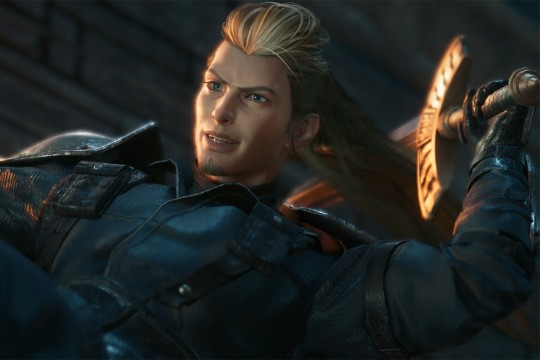
The pacing. Related to the above... the Midgar portion of the original game was just the setup for a larger story. It wasn’t meant to have its own complete dramatic arc so much as to introduce you to the world and the major players. Consequently, there are some really odd beats in this story, as well as a total lack of urgency in your mission. There are no natural places to slot in the side quests and minigames, so they’re shoehorned awkwardly between plot sequences. “Quick, our friend is in mortal peril and needs our help!” "Okay, cool, we’ll go rescue her after we spend ten hours running around town doing random errands for townspeople and playing games with the local kids.” Uh... what?
The graphics just aren’t as good as they should be. While the character models are gorgeous, there are a lot of low-res background textures and weird polygons that don’t quite match up with other components. Most egregious are the Shinra logos, which frequently get close-ups as part of the fixed camera work and, frankly, look like lossy JPEGs. (See image below, screencapped from a PS4 Pro. Those jagged edges on the logo are present throughout the entire game.) There are weird clipping errors and artifacted images and reflective surfaces that don’t reflect, making the game look more like something from the PS3 era than a 4K late-gen PS4 game. (And it’s not that we don’t have the technology: Uncharted 4 was released back in 2016, and the rendering of its vast world was twice as pretty. Devil May Cry 5, released in early 2019, has far more realistic textures and object interaction. Granted, those are different types of games with fewer NPCs to render, but I feel like there’s no excuse for a game this big to look this mediocre.)

The HUD could be better. The lower-corners concept is okay, though it took me a while to train my eyes to travel between both sides of the screen and track the fight action. But for a long time, I didn’t even notice the commands in the upper left corner of the screen, and after playing through the game twice I still have no idea what they say because I couldn’t focus on the tiny text long enough to read them while trying not to die in combat. (I just looked it up; apparently they’re combat control shortcuts? Huh, that would have been useful to know.) It wasn’t until my second time through that I realized there even WERE separate controls on screen during the motorcycle minigames; I had resorted to panicked button mashing to figure it out the first time through because there was no tutorial (you’re just dropped into the action) and, having ignored the small text for the previous hundred combats, I had no reason to look for on-screen instructions there. Not that it would have helped, since on many backgrounds the text in the upper left is really difficult to read (see below). It’s worth noting that I have better than 20/20 vision and played this game on a large TV screen and still had trouble reading some things; on a smaller TV, or for someone with less acute vision (like my sister, who is blind in one eye), I think even the basic menu controls would be difficult to see. While you can resize the font for subtitles, my cursory glance through the menu did not uncover an option to increase the size of the HUD.

Inter-fight menu mechanics. Specifically, the inability to save (or save loadout settings) between fights in a multi-part sequence. There are several back-to-back fights in which it is necessary to switch characters or change gear between bosses. The game treats them as one continuous fight, though it does allows you to access the equipment menu by holding square during key cutscenes. Which is good, if you only have one of a particular materia or accessory that you need to switch between characters, and in most cases when you die the game lets you restart just before your current fight instead of restarting the whole sequence -- also good, since some multi-stage bosses can easily take 20-30 minutes to beat, and if several of those are strung together in sequence, you’re in for a long play session to get past them. But since it’s treated as one fight, you can’t save between bosses (more than once, I had to leave my PS4 running in Rest Mode overnight and just hoped we didn’t have a power glitch), and if you happen to get killed and need to restart the fight, your loadouts reset. Which means if you’re, say, fighting the end boss on Hard difficulty and get killed in the first two minutes -- which happened to me a lot -- by the time you restart the fight, sit through the unskippable cutscene, access the menu and rearrange all the materia and accessories you need, you’re spending five or six minutes gearing up for two minutes of play, and then doing that over and over again every time you die. It gets really old.
The English dub script. *deep breath* Okay, look, I know I can be a bit elitist about translations, but I really do not like the English adaptation of this game. It makes Cloud come across as less socially-awkward and far more of a deliberate jerk, Aerith is mouthy and even swears (which is not accurate to her original character), and it downplays some of the symbolism that’s more obvious in the Japanese script. One quick example: When Aerith gives Cloud a flower, she says (in Japanese), “In the language of flowers, this means ‘reunion.’” It’s subbed/dubbed in English, “Lovers used to give these when they were reunited.” That’s a subtle difference, but since the concept of “reunion” is a freakin’ huge part of the FFVII plot, and since Sephiroth was on screen literally seconds before that line is delivered, my brain automatically went, “OMG REUNION!!!” while I’m guessing people listening in English only picked up on the romantic subtext. It’s a pretty minor thing, and of course translation is always a complex balancing act between literal meaning and local market understanding, but the English version just seemed to me to have a different vibe overall. (Unfortunately, the English subtitles are the same as the dub, so unless you can understand the Japanese audio you’re kind of stuck with that dialogue.)
-
-
[WARNING: SPOILERS BELOW THIS POINT]
-
- …And my #1 complaint about Final Fantasy VII: REMAKE is…
…it’s not actually a remake.
Sure, the game starts out the same way and covers a lot of the same events, but fundamentally, it’s a sequel, not a retelling. It’s evident from Cloud’s future-oriented visions throughout the game that something else is going on, and the ending MAKES NO SENSE if you don’t already know the story. Heck, even the rest of the game doesn’t really make sense if you don’t know the story -- Sephiroth’s presence is never explained; Zack isn’t even introduced, just shows up randomly at the end; Cloud’s flashbacks of Tifa and her dead father in Nibelheim are left as a complete mystery (and since she evidently remembers the burning of her town, judging by her dialogue outside Aerith’s house, why doesn’t she even react when Sephiroth shows up?).
The core elements of the plot – the Feelers (Whispers) preserving a specific fate; the three entities from the future (whose weapon types just happen to correspond to certain named characters) defending their timeline; the return of post-Advent Children Sephiroth (the only time we’ve seen him in human form with one black wing), who has inhabited the Lifestream since his death and promised that he would never truly disappear, who in the end appeals to Cloud directly for an alliance rather than attempting to control him, because he knows now that Cloud is strong enough to defy the Reunion instinct; the change in the outcome of story events in which Biggs (and, unconfirmed as to which timeline he’s actually in, but quite possibly Zack) now survives his intended death -- all point toward Sephiroth trying to manipulate destiny into an alternate outcome in which he is victorious, and using this naive version of Cloud to facilitate it. That means this game is taking place in an alternate or splinter universe, created at some point after the events of the original Final Fantasy VII, and possibly even after the events of Advent Children.
All of that is fine from an overall continuing-story perspective – it opens up a lot of interesting possibilities, like the fact that Aerith might survive now that Cloud has seen prescient flashes of her death (among other events), and there are opportunities for more story twists and changes from what players might expect. But touting this as a remake of the original game has the potential to confuse players who are new to the franchise. FFVII was groundbreaking back in 1997, and it defined JRPGs for an entire generation of Western gamers. But that was more than two decades ago, and a lot of current gamers weren’t even born then, so while they’ve probably heard of the classic game, they aren’t necessarily steeped in its lore. FFVII:R relies heavily on prior knowledge of the series to carry its twist ending, so it largely fails as a standalone game.
Also, speaking as a longtime fan of the franchise… I honestly found the ending rather lackluster. It was a twist, of sorts, but not the sort of shocking, mind-bending revelation that made the first game so iconic. Granted, it’s hard to follow an act like revealing that your protagonist’s entire identity is a lie, not to mention killing off one of your main characters a third of the way into the story! But when the surprise ending is just, Surprise! We’re going to change things up a bit this time around so you aren’t entirely sure what’s coming! Also, here’s a gratuitous Sephiroth fight because everyone expects that, even though it doesn’t serve the main story at all nor resolve any conflicts previously established within this game! it smacks of Different for the sake of Being Different, not for the sake of a really amazing storyline they’re hiding up their sleeve. It’s a bit of a let-down, and I find that I... just... don’t really care that much. Which, for someone who’s been a fan of the series for nearly a quarter of a century, means there’s a Big Freaking Problem somewhere. If you’re not keeping the attention of your die-hard fans, how do you hope to build a fanbase of players new to the franchise?
Given the pacing and story issues inherent in this game, I’m not convinced that the following game(s) in the franchise are going to be structured any better. Considering the amount of pure side-quest padding they did in Midgar, I have no idea how they’ll maintain that same tone on something the scale of the World Map portion of the original game, unless they just completely eliminate things like Fort Condor and the submarine and the spaceship side quests. I have a feeling the Gold Saucer is going to be reduced to a Jessie flashback, a Chocobo race (probably to win a key item), and a battle arena run like the coliseum in Wall Market in this game. If they include all the story elements and side characters from the original, this series is going to be a dozen games long.
Still, on the whole this game was enjoyable, and I’m glad I played it. It wasn’t as good as I’d hoped, but they haven’t completely killed off my interest, so I’ll probably continue with the series whenever the next game comes out. Though I’m not really sure if the higher-priced edition I pre-ordered was worth the extra money, so I may wait and see how the next game is shaping up before deciding which version to get...
But if they don’t give me a really pretty (playable) Vincent Valentine in the next installment, I may riot. I do have priorities.
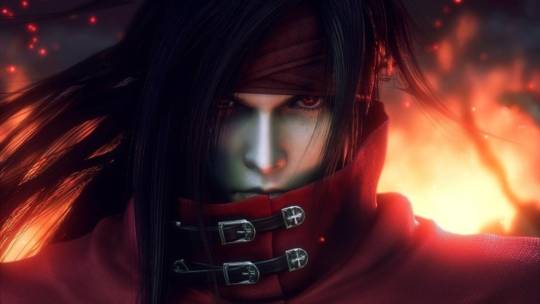
#final fantasy vii#final fantasy vii: remake#ff7:r#final fantasy 7: remake#ff7 remake#video games#long post#review
9 notes
·
View notes
Text
Rewatch meta: Family Values (Potage, Oeuf, & Coquilles)

This is the second of what is intended to be a series of analytical posts based on what sticks out to me as I do a close rewatch of the show, roughly 1-3 episodes at a time. Check my Rewatch meta series tag for more installments.
--
Family is a theme I expect to return to as this series progresses, as the show returns to heavily exploring it again at points in seasons 2 and 3, culminating, of course, with Will’s eventual full acceptance of Hannibal’s assertion that they are family to each other. Episodes 0103-0105 are where this theme is first introduced, and explored in different ways through each of the three episodes (which we’ll depart from to jump headlong into the Abel Gideon arc starting with 0106).
In these three episodes, I see three familial sub-themes, all of which will be revisited and intensified in later seasons.
Folie en famille (or, as Alana says, folie à deux)
"One cannot be delusional if the belief is accepted as ordinary by others in that person's culture or subculture. Or family,” says Hannibal, in counterpoint to Alana’s response to Abigail’s question of whether you can “catch somebody’s crazy.”
Abigail asks this, and Alana essentially says yes, that’s a thing (which immediately raises the specter of Garret Jacob Hobbs for Will, due to his struggles with intrusive thoughts related to the murderers he profiles), but what Hannibal says is a partial rebuttal - it is an essential aspect of his character that he gets to write his own rules, mold his reality into what he wants it to be. It’s hard to make definite statements about the specificity of his intent this early in the show, but even if he’s not actively trying to lay the mental groundwork for the Murder Family dynamic he ends up seeking, his statement here is highly of a piece with that!
Alana’s introduction of the concept of folie à deux here will also be revisited in season 2/early season 3 as applied by her (...and Jack, and Freddie…) to Will and Hannibal.
Found family
“Feeling paternal, Will?”
“Aren’t you?”
“Yes.”
While Will’s penchant for collecting strays has already been discussed in connection to responsibility he feels toward Abigail, this is the first explicit suggestion of the idea that Will and Hannibal might be parents to Abigail together (a different, more complex dynamic than simply caring for a pack of strays). Will is uncomfortable with this idea in season 1 because of his lingering connection to the memory of Garret Jacob Hobbs, then bitter as he gets closer to Hannibal in season 2, as he doesn’t think it’s a possibility anymore. Then in season 3, he’ll have a short time with a “ready-made” family in Molly and Walter that he is comfortable with (before that comfort gets shattered by the Dragon), before finally, fully accepting his familial bond with Hannibal.
The theme of found family in this episode, “Oeuf,” is mirrored with dark irony in the BAU’s current case - the Lost Boys, who are kidnapped and then groomed to murder their families so that they can be a “real family” together. (And when you consider fandom’s favorite moniker for Abigail Lives AUs - “Murder Family” - this irony gets even deeper!) On the one hand we see what looks like the organic formation of a reasonably healthy (if one discounts what we know about Hannibal :P), or at least reasonably positive familial dynamic; on the other, we see kids who have been kidnapped and coerced into traumatically and permanently severing themselves from their former lives.
But it isn’t really an “on the other hand” thing, ultimately - Will + Team Sassy Science discuss the phenomenon of captive bonding in the context of the Lost Boys case, and that will eventually be directly applicable to Abigail’s relationship with Hannibal. Despite her deep instinctive discomfort with the idea of killing - not even necessarily killing people, as demonstrated in the hunting flashback in Potage - we’ll see her acceptance of Hannibal (and leaning in on the morbid humor, because that pleases him) once she knows the truth about him, because what other option does she have?
Love isn’t enough
In “Coquilles,” our killer of the week is the Angel Maker, Elliot Budish, mirroring the underlying cause of marital tension between Jack and Bella: Bella’s emotional withdrawal as a result of her cancer diagnosis (or more precisely, as a result of her decision to hide it from Jack).
“I appreciate that, Jack. I do. But I’m not comforted by it.”
Budish’s wife’s love for him wasn’t enough to prevent her from trying to shelter herself and their children from an increasingly erratic, frightening husband/father, and Jack and Bella’s love for one another can’t cure her cancer, nor can it negate the emotional strain it injects into their relationship (though they are able to be less distant after their confrontation in this episode). Jack needs to feel like a source of comfort and hope to Bella, but as she says, he can’t be, and that’s hurtful to both of them. In later episodes, it is implied that she accepts chemotherapy and a lingering death not because he was able to help her find hope, but because she is pressured by his need to see her “try.”
We’ll see this theme reiterated and intensified with Will and Hannibal’s relationship in the back half of season 2/front half of season 3, then Will’s relationship with Molly in the Red Dragon arc, as their marriage is tainted for both of them by the Dragon’s attack.
#hannibal#hannibal meta#hannibal lecter#will graham#abigail hobbs#jack crawford#bella crawford#alana bloom#molly graham#my meta#rewatch meta series#season 1#potage#oeuf#coquilles
35 notes
·
View notes
Text
Timeless 2x11 Reaction: “The Miracle of Christmas Part 1 and 2″
And thus Timeless is officially over. How did the writers fair with the series finale aka The Timeless movie? Pretty freakin’ fantastic.

Let’s dig in...
It’s been several months between Timeless’ Season 2 finale and their series finale tonight, so the writers wisely include a “Previously on Timeless.” We flashback to all their adventures while Unhappy Future Lucy (who looks a little scary if I’m being honest) narrates. It helps because I seriously forgot her mother is dead. (They kill Susanna Thompson on every damn show!)
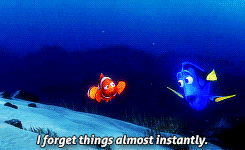
The beginning is a little jarring because storylines I expected to happen in a season or two are all happening RIGHT NOW. My brain needs time to downshift, but I eventually adjust.
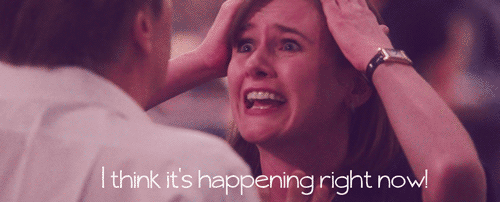
First things first - dealing with the third point in the love triangle, Garcia Flynn. Timeless isn’t interested in drawing out the shipper war because Wyatt and Lucy are kind of a mess. They require some screen time so they are fixed in a realistic manner.
Scary Future Lucy gives Present Day Lucy and Wyatt her diary. Spoiler alert: Lucy hooks up with Flynn. Spoiler alert: They break up sometime down the road because she is really in love with Wyatt. They play out Lucy and Flynn’s entire relationship in under 3 minutes. I’m not joking when I say they breeze through three to four seasons worth of triangle.

I love Goran Visnjic, and while I adore Lucy and Wyatt, I was never opposed to Lucy and Flynn. I mean yeah he’s a murderer. That’s a real negative, but it’s friggin Goran Visnic. Have you seen this guy? He’s so hot. Where Dr. Luca goes so goes my nation.

Kidding aside, the writers convey the depth of Lucy and Flynn’s relationship with just a few lines, which is an impressive writing achievement. I love how Flynn is all “I can’t believe you date me because I tried to kill you a bunch of times.” HAHAHA. Classic. And true! Ah the joy of television romance. But it ain’t gonna be you Flynn, so mosey along big fella.
Jessica is not pregnant. UGH. I HATED THIS STORYLINE SO MUCH.
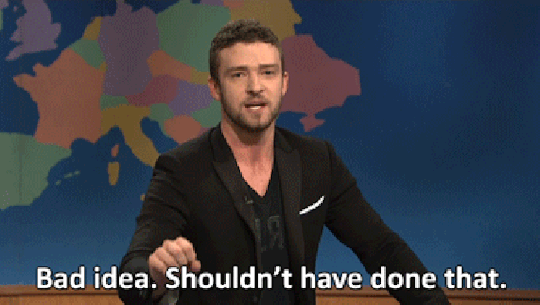
I appreciate the writers giving it a fast and hard death, but this is one of the ways I think Season 2 went wrong. Timeless is a show that defied the typical television tropes and that’s what made it so interesting in Season 1. However, I think their Season 2 renewal, and desire to snare more viewers, created a “throw everything, but the kitchen sink” mentality.
They used every romance trope they could think of in Season 2 to see what would stick. It was just... not good. I don’t blame Timeless anymore than I do any other show that does this (and it’s pretty much all of them). It was just disappointing to see the show move in this direction, when previously they’d been so good at avoiding those kinds of storylines.
Flynn sacrifices himself by going back to 2012 to kill Jessica, so Rufus never dies. REDEMPTION ARC BITCHES!!! YESSSS!!

Seriously, he is so bad ass. Flynn puts a couple bullets in Jessica (plus one extra to be sure) after a ninja knockdown fight. He knows the effects of traveling to his own timeline will kill him... or something. Whatever. It doesn’t matter. Then he watches 2012 Flynn with his beautiful and living family through a window before he dies.

Flynn leaves a goodbye letter for Lucy that pretty much says he loves her, but he knows she loves Wyatt and he wants her to be happy. So yes, GARCIA FLYNN sacrifices himself for Rufus, ensures Lucy and Wyatt find the happy ending they deserve even though he is in love with Lucy, helps stop Rittenhouse and save the world. I AM SO EMO ABOUT MY BOY RIGHT NOW!

As for Lucy and Wyatt, they tiptoe around each other for most of the two hours. Wyatt thinks she ends up with Flynn and Lucy doesn’t want to be second choice. They are the only two who remember the Jessica history. Dear God, can we all forget too? Everyone is pretty much, “Why aren’t y’all together because y’all were together before and it was perfection?” So meta.

Wyatt almost dies in an explosion while delivering a baby during the fall of North Korea. Yes, you read that correctly. WYATT LOGAN IS HERE TO SAVE NATIONS AND DELIVER BABIES!

Lucy realizes she almost lost Wyatt and they are wasting time worrying about the past.

This part of the finale feels really predictable to me. There’s no way they are killing off Wyatt, especially after Flynn dies. Lyatt is endgame, so the two characters dancing around it for so long feels like prolonging the inevitable.
“After that explosion I thought you were dead. And for a moment I saw my whole life without you and my world ended Wyatt.”
But damn though, what a speech Lucy gives him.
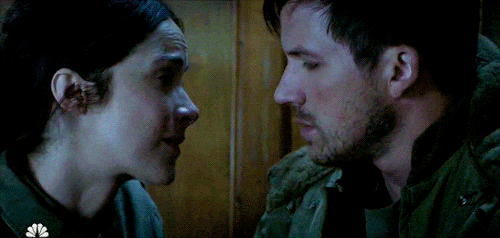
Honestly, it is slightly annoying she did most of the talking because Wyatt is the one who screwed up. At least he offers up a “I wanted to pick you Lucy, but I felt I owed Jessica because she was my baby mama” explanation. Of course, we all knew this.
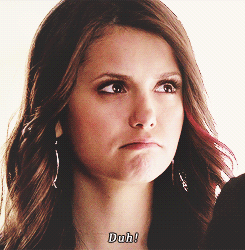
Lucy accepts Wyatt’s “I am a big pine tree” explanation because facts. Things really get cooking with some Lyatt mistletoe kissing.
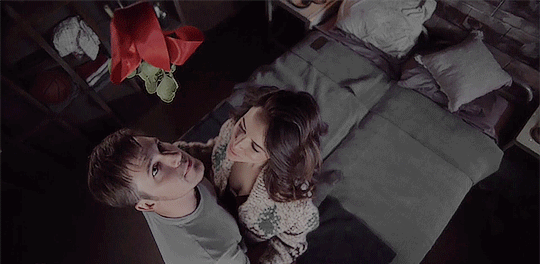
Source: sisterzelda
Ah, a time honored holiday trope I will never grow tired of. Then they have sex

BUT CUT AWAY TOO SOON! Boo NBC!
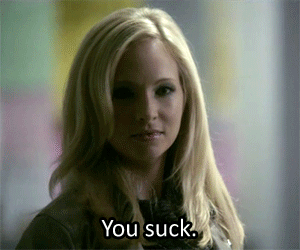
Rufus is alive, but doesn’t remember being dead. Jiya remembers Rufus being dead, but he doesn’t remember Jiya living in Chinatown for three years in the 1800s. I think.

Jiya is concerned she’s no longer the woman Rufus fell in love with (re: see three years of trauma). I argue Rufus fell in love with a bad ass and Jiya is still most certainly one. It is frustrating how quickly they had to go through her physical and emotional trauma from Chinatown. Ugh, this is some seriously important drama that could have been a multiple season deep dive. Stupid cancellation.
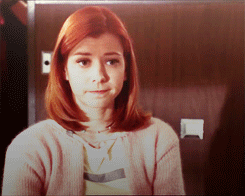
Rufus and Jiya realize they are still perfect for each other, because they are perfect for each other. They start a company together and become billionaires saving the world. Jiya’s hair color is extremely pretty in the final scenes too. I feel this is very important detail to include. I heart them.

Source: katie-mcgraths
Lucy and Wyatt discuss how they don’t want to become scary Lucy and Wyatt from the future and THEY DON’T BECAUSE OF FLYNN. They get married, Wyatt works for Agent Christopher on special projects, and Lucy is a tenured history professor who focuses on important historical women. BECAUSE THERE AIN’T NO TIME FOR THE MEN! That’s right fellas. Drink your tea and wait your turn.
Unfortunately, Lucy is not able to get her sister Amy back. She gives an poignant speech about grief and loss, which could be the show’s mission statement. This is how you write a series finale:
"Everybody loses someone they love. And no matter how badly they want to they can't get them back. In spite of that they find a way to go on. That's everyone's history."
What connects all of time is our humanity. We are born. We live. We love. We suffer grief, pain and loss. We find joy. We endure. This is the thread century after century. In the end, we aren’t so different after all.
THEN LUCY AND WYATT GET MARRIED
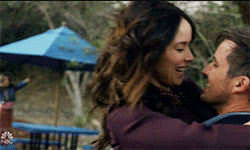
Source: @splitscreen
AND HAVE TWIN GIRLS NAMED FLYNN AND AMY.

Source: @splitscreen
ALERT!!!!!!!!!! MULTIPLES CONCEIVED! IT IS THE DREAM! EVERYTHING IS AMAZING!!!!

The final scene is 2023 Lucy, Wyatt and Rufus traveling to 2014 to tell Garcia Flynn about the time machine. Lucy tells Flynn he doesn’t lose his humanity even though he never gets his family back. He is the hero the team and the world needs in the end. It connects the beginning and end of Timeless so seamlessly. This was probably always going to be the bookend. I just wish we had a few more seasons in between it.
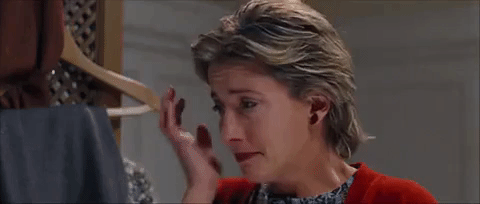
They hint at a future time machine being invented by a young girl Rufus took an interest in at the science fair. The morality of the time machine is debated between Agent Christopher and Connor. She wants to destroy it, but Connor argues they need to keep it so they can stop others from abusing its power. You can’t un-invent something. Someone sooner or later will create the same technology Connor and Rufus did. They have a responsibility to make sure time travel is not abused and another Rittenhouse does not rise. So, the time machine is kept, covered, guarded and waiting.
Do I think we’ll see a resurrected Timeless about this girl and her time machine? No. I don’t. This is the last stop on the Timeless train and, while it was a wonderful ride, it is over. Actors are released from contracts. Writers, producers, crew, etc have all moved on to other gigs. It’s a freaking miracle they even made the movie. (Apropos episode title).
Timeless approached the series finale the correct way, which is what’s important to me. They didn’t leave a bunch of loose ends. The world was saved and I saw all our beloved characters living their happy lives in peace. I need to know these characters are going to be okay, so I can say goodbye.
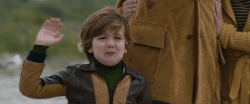
Thank you Timeless for the insightful way you approached history, your cast of wonderful characters, humor and unflinching honesty. I look forward to the streaming deal so I can rewatch again and again.

Source: yasmin-khan
Stray Thoughts
The finale is one EPIC Lucy speech after another. My girl runs this show.

Nobody was dressed appropriately for a North Korea winter.
It looked like the mother threw her newborn into Wyatt’s arms as her son came running to her. LOL Nice catch, soldier.
"I've loved you since the Alamo." Girl is that ever right.
Don't mock. Saint Christopher is for REAL. He has helped me out of many jams.
Hahaha. Wyatt said m'am. That's how you know it's the end.
#timeless#timeless review#timeless series finale#timeless 2x11#the timeless movie#lyatt#lucy preston#wyatt logan#rufus carlin#jiya marri#rufus x jiya
44 notes
·
View notes
Text
Reading Resolution: “Alias Grace” by Margaret Atwood
16. A book you’ve seen adapted: Alias Grace by Margaret Atwood

List Progress: 3/30
So adaptations are a tricky beast. As a child, I wanted film adaptations to be as loyal as humanly possible to the books I loved and I went on many a rant when they were “wrong”. (The Harry Potter Years were trying for my parents.) But as an adult and a writer, I’ve come to appreciate how incredibly difficult it can be to shift a story from one medium to another and how many changes can and should be made to make something fit, and how adaptations can even improve stories through changing what didn’t work in the original.
Or you can just have a voice over deliver huge amounts of text from the book verbatim.
This will be a review of the novel Alias Grace, written in 1996 by Margaret Atwood, not the 2017 mini-series adaptation by Mary Harron and Sarah Polley, but for me the two cannot really be untangled. Not only did I see the mini-series first, and rewatch it many times, but so much of the book text was used verbatim in the show, that the things that had not been adapted were the ones that felt “wrong” to me, like they were extraneous bits. I think the adaptation does a great number of things right and I greatly enjoyed it, but if you are at all interested in the story, I would say it is better to read the book first to save yourself this cognitive disconnect. (Plus a lot of the text works better in prose and feels stilted in dialogue.)
But on to the actual book! Alias Grace is a highly fictionalized telling of the real life case of Grace Marks, a young maid in Canada who was accused of being an accomplice to the murder of her employer and his housekeeper in 1843. It was a sensationalist news story at the time, with plenty of sex, violence, class and gender politics, and multiple contradictory stories from everyone involved. Alias Grace meets Grace fifteen years into her prison sentence as she unwinds the story to the (fictional) Dr. Simon Jordan who wishes to study her supposed amnesia for the time of the murders. It is a great set-up, letting the reader meet Grace at multiple points in her life and providing an outside perspective to judge how her actions and story fit into the rest of the world around her. Unfortunately, none of the rest of this world is nearly as interesting as Grace, which does leave the Dr. Jordan chapters a little lacking.
Margaret Atwood’s prose is very absorbing and rich, though not particularly immersive; it can feel like she is holding the reader at arm’s length, having every character analyze their own thoughts and emotions so much that the reader rarely gets to feel them. But meta thoughts about immersion aside, I’ll be damned if I didn’t enjoy the ride. Atwood’s work always has a way of feeling ever so slightly unsavory at all times, like the whole world is just a little bit more skeevy than our own, and for a story about a young woman caught in a web of violence between several manipulative men, that works really well. Even if you want to take a bath after reading some of it.
Would I Recommend It: Yes.
(Just a few more notes about the show: Wow did the TV show ever give Mr. Kinnear’s character more meat than the book did, even giving a couple of Jeremiah’s moments to him. Developing Kinnear and trimming some of the fat from the ending are two things I think the show absolutely did better. It struggled a lot with the text and no one other than Grace felt fully realized, but it is a very solid adaptation.)
2 notes
·
View notes
Text
Smallville - Action!
Seasons and seasons and SEASONS ago SV established that Lex liked the Warrior Angel comic, the within the show comic book ala Black Freighter complete with analogous characters to Lex and Clark (Clark being the Warrior Angel ofc). A Warrior Angel movie shooting at Clark’s house causes all sorts of murder mayhem and Lex pops open a cabinet like ~Warrior Angel ~u don’t say
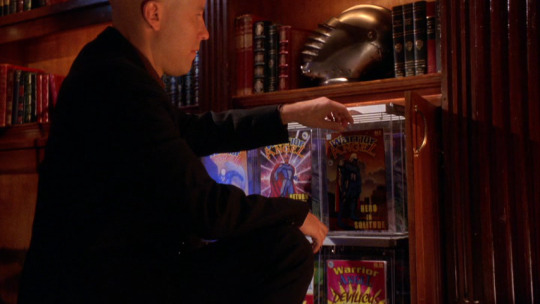
That’s not what’s fascinatingly supermeta though.
Lex has been shown to know arcane Warrior Angel trivia before and he’s said he sympathizes with the villain, the villain that is based on him (in our world, I mean lol). He even voices the common villain mantra of the villain not ~Really Being the Villain. This episode is not about Lex, though. At least he’s not the thematic focus. There’s (always) Clark, but it’s not technically about him either, The Hero Identity narrative is still there of course, but this episode frames that narrative under the Fridged Woman trope and the Love Interest, and while the plot follows Clark, the Warrior Angel movie drama and the analogous characters, it’s all really about Lana Lang.
Now by this time an episode about What Lana Lang Means is kind of redundant, because there have been a billion of those. But again, this episode is very specifically about comics, fandom and archetypes, all of them intersecting in a much more overt way than SV had ever done before.
The bad guy is an honest to God young, white male comic purist, the kind who posts threats online about the sanctity of the material and becomes violent when he feels that sanctity is threatened.
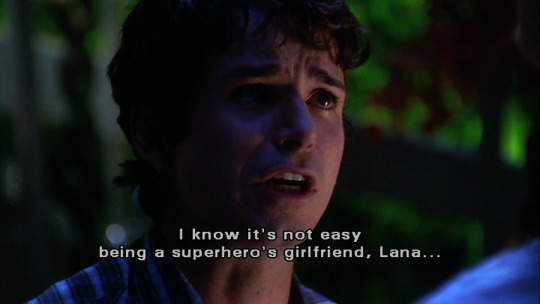
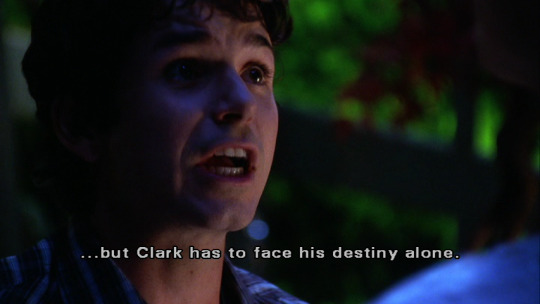
He wants the new movie to stick to traditional canon where Warrior Angel’s love interest dies. In the new movie, the love interest lives and it’s a blot to his existence as a True Fan.
After discovering Clark’s powers and believing him to be the real Warrior Angel, he goes after Lana and spouts the above nonsense. He believes her death would build Clark’s pain and character and he’ll be compelled to save MORE people. To which Lana rightly replies:
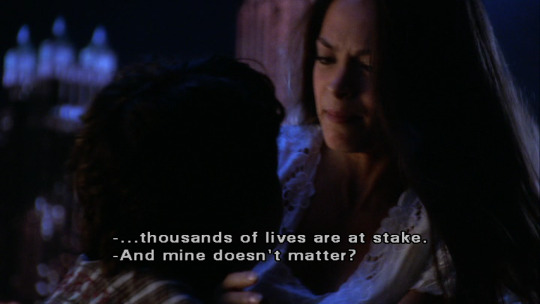
This made me think deeper about my mostly apathetic feelings towards Lana in general and in SV specifically. First bc I came to Superman from Donner/New Adventures. A show with Clark and Lex but without Lois didn’t make sense. A show with explicit proxy characters to Lois, those being Lana and Chloe, didn’t make sense. Second, SV was 100% invested in Clana and I wasn’t here for that angst. I legit stopped watching several times during it’s run bc the Clark/Lana/Lex drama was exhausting and I wasn’t invested in the journey enough to appreciate the nuances when they had it.
And a few rewatches has made me see and appreciate them more, but I still didn’t care about Lana. Yet I think about her A LOT as she exists in SV, and especially how this particular episodes places her at the center of intertextual Superman madness in ways that the show only really went out for with Clark himself, Lex, Lois and the future canon characters.
So here we have Action, and it begins with the literal salvation of the Love Interest from the fake Warrior Angel movie. It’s a
gorgeous
save, one of my favorites in the whole series.
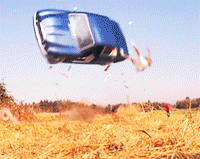

The above psycho fandom business happens, when Lana is about to be sacrificed for literal fanboy manpain. The show clearly stands with Lana, so does the movie within the movie. She is in SV a pivotal part of Clark’s journey to Superman.
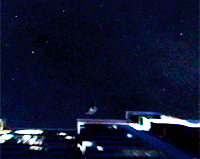
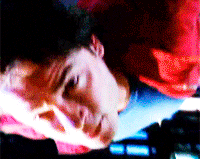
Laying it out like that, the purpose of Lana or any Love Interest would appear to be to serve just the Hero and the construction of his persona, but SV isn’t done. Because this is not the end of Lana’s character and thematic examination in this episode (or this season).
There’s a tongue in cheek hokeyness to this plot line sure. It’s almost too absurd, even by SV standards, but it does another thing while injecting a megadose of Lana meta, it’s a huge bait and switch to the actual Lana Lang plot:
SHE’S BEEN KEEPING LIONEL LUTHOR LOCKED UP ALA MERCY FOR WEEKS, for Clark, WITHOUT TELLING HIM.

SHE DID THAT
Also.
BC THERE’S FUCKING MORE ABOUT THIS EPISODE
These plots come to a head because of Lois, who (unknowingly) set Lex to uncover the conspiracy of Lionel’s “death.” Hers was the first domino to drop in what eventually leads to Clark learning about Lana’s secrets.
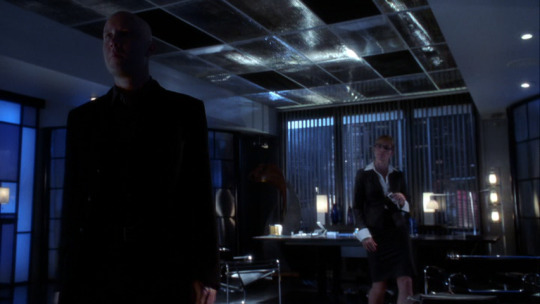
Lex and Lois have had moments before, and they have quite a few more after this, but this moment exists in this episode.
The one called Action.
Where Lois looks very Future Lois.
Where she is having a show down with Lex about exposing his crimes, in his office, Metropolis glittering behind them.
It’s the most Canon they have ever been, and it’s in the most meta. Warrior Angel is based on Superman, so technically Clark, Lex and Lana are all talking about a version of themselves. When Clark saves the actress, when the fake Warrior Angel within the movie saves his love, when Clark then saves Lana, it’s all constant reiteration that Lana will live and her importance transcends whatever canon that came before it.
I’m still not Lana Lang’s biggest fan, but S7 and especially this episode made me chew on her arc as a whole a lot more.
#smallville#lana lang#this has been in my drafts for ages! but this episode one of my faves#mystuff#(another) great sv rewatch
24 notes
·
View notes